




The recent announcement by Mrs. Thatcher of an increase in the Direct Grant and a revision of the income-scales for free-remission' is the first ,practical implementation of the Government's repeated assert,ions of support for the Direct Grant schools, and as such is to be warmly welcomed. While these changes do ' not entail any fina'ncial advantage to the school they will of course bring relief to the Local Authorities who pay the fees of the majority of the boys here, and to the parents who pay for the remainder. Our r.elations with the Local Education Authorities continue to be close and friendly, though the details of future , arrangements with them ate thrown into uncertainty by the impending reorganisation of local government and the slow'but steady "comprehensivisation"of the maintained schools in Worcestershire.

During the past year the Revd. Eric Turnbull, formerly Vicar of St. King's Lynn, has been appointed to the canonry left vacant by Canon Armstrong's retirement, and has therefore also become a Governor of the school. Steps are being taken to enlarg t3 the Governing Body, and the C;:hairman hastaken a welcome initiative by inviting, a small number of parents, staff and OVs to join an advisory c.ommittee to help with planning of new buildings and other developments.
At Christmas we snail say.. goodbye with great regret tc5Mr. T. L. V,ivian and the Bursar. Mr.. Vivian has been Head of the Art Department' since 1957 _,and has been for many developments during this long period; earlier will also remember him as Commanding O,fficer of the Naval Section ,and a skilled Rugger coach., He ,leaves to take up a lectureship at the Worcester College of Education, and will be succeeded by Mr.,A. Kneen, DFA,ATC,DAE. Group-Captain T. A. 'F. Elsdon was appointed the first Bursar of the King's School in 1960. During this time the school has increased in size, a maintenance· staff has been built up, two major appeals have been launched and an' impressive programme of building and improvements carried through. Only those who know what goes on "pehind the scenes" can apprecJate. the extent,and weight of the Bursar's reponsibilities, and it is not surpdsing that El,sdon feels that the time has come for him to move to a less onerous post at St .. Anne's School, Windermere. The school owes a greatdebt of gratitude to him alsoto Elsdon, who for many years has so efficiently organised the "team teas" served in the Pavilion. '
We congratulate Mr. S. R. Davies on his marriage to MissV'ivienne 'Murphy and Mr. and Mrs. P. G. Diamond on the birth of a daughter.
In July 1971 Mr. M. G. East, Head of the Physics Department, who had been on a post-graduate course at Bristol University for the past year, left to become Head of Science at a comprehensive school in Yorkshire, while Mr. N. E. Heath, who had been taking Mr. East's place here for a year, was appointed Head of Physics at Bedales School. Mr.. B,. Walton also left'to join the staff of Rugby School; he had been in charge of Economics here since 1967, and was also House Tutor of School House and a support to many sides of our out-of-schoollife. Mr. T.D.R. Hickson has been appointed Head of ,Physics, and Mr. Heath and Mr. Walton have been replaced respectively. by Mr. D. Chatterjee, Inst. Pm. and Mr. M. Young, M.A. Mr. 'I. W. McKirdy', M.A. Cert. Ed. (P.E.) has also joined the staff to teach Geography and ,P.E. Mr. Hickson's promotion has meant that he can no longer preside over the Careers Department, which has developed so strikingly in recent years that it is now too much, for one master to cope with in addition to a full teaching programme. Mr. Bridges has therefore taken Dver that part of the work dealing with careers guidance, while Mr. M. Young will be responsible for information about Universities and Higher Education in general.
We congratulate S. M. Darlington, T. N. Gazard, A. D. Millington,1. D. Thompson, P. J. L. Rex and C. Stephenson ,on 'their awards atOxford--and Cambridge, and C. R. J. Byard and R. C. Humphry on their Entrance Sch,olarships to Imperial College and St. Bartholomew's Hospital respectively. The Organ Scholarships won by Andrew Millington and Stephen Darlington make a total of six gained by members of the King's School in the past four years. P. Dewison has been awarded an exchange Scholarship by the English-Speaking Union, and is spending a year at The Hill School, Pottstown, U.S.A. before going up to Cambridge in 1972.
We welcomed four girls as recruits to the SGience VI in September. Their arrival - whi.ch caused less of a stir than in some quarters - is not to be taken as the first step towards full several applications have already, been received for next year; but at present it is not intended to accepfmore'than a total of ..about twelve. .:>
Two links with the past have been broken by the deaths of Miss K. M.Rammel.l and Mr. Alex Natan. Miss Rammell, 'sister of the first Housemaster of House, died on 4th June 1971, at the of 94, after a short illness. Her remarkable memory was unimpaired almost to the last, and she never failed to recognise OVs who visited her and to recall their school careers.
Alex Natan will be remembered with gratitude and affection by of OVs who found his teaching in the History VI the most stimulating feature of their time at King's. His health had'been failing since his retirement in 1967, and he died suddenly at his home in London on 14th January 1971.
'Three more young have visited the ,school this year to talk to VI form audiences about their work:- Peter Preece ·(Sc.57-63) who has just returned from Australia, wher.e his research into "arid zone won him a PhD. from the National University of Canberra: HughSoden (Ca. 57-62) who combines a Lecturership in 'Building Technology at the University of M'anchester Institut.e of Technology with work as an engineering consul.tant: and John Vardon (H. 62-67') who is engaged on research in Aeronautical Engineering at Southampton Further offers of talks from OVswill be welcomed.
Many university dons prefer boys not to come straight from school to university, and those of our boys who have had a break of a year (or,nine months in the case of Oxbridge entrants) strongly endorse the value of such ail opportunity to extend their experience, and to "surface" before immersing themselves again in the academic world. It may therefore be of interest to note the way in lllihich some boys who left school in 1970 have occupied themselves before going up to university in October 1971.
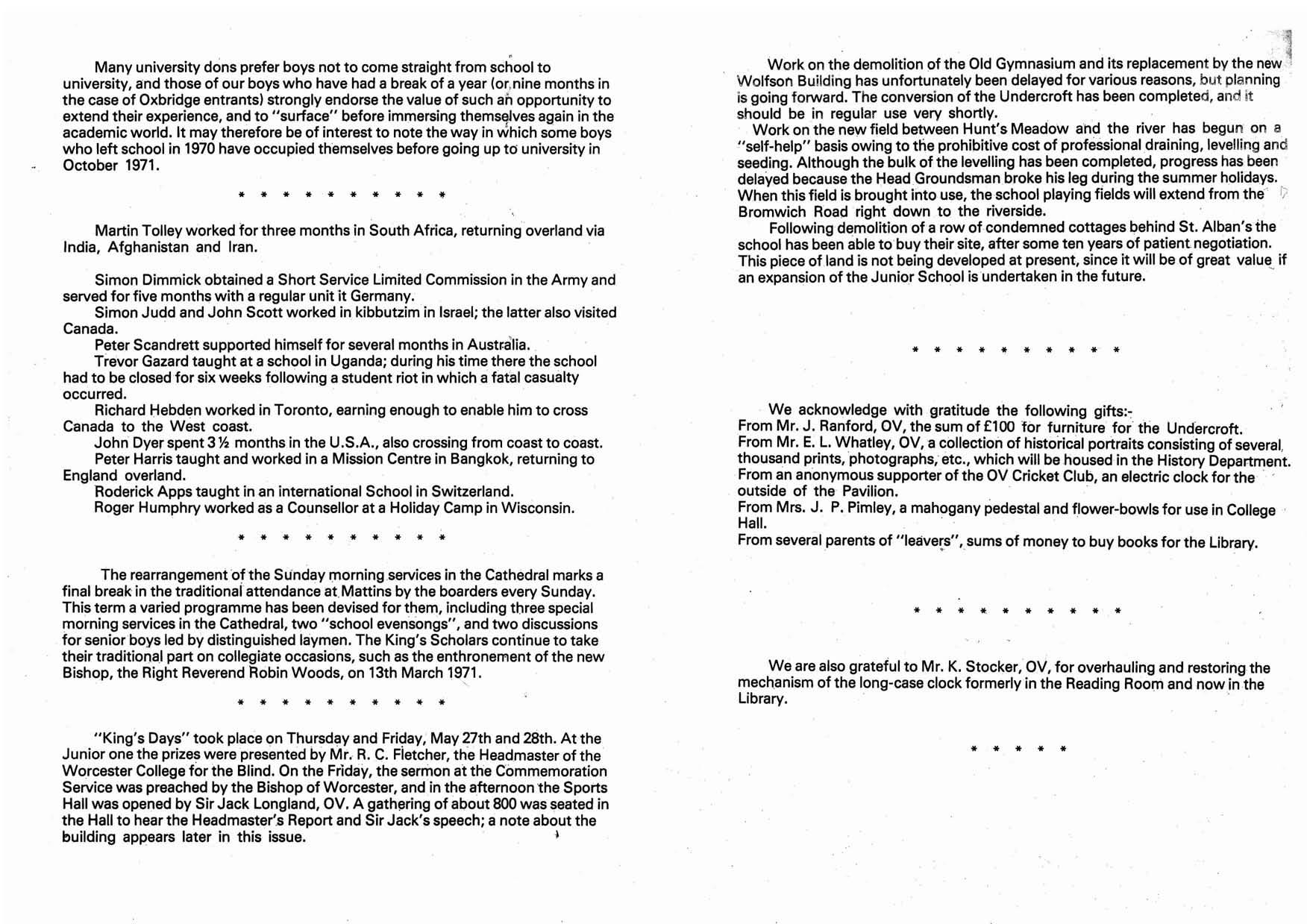
Martin Tolley worked for three months in South Africa, returning overland via India, Afghanistan and Iran.
Simon Dimmick obtained a Short Service Limited Commission in the Army and served for five months with a regular unit it Germany.
Simon Judd and John Scott worked in kibbutzimIn Israel; the latter also visited Canada.
Peter Scandrett supported himself for several months in Austr.alia.
Trevor Gazard taught at a school in Uganda; during his time there the school had to be closed for six weeks following a student riot in which a fatal casualty occurred.
Richard Hebden worked in Toronto, earning enough to enable him to cross Canada to the West coast.
John Dyer spent 3 Y2 months in the U .S.A., also crossing from coast to coast.
Peter Harris taught and worked in a Mission Centre in Bangkok, returning to England overland.
Roderick Apps taught in an international School in Switzerland.
Roger Humphry worked as a Counsellor at a Holiday Camp in Wisconsin.
The rearrangementofthe Sunday morning services in the Cathedral marks a final break in the traditional attendance at Mattins by the boarders every Sunday. This term a varied programme has been devised for them, including three special morning services in the Cathedral, two "school evensongs", andtwo discussions for seniorboys led by distinguished laymen. The King's Scholars continue to take their traditiol)a.1 part on collegiate occasions, such as the enthronement of the new Bishop, the Right Reverend Woods, on 13th March 1971.
Work on the demolition of the Old Gymnasium and its replacement by the new ' Wolfson Building has unfortunately been delayed for various reasons, but planning is going forward. The conversion of the Undercroft has been completed, and it should be in regular use very shortly.
Work on the new field between Hunt's Meadow ahd the river has begun on Cl "self-help" basis owing to the prohibitive cost of professional draining, levelling and seeding. Although the bulk of the levelling has been completed, progress has been delaYed because the Head Groundsman broke his leg during the summer holidays. When this field is brought into use, the school playing fields will extend from thEf fj Bromwich Road right down to the riverside.
Following demolition of a row of condemned cottages behind St. Alban's the school has been able to buy their site, after some ten years of patient negotiation. This piece of land is not being developed at present, since it will be of great value if an expansion ofthe Junior School is undertaken in the future. "
We acknowledge with gratitude the following
From Mr. J. Ranford, OV, the sum of £100 for furniture for the Undercroft.
From Mr. E L. Whatley, OV,a collection of historical portraits consisting of several, thousand pnnts, photographs, etc., which will be housed in the History Department. From an anonymous supporter of the OV Cricket Club, an electric clock for the· , outside of the Pavilion.
From Mrs. J. P. Pimley, a mahogany pedestal and flower-bowls for use in College .. Hall.
From several parents of ,sums of money to buy books for the Library.
"King's Days" took place on Thursday and Friday, May 27th and 28th. At the Junior one the prizes were presented by Mr. R. C. Fietcher,the Headmaster of the Worcester College for the Blind. On the Friday, the sermon at the Commemoration Service was preached by the Bishop of Worcester, andin the afternoon the Sports Hall was opened by Sir Jack Longland, OV. A gathering of about 800 was seated in the Hall to hear the Headmaster',s Report and Sir Jack's speech; a note about the building appears later in this issue.
We are also grateful to Mr. K. Stocker,OV, for overhauling and restoring the mecha nism of the long-case clock formerly in the Reading Room and now in the .
!One Field Day, two "reporters" went out with a tape recorder and talked to people in Worcester, people in shops and launderettes and in the street. They asked them what they knew about the King's School and tried to find out their attitudes to it. The following article is based on what was said to them. It is interesting, but cannot claim to be representative because of the shortage of time taken. can be both a local and a 'national' school, for it has the fairly rare ability, In the?ry, of being part of the local community of the city and county, while at the same time taking pupils from the whole of Britain and abroad. The 'public school' :-ide of our character honours our historical and educational background; our Christian protection from humanist 'propaganda' in the cathedral, and our independence in being some,«hat aloof from the party politics of the state system, while we hope in our position of being a Worcester school to play a significant part in the local community's life and work.
It appears, however, that this internal impression of independent involvement in the community extends no further than Sidbury, for, on the whole, Worcester people know nothing at all about us beyond the fact that we are a boy's school. We must look carefully at the local impressionwe give, for it seems very disturbing that a local opinion of us could run this: "AIl snobs, aren't they? And you can tell one when you see one." If this was purely an isolated opinion it would be of little relevance. However, it seems that the majority of Worcester people feel us to be at least rather separate and 'superior' in our secluded position. Few ordinary local people know' our uniform, and this is not just apathy, for they could recognise those of most of f : the other schools quite easily. Almost nothing is known of the school's activities ! during the past year, no matter in what field of activity. man even thought that \ we were the local comprehensive school, and, generally, comments on the school i.·· were based either on complete ignorance, or on weak or false information: '
By those who did know,something about the school (and these were largely those who had some direct connection with it) we were generally regarded as normal schoolboys in a good school, and as being polite; on the whole, and wellbehaved, though one local shop-keeper pined for the days before the war when "they used to come in and take their caps off, say, "Good afternoon" behave politely, and then put their caps back on again before leaving." ,
On this .evidence, our links with the local Community do not seem strong. Although this may be due to some extent to our physical position, and to the wide geographical dispersion of the homes of a relatively small number, we must try to . surmount this barrier. For we are essentially a Worcester school, and in fulfilling the needs of the whole of a modern society, we must join inand project ourselves in the co.mmunity. Otherwise, withdrawing into our shell, we will not be able to justify our eXistence.
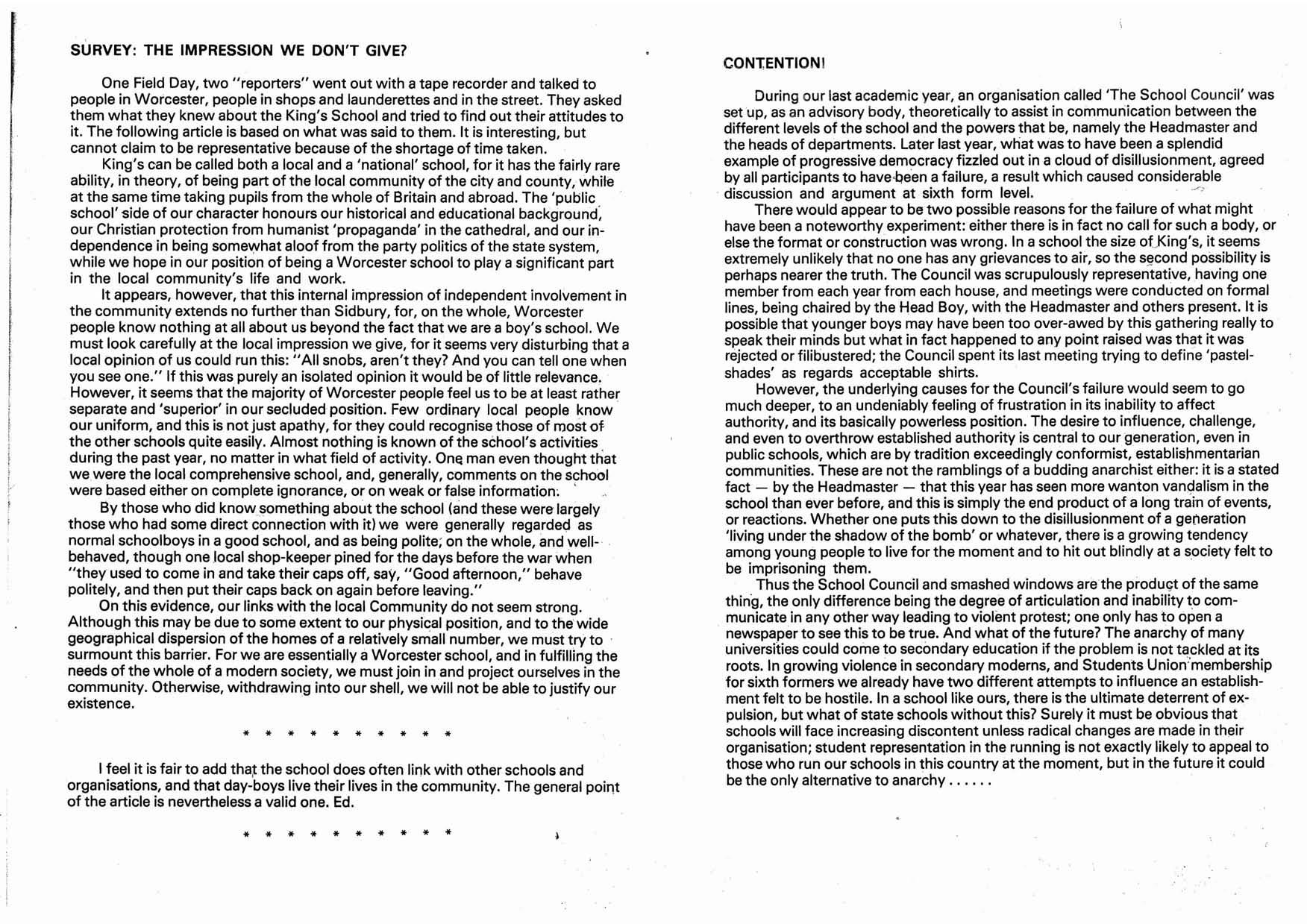
I feel it is fair to add the school does often link with other schools and organisations, and that day-boys live their lives in the community. The general point of the article is nevertheless a valid one. Ed.
During our last academic year, an organisation called 'The School Council' was setup, as an advisory body, theoretically to assist in communication between the different levels of the school and the powers that be, namely the Headmaster and the heads of departments. Later last year, what was to have been a splendid example of progressive democracy fizzled out in a cloud of disillusionment, agreed by all participants to have<Qeen a failure, a result which caused considerable discussion and argument at sixth form level.
There would appear to betwo possible reasons for the failure of what might have been a noteworthy experiment: either there is in fact no call for such a body, or else the format or construction was wrong. In a school the size otKing's, it seems extremely unlikely that no one has any grievances to air, so the possibility is perhaps nearer the truth. The Council was scrupulously representative, having one member from each year from each house, and meetings were conducted on formal lines, being chaired by the Head Boy, with the Headmaster and others present. It is possible that younger boys may have been too over-awed by this gathering really to speak their minds but what in fact happened to any point raised was that it was rejected or filibustered; the Council spent its last meeting trying to define 'pastelshades' as regards acceptable shirts.
However, the underlying causes for the Council's failure would seem to go much deeper, to an undeniably feeling of frustration in its inability to affect authority, and its basically powerless position. The desire to influence, challenge, and even to overthrow established authority is central to our generation, even in public schools, which are by tradition exceedingly conformist, establishmentarian communities. These are not the ramblings of a budding anarchist either: it is a stated fact - by the Headmaster - that this year has seen more wanton vandalism inthe school than ever before, and this is simply the end product of a long train of events, or reactions. Whether one puts this down to the disillusionment of a generation 'living under the shadow of the bomb' or whatever, there is a growing tendency among young people to live for the moment and to hit out blindly at a society felt to be imprisoning them.
Thus the School Council and smashed windows are the prodU<;t of the same thing, the only difference being the degree of articulation and inability to communicate in any other way leading to violent protest; one only has to open a newspaper to see this to be true. And what of the future? The anarchy of many universities could come to secondary education if the problem is not tackled at its roots. In growing violence in secondary moderns, and Students Union:'membership for sixth formers we already have two different attempts to influence an establishment felt to be hostile. In a school like ours, there is the ultimate deterrent of expulsion, but what of state schools without this? Surely it must be obvious that schools will face increasing discontent unless radical changes are made in their organisation; student representation in the running is not exactly likely to appeal to those who run our schools in this country at the moment, but in the future it could be the only alternative to anarchy .
It stretches endlessly before me, "J
Towards the dark

Where am I now?
Before me now stretches a garden
Such as I have never seen before; Well kept lawns, flower beds in neat formation-
And shrubs and trees showing
The skill and artistry of the topiarist; Birds of every shape and size
be leading to the lightl I That suddenly start to move and call.
Its rough stone walls are
Here and there initialled with names of men
Long since dead.
Where are they now?
Who knows?
What fate did they suffer?
I feel them following me up the stairs
With shuffling, dragging footsteps.
I break into a run, but make no progress.
Then suddenly, I'm there,
Once again I feer the old familiar terror
And start to run, anywhere.
The voices follow me, growing and changing.
Mingled in with all the clamour
And shouts and din and noise
I hear a new sound;
The rumble of wheels,
Which make me tremble and quake
As I take shelter behind a giant peacock.
Full of horror and foreboding
Without any warning, --- I see the tumbril approach
At the top and in a gallery.
But no ordinary gallery this;
Ancestors long since dead
Gaze from panelled walls
And as I walk along
Still bathed in a cold sweat of fear,
The eyes of the paintings seem real.
How they burn like hot coals
Piercing me through and through,
Watching and waiting for -
Carrying - no it cannot be
But it is!
My father, my mother, my brother, my sister
Being borne along in this terrible crowd
Waving pitchforks and staves
And yelling, 0 such awful cries,
Liberte, Fraternite, Egalite.
Before I realise it, I am in the tumbril.
Unable to speak, we know where we are going.
She is waiting, surrounded by eager old women Who knows?
Knitting by the blood-stained basket, For me to join them in Heaven
Madame Guillotine! Or in Hell?
Rough hands seize me,
And I shout for help,
But no sound comes
Soon one answers.
Now I see one, in flowing cloak
Of scarlet velvet, red as blood
Reach out to enfold me in some cold embrace
Shuddering, I retreat and am suddenly
Falling, falling, falling -
In a twirling spin.\-
I am forced to my knees
My head on the block, I cry out but who is there to hear?
Surely this is the end.
I hear the swish of cold steel
As it plummets from the heights
But no, I fall on a soft green carpet that, Onto my waiting neck.
All at once, changes
Into grass; short well-cut grass.
S. R. Morris.-
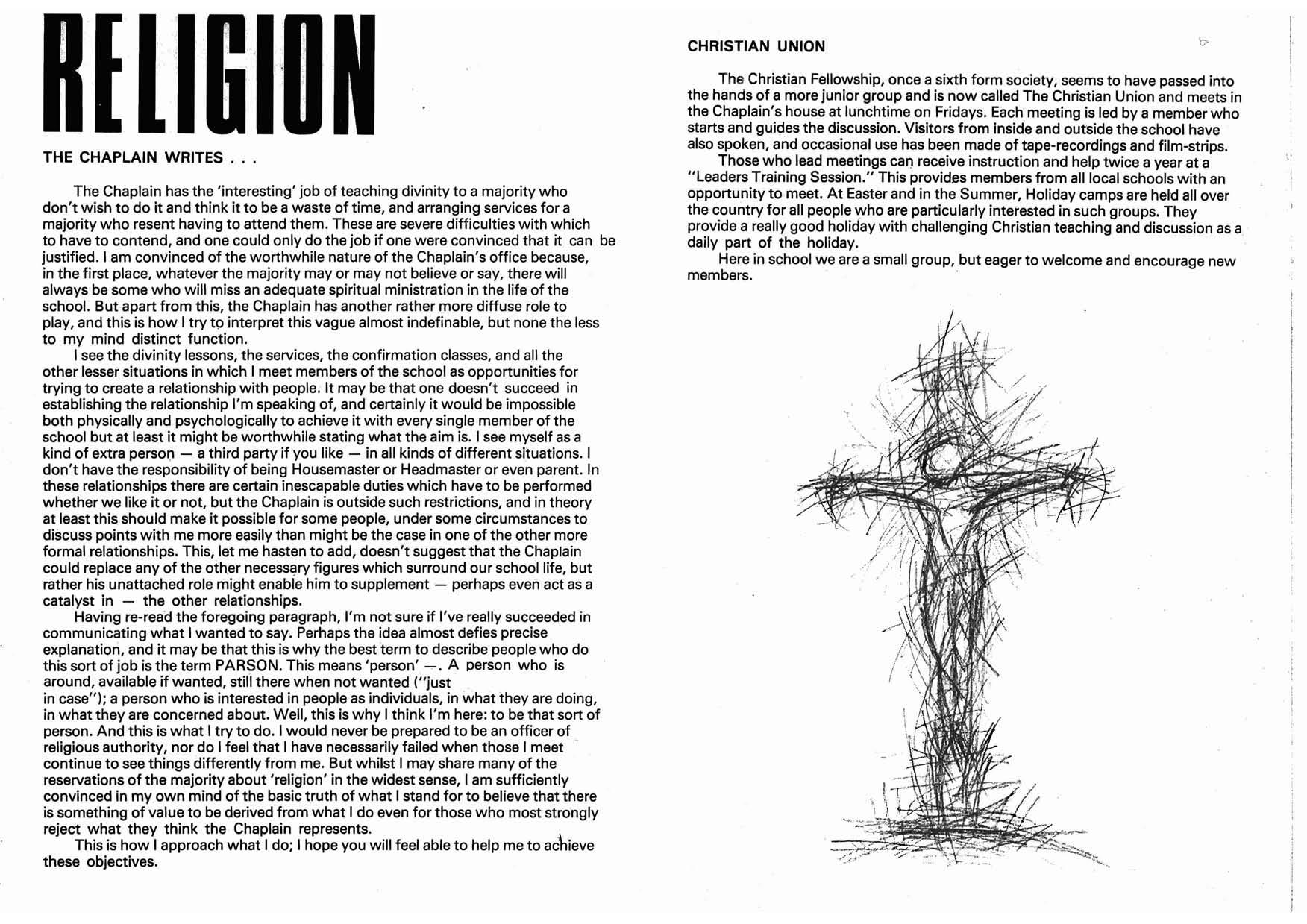
The Chaplain has the 'interesting' job of teaching divinity to a majority who don't wish to do it and think it to be a waste of time, and arranging services for a majority who resent having to attend them. These are severe difficulties with which to have to contend, and one could only do the job if one were convinced that it can be justified. I am convinced of the worthwhile nature of the Chaplain's office because, in the first place, whatever the majority mayor may not believe or say, there will always be some who will miss an adequate spiritual ministration in the life of the school. But apart from this, the Chaplain has another rather more diffuse role to play, and this is how I try to interpret this vague almost indefinable, but none the less to my mind distinct function.
I see the divinity lessons, the services, the confirmation classes, and all the other lesser situations in which I meet members of the school as opportunities for trying to create a relationship with people. It may be that one doesn't succeed in establishing the relationship I'm speaking of, and certainly it would be impossible both physically and psychologically to achieve it with every single member of the school but at least it might be worthwhile stating what the aim is. I see myself as a kind of extra person -a third party if you like - in all kinds of different situations. I don't have the responsibility of being Housemaster or Headmaster or even parent. In these relationships there are certain inescapable duties which have to be performed whether we like it or not, but the Chaplain is outside such restrictions, and in theory at least this should make it possible for some people, under some circumstances to discuss points with me more easily than might be the case in one of the other more formal relationships. This, let me hasten to add, doesn't suggest that the Chaplain could replace any of the other figures which surround our school life, but rather his unattached role might enable him to supplement - perhaps even act as a catalyst in - the other relationships.
Having re-read the foregoing paragraph, I'm not sure if I've really succeeded in communicating what I wanted to say. Perhaps the idea almost defies precise explanation, and it may be that this is why the best term to describe people who do this sort of job is the term PARSON. This means 'person' A person who is around, available if wanted, still there when not wanted ("just , in case"); a person who is interested in people as individuals, in what they are doing, in what they are concerned about. Well, this is why I think I'm here: to be that sort of person. And this is what I try to do. I would never be prepared to be an officer of religious authority, nor do I feel that I have necessarily failed when those I meet continue to see things differently from me. But whilst I may share many of the reservations of the majority about 'religion' in the widest sense, I am sufficiently convinced in my own mind of the basic truth of what I stand for to believe that there is something of value to be derived from what I do even for those who most strongly reject what they think the Chaplain represents.
This is how I approach what I do; I hope you will feel able to help me to acl,ieve these objectives.
The Christian Fellowship, once a sixth form society, seems to have passed into the hands of a more junior group and is now called The Christian Union and meets in the Chaplain's house at lunchtime on Fridays. Each meeting is led by a member who starts and guic:les the discussion. Visitors from inside and outside the school have also spoken, and occasional use has been made of tape-recordings and film-strips.
Those who lead meetings can receive instruction and help twice a year at a "Leaders Training Session." This provides members from all local schools with an opportunity to meet. At Easter and in the Summer, Holiday camps are held all over the country for all people who are particularly interested in such groups. They provide a really good holiday with challenging Christian teaching and discussion as a daily part of the holiday.
Here in school we are a small group, but eager to welcome and encourage new members.
The'school concert in the Summer Term included the first performance of a song cycle by J. H. T. Hooke called liThe Path of Love". Mr. Hooke, a cathedral layclerk, obviously shows some promise in composition and could produce important works in the future as his technique and experience increase. However, this piece lacked these qualities, so that it appeared insecure and amateurish, almost disjointed. The five songs did not possess any binding force or have a common element, but were in varying stylesthat did not inter-relate with each other very successfully. The influences of Vaughan Williamsand Delius were extremely prominent, by no means bad composers to model oneself on, but when they were mixed with Hooke, the result was unsatisfactory and sounded unpleasing. There were places where the combination of old and new worked well, and in certain parts the words were effectively illustrated by the music, but, in general, the total impression was of the lack of professional quality which gives a work instant appeal. Unfortunately the actual performance was not of a sufficiently high standard to forward or promote this appeal. Richard Steele (tenor) sang his part confidently although his voice seemed occasionally lost amongst the professionals in the string quartet (two violins, viola and cello) who appeared to be sight-reading, judging from their blurred and unenthusiastic tonal quality.
The school orchestra had deteriorated since their last concert, perhaps because of the lack of practice or the over-ambitiousness of the programme. The Concerti no for Clarinet and Strings by Tartini had an impressive solo by Stephen Turner, who is obviously an excellent investment for future solo work, but Mussorgsky's 'Great Gate of Kiev' suffered from out of tune playing in the wood-wind section, and not enough watching of the conductor. In the second half, Andrew Millington played the first movement of Beethoven's piano concerto number one extremely well and precIsely, but the orchestra's performance of 'Idylls' by Elgar was rhythmically disorganised; Sibelius 'Karelia Suite' also provided some awkward moments.
However, there were some extremely good solo performances by Adrian Leang (organ) and Richard Granville, Julian Thake and Robin Jequier (piano), in particular these last two. In a school such as this where there should be a high standard of music at all concerts, the orchestral players must practice more so that they are not totally overshadowed by the soloists.

One always looks forWard to Harry Bramma's conce.rt in the summer term, expecting a very professional performance from the visiting orchestra, the guest sol'oists, and of course the school choir, and af,terwards one nevercomes away disappointed. This, once again, was undoubtedly true when the head of the music department Haydn's Creation (Parts 1 and '2) as the music for this year's ' summer concert.,
To sing the solo parts of,Raphael, Uriel and Gabriel he had chosen Alan Fairs, David Minton and Felicity Palmer - the latter already being a soloist of fairly considerable repute whilst Alan Fairs requires no Jntroduction to the school having both a lay clerk and a student economics master here. Mr. Fairs provided some of the most rewarding singing of the evening with his Raphael combining a sternly controlled sombreness in the recitatives with amore boisterous manner becoming evident in such melodious airs as "Rolling in foaming billows". ' ,Felicity Palmer possessed a similar combination in her handling of Gabriel, b'ut her performance was worth commending simply for its clarity alone. Not only could every word be heard, but also the expression which the soloist succeeded in communicating to'her audience was something which one rarely experiences in College Hall. ',,_ 1
Unfortunately the same praise cannot be bestowed upon David Mintoh whose U·ri-el was slightly disappointing. Although he handled the part fairly competently the very considerable ability of his colleagues rather accentuated a slight,'lack of confidence which caused one to feel that his performance was not quite all it might have been. Nevertheless if one considered the stature of his fellow soloists, one must not be too rt)served in rendering praise where a certain amount was un'doubtedly due. '
Mention must of course be made of the school choir, which as always providec the ideal foundation for the whole production. This year over one and fifty people from the school"and also from the Alice Ottley ,and the Girls' Grammar Schools l'T:lanaged to squeeze ·onto the stage, and for one moment it appeared that the assembled body might be too muc·h for even Harry.Bramma to control. I-ndeed, in the first two choruses the effect was similar t<;) that of a great steam engine warming up yet not quite under way, but as soon as the initial stages were completed the choir emerged as one unit and sang superbly. In fact the final piece which , the choir sang ,,, Achieved is the, glorious work" - was quite magnificent, and one looks forward with eager,anticipation to tQe next occasion when the King's School Choral So.ciety under the direction of HWB will be perfqrming V\(ith the assistB'Jilce of gl,Jest soloists and visiting orchestra.
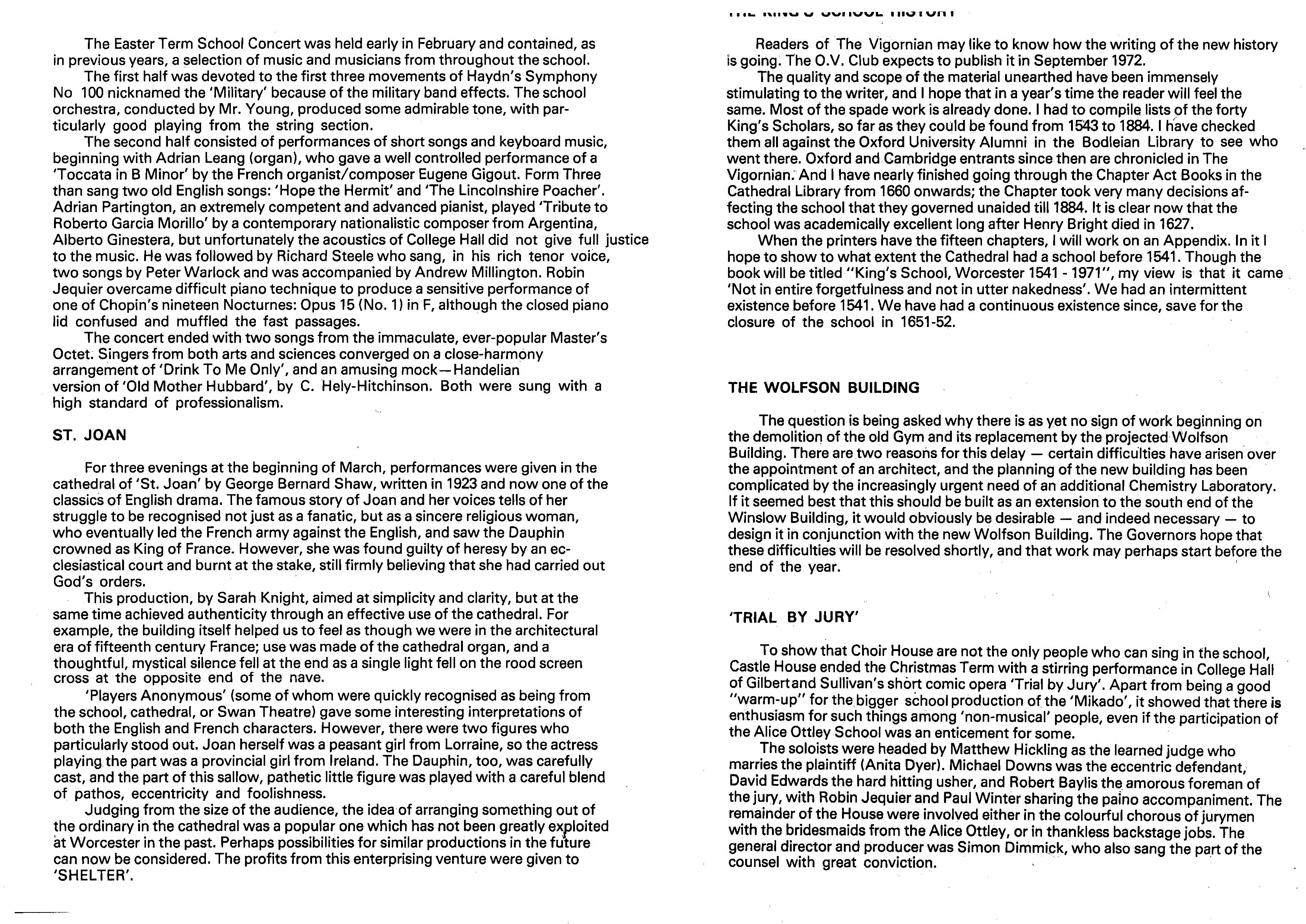
The Easter Term School Concert was held early in February and contained, as in previous years, a selection of music and musicians from throughout the school.
The first half was devoted to the first three movements of Haydn's Symphony No 100 nicknamed the 'Military' because of the military band effects. The school orchestra, conducted by Mr. Young, produced some admirable tone, with particularly good playing from the string section. .
The second half consisted of performances of short songs and keyboard music, beginning with Adrian Leang (organ), who gave a well controlled performance of a 'Toccata in B Minor' by the French organist/composer Eugene Gigout .. Form Three than sang two old English songs: 'Hope the Hermit' and 'The Lincolnshire Poacher'. Adrian Partington, an extremely competent and advanced pianist, played 'Tribute to Roberto Garcia Morillo' by a contemporary nationalistic composer from Argentina, Alberto Ginestera, but unfortunately the acoustics of College Hall did not 'give full justice to the music. Hewas followed by Richard Steele who sang, in his rich tenor voice, two songs by Peter Warlock and was accompanied by Andrew Millington. Robin Jequier overcame difficult piano technique to produce a sensitive performance of one of Chopin's nineteen Nocturnes: Opus 15 (No.1) in F, although the closed piano lid confused and muffled the fast passages.
The concert ended with· two songs from the immaculate, ever-popular Master's Singers from both arts and sciences converged on aclose-harmpny arrangement of 'Drink To Me Only', and an amusing mock-Handelian version of 'Old Mother Hubbard', by C. ·Hely-Hitchinson. Both were sung with a high standard of professionalism.
For three evenings at the beginning of March, performances were given in the cathedral of 'St. Joan' by George Bernard Shaw, written in 1923 and now one of the classics of English drama. The famous story of Joan and her voices tells of her struggle to be recognised not just as a fanatic, but as a sincere religious woman, who eventually led the French army against the English, and saw the Dauphin crowned as King of France. However, she was found guilty of heresy by an ecclesiastical court and burnt at the stake, still firmly believing that she had. carried out God's orders. '
This production, by Sarah ·Knight, aimed at simplicity and clarity, but at the same time achieved authenticity through an effective use of the cathedral. For example, the building itself helped us to feel as though we were in the architectural era of fifteenth century France; use was made of the cathedral organ, and a thoughtful, mystical silence fell at the. end as a single light fell on the rood screen cross at the opposite end of the nave.
'Players Anonymous' (some of whom were quickly recognised as being from the school, cathedral, or Swan Theatre) gave some interesting interpretations of both the English and French characters. However, there were two figures who particularly stood out. Joan herself was a peasant girl from Lorraine, so the actress playing the part was a'provincial girl from Ireland. The Dauphin, too, was carefully cast, and the part of this sallow, pathetic little figure was played with a careful blend of pathos, eccentricity and foolishness.
Judging from the size of the audience, the idea'of arranging something out of the ordinary in the cathedral was a popular one which has not been greatly exploited at Worcester in the past. Perhaps possibilities for similar productions in the future can now be considered. The profits from this enterprising venture were given to 'SHELTER'.
Readers of 'The Vig'ornian may like to know how writing of the new history is The D.V. Club expects to publish it in September 1972.
The quality and scope of the material unearthed have been immensely stimulating to the writer, and I hope that in a year's time the reader will feel the same. Most of the spade work is already done. I had to compile lists 9f the forty King's Scholars, so far as they could be found from 1543 to 1884. I hfave checked them all aga'inst the Oxford University Alumni in the Bodleian Library to see who went there. Oxford and.Cambridge entrants since then are chronicled in The Vigornian.'··And I have nearly finished going through the Chapter Act Books in the Cathedral Library from 1660 onwards; the Chapter took very many decisions affecting the school that they governed unaided till 1884. Itis clear now that the school was academically excellent long after Henry Bright died in 1627.
When the printers have the fifteen chapters, I will work on an Appendix. In it I hope to show to what extent the Cathedral had a school before 1541. Though the book will be titled liKing's School, Worcester 1541 -1971", my view is that it came. 'Not in entire forgetfulness and not in utter nakedness'. We had an intermittent existence before 1541. We have had a continuous existence since, save for the closure of the school in 1651-52.
The question is being asked why there is as yet no sign of work on the demolition of the old Gym and its replacement by the projected·Wolfson Building. There are .two reasons for this delay - certain difficu'lties have arisen over the appointment of an architect, and the planning of the new building has been complicated by the increasingly urgent need of an additional Chemistry Laboratory. If it seemed best that this should be built as an extension to the south end of the Winslow Building, it would obviously be desirable - and indeed necessary - to design it in conjunction with the new Wolfson Building. The Governors hope that these difficulties will be resolved shortly, and that work may perhaps start before the end of the year.
To show that Choir House are not the only people who can sing in the school, Castle House ended the Christmas Term with a stirring performance in College Hall of Gilbertand Sullivan's comic opera 'Trial by Jury'. Apart from being a good "warm-up" for the bigger school production of. the 'Mikado', it showed that there is enthusiasm for such things among 'non-musical' people, even if the participation of the Alice OttleySchool was an enticement for some. .
The soloists were headed by Matthew Hickling as the learned judge who marries the plaintiff (Anita Dyer). Michael Downs was the eccentric defen'dant,' David Edwards the hard hitting usher, and Robert Baylis the. amorous foreman of the jury, with Robin Jequier and Paul Winter sharing the pafno accompaniment. The remainder of the House were involved either in the colourful chorous of 'jurymen with the bridesmaids from theAlice Ottley, or in thankless backstage jobs. The general director and producer was Simon Dimmi,c::k, who also sang the part of the counsel with great conviction. ' ' .
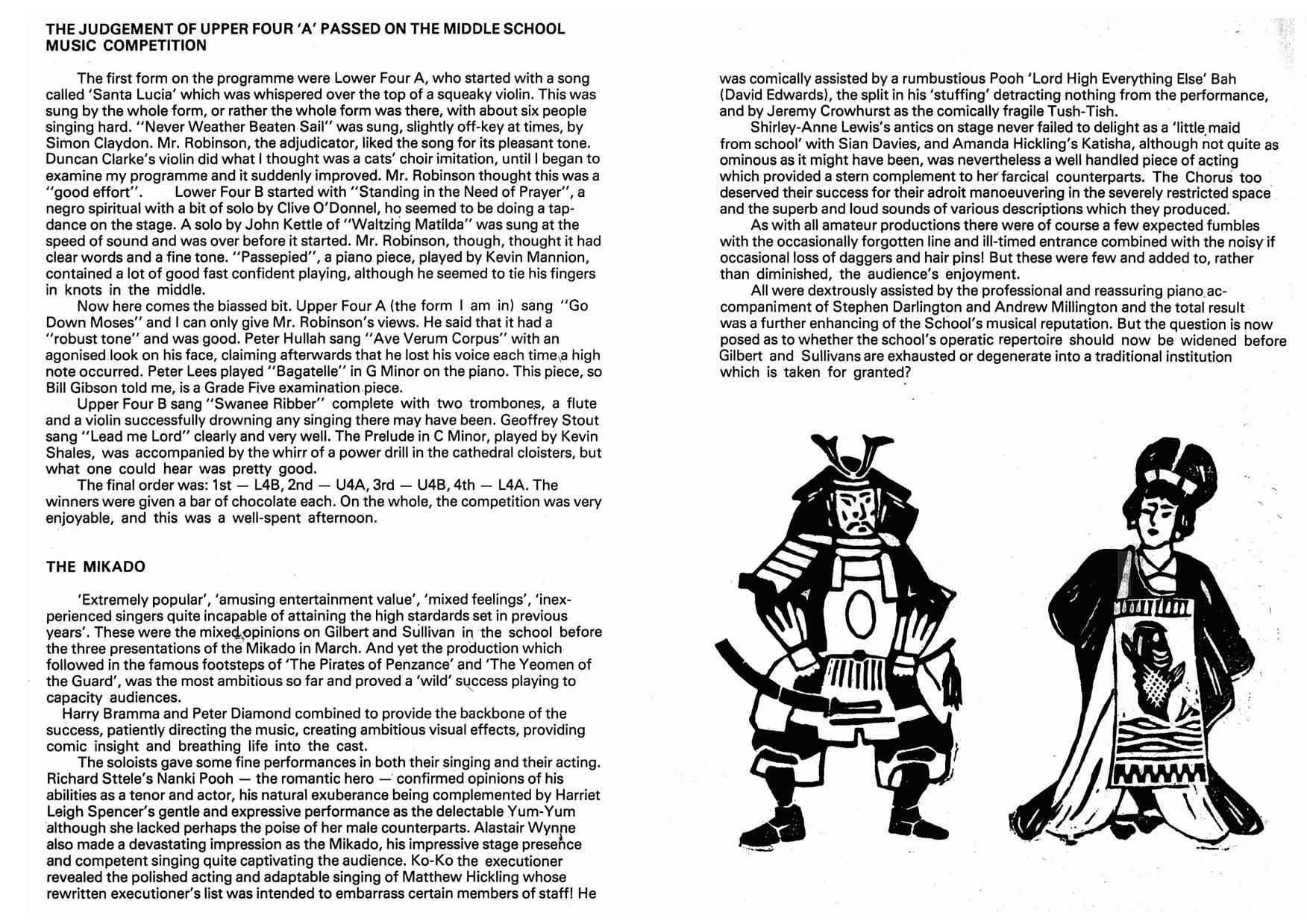
The first form on the programme were Lower Four A, who started with a song called 'Santa Lucia' which was whispered over the top of a squeaky violin. This was sung by the whole form, or rather the whole form was there, with about six people singing hard. "Never Weather Beaten Sail" was sung, slightly off-key at times, by Simon Claydon. Mr. Robinson, the adjudicator, liked the song for its pleasant tone. Duncan Clarke's violin did what I thought was a cats' choir imitation, until I began to examine my programme and it suddenly-improved. Mr. Robinson thought this was a "good effort". Lower Four B started with "Standing in the Need of Prayer", a negro spiritual with a bit of solo by Clive O'Donnel, ho seemed to be doing a tapdance on the stage. A solo by John Kettle of "Waltzing Matilda" was sung at the speed of sound and was over before it started. Mr. Robinson, though, thought it had clear words and a fine tone. "Passepied", a piano piece, played by Kevin Mannion, contained a lot of good fast confident playing, although he seemed to tie his fingers in knots in the middle.
Now here comes the biassed bit. Upper Four A (the form I am in) sang "Go Down Moses" and I can only give Mr. Robinson's views. He said that it had a "robust tone" and was good. Peter Hullah sang" Ave Verum Corpus" with an agonised.look on his face, claiming afterwards that he lost his voice each time\a high note occurred. Peter Lees played "Bagatelle" in G Minor on the piano. This piece, so Bill Gibson told me, is a Grade Five examination.piece.
Upper Four B sang "Swanee Ribber" complete with two trombone,s, a flute and a violin successfully drowning any singing there may have been. Geoffrey Stout sang "Lead me Lord" clearly and very well. The Prelude in C Minor, played by Kevin Shales, was accompanied by the whirr of a power drill in the cathedral cloisters, but what one could hear was pretty good.
The final order was: 1st - L4B,2nd - U4A,3rd - U4B,4th - L4A. The winners were given a bar of chocolate each. On the whole, the competition was very enjoyable, and this was a well-spent afternoon.
'Extremely popular', 'amusing entertainment value', 'mixed feelings', 'inexperienced singers quite incapable of attaining the high stardards set in previous years'. These were the mixeq.ppinions on Gilbert and Sullivan in the school before the three presentations of thE:l" Mikado in March. And yet the production which followed in the famous footsteps of 'The Pirates of Penzance' and 'The Yeomen of the Guard', was the most ambitious so far and proved a 'wild' playing to capacity audiences.
Harry Bramma and Peter Diamond combined to provide the backbone of the success, patiently directing the music, creating ambitious visual effects, providing comic insight and breathing life into the cast.
The soloists gave some fine performances in both their singing and their acting. Richard Sttele's Nanki Pooh - the romantic hero - confirmed opinions of his abilities as a tenor and actor, his natural exuberance being complemented by Harriet Leigh Spencer's gentle and expressive performance as the delectable Yum- Yum although she lacked perhaps the poise of her male counterparts. Alastair Wynne also made a devastating impression as the Mikado, his impressive stage and competent singing quite captivating the audience. Ko-Ko the executioner revealed the polished acting and adaptable singing of Matthew Hickling whose rewritten executioner's list was intended to embarrass certain members of staffl He
was comically assisted by a rumbustious Pooh 'Lord High Everything Else' Bah (David Edwards), the split in his 'stuffing' detracting nothing from the performance, and by Jeremy Crowhurst as the comically fragile Tush- Tish.
Shirley-Anne Lewis's antics on stage never failed to delight as a 'little. maid from school' with Sian Davies, and Amanda Hickling's Katisha, although not quite as ominous as it might have been, was nevertheless a well handled piece of acting which provided a stern complement to her farcical counterparts. The Chorus too deserved their success for their adroit manoeuvering in the severely restricted space' and the superb and loud sounds of various descriptions which they produced.
As with all amateur productions there were of course a few expected fumbles with the occasionally forgotten line and ill-timed entrance combined with the noisy if occasional loss of daggers and hair pinsl But these were few and added to, rather than diminished, the audience's enjoyment.
All were dextrously assisted by the professional and reassuringpiano,accompaniment of Stephen Darlington and Andrew Millington and the total result was a further enhancing of the School's musical reputation. But the question is now posed as to whether the school's operatic repertoire should now be widened before Gilbert and Sullivans are exhausted or degenerate into a traditional institution which is taken for granted?
During the Summer Term a joint production of Sophocles' and Jean Anouilh's versions of the Antigone legend was given on the Guesten Hall Lawn. Those taking part were:
Creon
Antigone
Haemon
Ismene Teiresias
Nurse' Eurydice
Sentry
Jonas
Messenger 1st Guard
2nd Guard
Boy
Men's Chorus leader
Girls Chorus leader.
Piper
Director
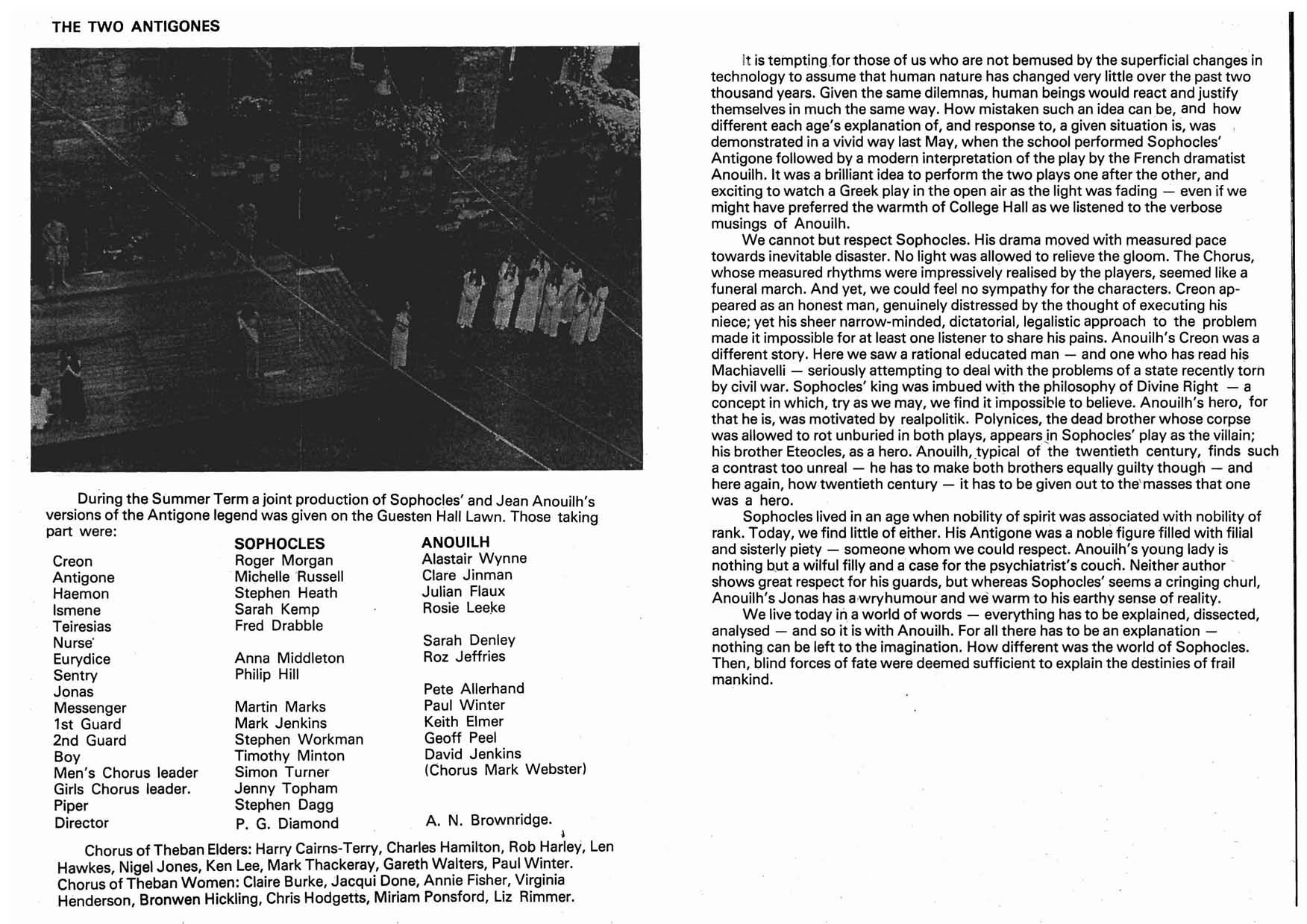
Roger Morgan
MichelleRussell
Step hen Heath
Sarah Kemp
Fred Drabble
Anna Middleton
Philip Hill
Martin Marks
Mark Jenkins
Stephen Workman
Timothy Minton
Simon Turner
Jenny Topham
Stephen Dagg
P. G. Diamond
Alastair Wynne
Clare Jinman
Julian Flaux
Rosie Lee.ke
Sarah Denley
Roz Jeffries
Pete Allerhand
Paul Winter
Keith Elmer
Geoff Peel
David Jenkins
(Chorus Mark Websterl
It is teinptingfor those of us who are not bemused by the superficial changes in technology to assume that human nature has changed very little over the past two thousand years. Given the same dilemnas, human beings would react and justify themselves in much the same way. How mistaken such an idea can be, and how different each age's explanation of, and response to, a given situation is, was demonstrated in a vivid way last May, when the school performed Sophocles' Antigone followed by a modern interpretation of the play by the French dramatist Anouilh. It wasa brilliant idea to perform the two plays one after the other, and exciting to watch a Greek play in the open air as the light was fading - even if we might have preferred the warmth of College Hall as we listened to the verbose musings of Anouilh.
We cannot but respect Sophocles. His drama moved with measured pace towards inevitable disaster. No light was allowed to relieve the gloom. The Chorus, whose measured rhythms were impressively realised by the players, seemed like a funeral march. And yet, we could feel no sympathy for the characters. Creon appeared as an honest man, genuinely distressed by the thought of executing his niece; yet his sheer narrow-minded, dictatorial, legalistic approach to the problem made it impossible for at least one listener to share his pains. Anouilh's Creon was a different story. Here we saw a rational educated man - and one who has read his Machiavelli - seriously attempting to deal with the problems of a state recently torn by civil war. Sophocles' king was imbued with the philosophy of Divine Right -a concept in which, try as we may, we find it impossil-Ie to believe. Anouilh's hero, for that he is, was motivated by realpolitik. Polynices, the dead brother whose corpse was allowed to rot unburied in both plays, appearsJn Sophocles' play as the villain; his brother Eteocles, as a hero. Anouilh,.typical of the twentieth century, finds such a contrast too unreal - he has to make both brothers equally guilty though - and here again, howtwentieth century - it has to be given out to the'masses that one was a hero.
Sophocles lived in an age when nobility of spirit was associated with nobility of rank. Today, we find little of either. His Antigone was a noble figure filled with filial and sisterly piety - someone whom we could respect. Anouilh's young lady is nothing b.ut a wilful filly and a case for the psychiatrist's coucli. Neither author' shows great respect for his guards, but whereas Sophocles' seems a cringing churl, Anouilh's Jonas has awryhumourand we warm to his earthy sense of reality.
We live today in. a world of words - everything has tobe explained, dissected, analysed - and so it is with Anouilh. For all there has to be an explanationnothing can be left to the imagination. How different was the world of Sophocles. Then, blind forces of fate were deemed sufficient to explain the destinies of frail mankind.
A. N. Brownridge.
Despite the claims of 'East-West' friendly relations the 'Cold War' is still with us. Those of the Army Section who attended the annual camp this year at Hameln in Germany, were witnesses to this fact. Ostensibly a peaceful town with beautiful old buildings set in the heart of the country surrounded by rolling hills and woods, Hameln in fact is the 'kingpin' of the B.A.O.R. defensive layout. Thirty miles west of Hameln is a peaceful pastoral valley known as the 'sckessa gap'. This is the one route by which the Russian tanks can enter West Germany. Behind this gap is Hameln, adopted home of the 35 Engineer Regt, the largest regiment in the British Army in Germany. To this regiment in time of war, is entrusted the task of blocking this gap by mining the approaches and destroying roads and bridges. Both roads and bridges have chambers ready built into them to hold the necessary explosives in order to make their destruction easier.
Hidden on the hills to the North and South of Hameln are camouflaged and fortified positions holding anti-aircraft missiles. There are many other bases like these in Germany; a chain of them stretch back to the Dutch border and every prominent hill within thirty miles of the East-West Frontier has one of these bases upon it. One of the bases near Hameln is operated by the German Air Force and the other by. the Royal Netherlands Air Force.
Fighter and reconnaissance patrols constantly pass overhead and patrol up and down the frontier. Army convoyS rumble through the streets at midnight. Yet despite all this apparent preparation for war by the army, the rest of Germany is quiet. Western Germany is not an armed camp,for all its military activities are geared towards defence and not for positive expeditions the other side of the 'Iron Curtain'.
Hameln itself is a beautiful town with many lovely old buildings, 15th and 16th century and even earlier. In the old quarter there are many winding alleys in which the houses nearly touch over one's head. Much is made, especially by the tourist trade, of the legend of the Pied Piper of Hameln and, in fact, during the tourist season, there is a reconstruction of these famous happenings in the centre of the town every Sunday.
We stayed with 35 Engineer Regi,ment and took part in their multifarious activities. We drove their trucks, armoured personnel carriers and assorted items of engineering equipment. Whilst driving the armoured personnel carriers we saw units of the German Army training with their tanks. We built bridges, piloted launches, shot on their ranges, learnt how to operate mine-detectors and how to use explosives. This new-found knowledge we put to good use by blowi,ng up treestumps, rocks, slabs of concrete and a Centurion Tank. Another cadet unit there at the same time as us totally destroyed a civilian car, byaccident;l(IIhilst using explosives. We were shown over an Army reconnaissance helicopter (Sioux) which was visiting the camp. Our last day the regiment put on a display with its amphibious bridging vehicles (American made and called the M2B(. Each of these vehicles was extremely valuable and an entire bridge of eight or nine units was worth £1 m.
Not all our activities however were military. We went swimming and on trips to Hannover and the Harz Mountains. Each evening was free and we could visit Cafes in town, the N.A.A.F.I., numerous clubs in camp or a Cinema. A very enjoyable time was had by all and we give our thanks to Messrs. Stacey, Brown and Tomes for their invaluable supervision.
Last year saw a promising increase in numbers for our training activities which included new initiative exercises and shooting. Field Days were devoted to map reading exercises and a visit to R.A.F. Filton for Chipmunk flying with cadets doing aef:pbatics and being allowed to take over the controls. This year's camp was at R.AF. Marham, a Strike Command Station, wbich coincided with the American visi1?for the R.A.F. - U.S.A.F. bombing competition. The varied programme included .303 shooting, visiting the Victor Simulator, a demonstration of refuelling. methods including air to air techniques and visits to Victor aircraft and the American B.32 which can carry a nuclear bomb load equivalent in T.N.T. to all the bombs ' dropped in World War 11 -a sobering thought.
An enjoyable afternoon was also spent at Mildenhall N.A.T.O. base where the American F.100, the world's largest aircraft, the C.S. Galaxy, and the C.130 Herc"ules Transport Aircraft were seen.
Our most strenuous day contained a field exercise and assault course during which several cadets got rather wet, all followed by a night exercise. Altogether it was a most profitable and thoroughly enjoyable camp.

R.A.F. SECTION: GERMANCAi'JlP At Easter 1970, Mr. Aldridge and four of the section went to R.A.F. Wilderwath in Germany foran interesting, if strenuous, camp. The training programme included initiative exercises such as bridge building, raft construction and map reading in the Eiffel district. This was followed by a trip down the Rhine and a visit to the Evolvon exhibition at Eindhovel\ in Holland which traces man's evolution and development. All of the group ,enjoyed themselves and would like to thank both Mr. Aldridge and the R.A.F. for organising it so well.
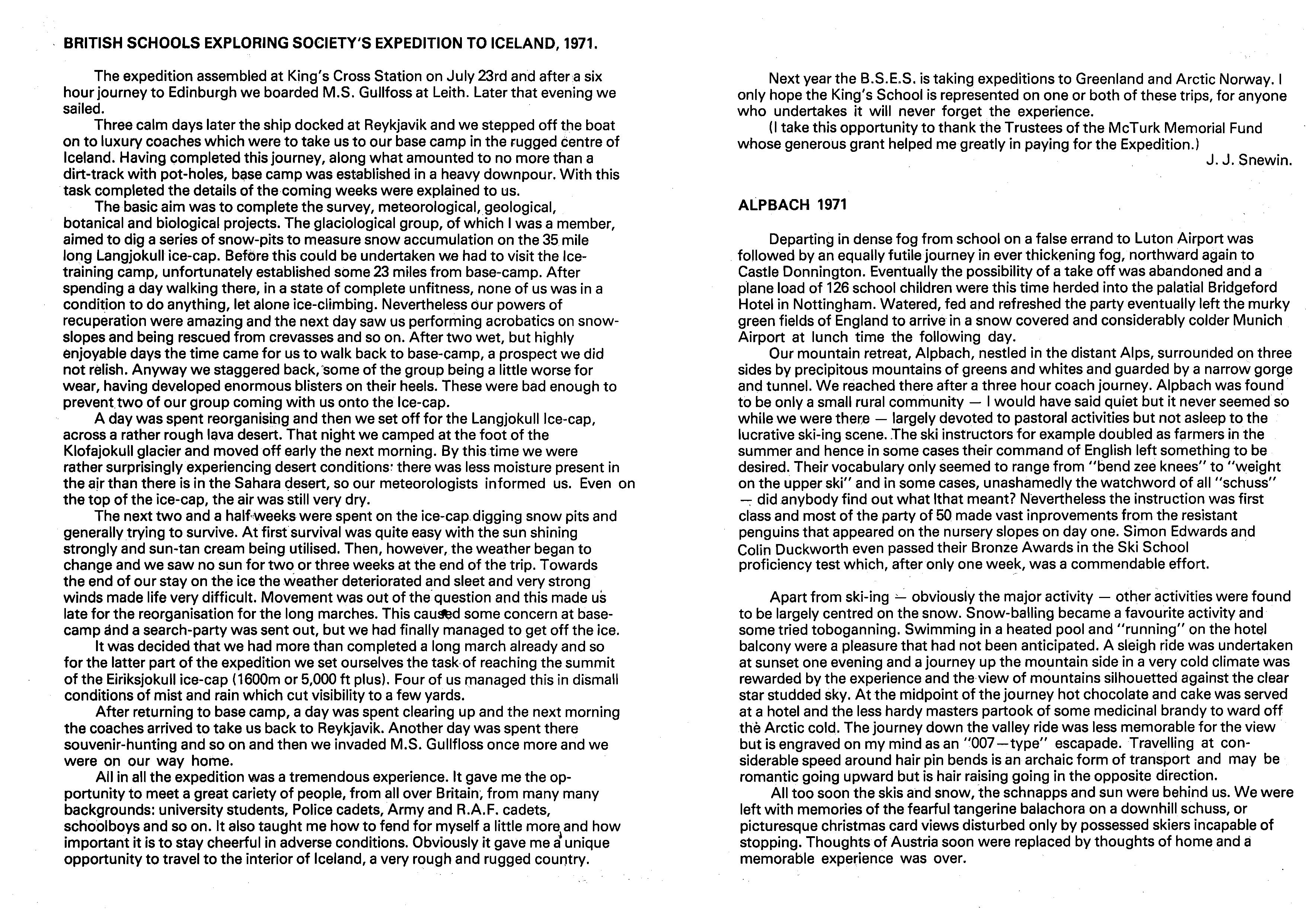
The expedition assembled at King's Cross Station on July 23rd and after:a six hour journey to Edinburgh we boarded M.S. Gullfossat Leith. Later that evening we sailed.
Three calm days later the ship docked at Reykjavik and we stepped off the boat on to luxury coaches which were to take us to our base camp in the rugged centre of Iceland. Having completed this journey, along what amounted to no more than a dirt-track with pot-holes, camp was established in a heavy downpour. With this task completed the details of the-coming weeks ""ere explained to us.
The basic aim was to complete the survey, meteorological,.geological, botanical and biological projects. The glaciological group, of which I was a member, aimed to dig a series of snow-pits to measure snow accumulation on the 35. mile long LangjokuU ice-cap. Before this could be undertaken we had to visit the Icetraining camp, unfortunately established some 23 miles from base-camp. After spending a day walking there, in a state of complete unfitness, none of us was in a to do anything, let alone ice-climbing. Nevertheless our powers of recuperation were amazing and the next day saw us performing acrobatics on snowslopes and being rescued from crevasses and so on. After two wet, but highly enjoya,ble days the time came for us to walk back to base-camp, a prospect we did not relish. Anyway we staggered back, °some of the group being a little worse for wear, having developed enormous blisters on their heels. These were bad enough to prevent.two of our group coming with us onto the Ice-cap.
A day was spent and then we set off for the Langjokulllce-cap, across a rather rough lava desert. That night we camped at the foot .of the Klofajokull glacier and moved off early the next morning. By this time we were rather surprisingly experiencing desert there was less moisture present in the aJr than there is in the Sahara gesert, so our meteorologists informed us. Even on the top of the ice-cap, the air was still very dry.
The next two and a half·:weeks·were spent on the ice-cap.digging snow pits and generally trying to survive. At firsfsurvival was quite easy with the sun shining strongly and sun-tan cream being utilised. Then, however,the weather began to change and we saw for two or three weeks at the end of the trip. Towards the end of our stay on the ice the .weather deteriorated and sleet and very strong winds made life very difficult. Movement was out of the' question and this made us late for the reorganisation for the long marches. This cau_d some concern at basecamp and a search-party was sent out, but we had finally managed to get off the ice.
It was decided that we had more than completed a long march already and so for the latter part of the expedition we set ourselves the task-of reaching the summit of the Eiriksjokull ice-cap (1600m or 5,000 ft plus). Four of us managed this in dismall conditions of mist and rain which cut visibility to a few yards.
After returning to base camp, a day was spent clearing up and the next morning the coaches arrived to take us back to Reykjavik. Another day was spent there souvenir-hunting and so on and then we invaded M.S. Gullfloss once more and we were on our way home.
All in all the expedition was a tremendous experience. It gave me the opportunity to meet a great cariety of people, from all over from many many backgrounds: university students, Police cadets, 'Army and R.A.F. cadets, scho'olboys and so on. It also taught me how to fend for myself a little more and how important it is to stay cheerful in adverse conditions. Obviously it gave me J unique opportunity to travel to the interior of Iceland, a very rough and rugged country.
Next year the B.S.E.S. is taking expeditions to Greenland and Arctic Norway. I only hope the King's School is represented on one or both of these trips, for anyone who undertakes it will never forget the experience.
(I take this opportunity to thank the Trustees of the McTurk Memorial Fund whose generous grant helped me greatly in paying for the Expedition.) J. J.Snewin.
Departing in dense fog from school on a false errand to Luton Airport was , followed by an equally 'futilejourney in ever fog, northw'ard again to Castle Donnington. Eventually the possibility of a take off was abandoned and a p'lane load of 126 school children were this time herded into the palatial Bridgeford Hotel in Nottingham. Watered, fed and refreshed the party eventually left the murky green fields of England to arrive' in a snow covered and considerably colder Munich Airport at lunch time the following day.
Our mountain retreat, Alpbach, nestled in the distant Alps, surrounded on three sides by precipitous mountains of greens and whites and guarded by a narrow gorge and tunnel. We reached there after a three hour coach journey. Alpbach was found' to be only a small rural community -I would have said quiet but it never seemed so whiJewe were there - largely devoted to pastoral activities but not asleep to the lucrative ski-ing scene. ,The ski instructors for example doubled as farmers in the summer and hence in some cases their command of English left something to be desired. Their vocabulary only seemed to range from "bend zee knees" to "weight on the upper ski" and in some cases, unashamedly the watchword of all "schuss" --:- did ,anybody find out what Ithat meant? N'evertheless the instruction was first class and most of the party of 50 made vast inprovements from the resistant penguins that appeared on the nursery slppes on day one. Simon Edwards and Colin Duckworth even passed their Bronze Awards in the Ski School proficiency test which, after only one was a commendable effort.
Apart from ski-ing obviously the major activity - other activities were found to be largely centred on the snow. Snow-balling became a favou"rite activity and' some tried toboganning. Swimming in a heated pool and "running" on the hotel balcony were a pl'easure that had not been anticipated. A sleigh ride was undertaken at sunset one evening and a journey up the side in a very cold climate was rewarded by the experience and the·view of mountains silhouetted against the clear star studded sky. At the midpoint of the journey hot chocolate and cake was served at a hotel and the less hardy masters partook of some medicinal brandy to ward off the Arctic cold,. The journey down the valley ride was less memorable for the view' but is engraved on my mind as an "007 -type" escapade. 'Travelling at considerable speed around hair pin bends is an archaic form of transport and may be romantic going upward but is hair raising going in the opposite direction. All too soon the skis a'nd snow, -the schnapps and sun were behind us. We were left with memories of the fearful tangerine balachora on a downhill schuss, or picturesque christmas card views disturbed only by possessed skiers incapable of stopping. Thoughts' ofAustria soon were replaced by thoughts of home and a memorable was over.
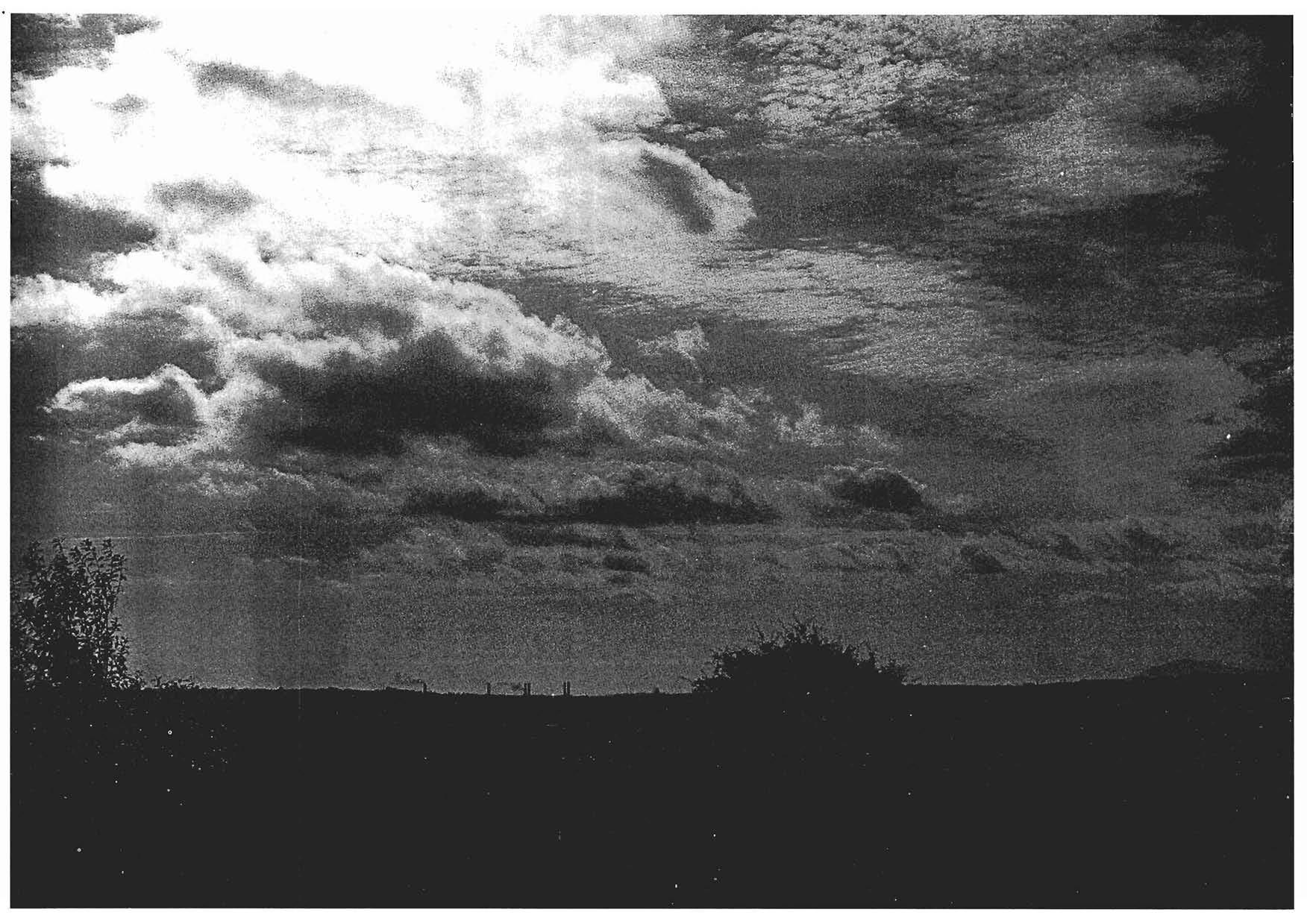
Friends, I feel there is something I must tell you:
Mr. F. Smith of Whitehall is going to Qe watching you very closely from now on. He will do this with the aid of his X.B. - 3. The X.B. - 3. is Mr. Smith's computer for amassing information he receives about you, from such sources as the census. Sooner or later, all you will be to Mr. Smith is another number on a computer card. "
I don't know how you feel, but I don't want to be a number. I am an individual -I like my Name and I want to keep it. You may scoff at my ideas, but we have a very good example of this Bureaucratic Plot in our own school. I refer, of course, to the Aptitude and Interest Tests.
People say that a central computer bank, with information gathered from the forms filled in by the majority of the population, is impossible. How many of us can get through life without having to fill in forms with personal information? Although there is a genuine need for much of the information asked for on these forms, the danger comes when people with ulterior motives for knowing this information are given access to it. "
The school arranges the and Interest Tests with the intention of helping boys to decide on a career. However, it is a well known fact that, as a result of these tests being taken, one boy, and I daresay he is not "an isolated case, at present in the sixth form, then studying for levels, was told that he was not suitable for further education. This boy is pretty intelligent. Now if this information was to be put onto a central computer"bank, what chance would this boy have of a good job if the company he wished to join had access to the central computer. No matter what his' A' level results turned out to be, the suspicion of inability to cope at higher levels would always remain with the employer.
We can all see how much more personal and searching this Census is, compared to the last one. Therefore, one has the right to speculate just how much more nosey the next one will be. Perhaps they will want to know the intimate details of your private life, or your political views, giving evidence to prove what you have written. If this central computer bank becomes reality, criminal records will be included; people may even be evaluated as to their usefulness, and if euthenasia is introduced, one can see what will'happenl Already, a statistics firm has bought the electoral register for the whole country, and we know from a survey conducted by The Sunday Times that the details of anybody's bank account can be found out for £5.
I suppose that many of you think that I am a crank, but I just believe that my business is my own, and that "privacy" should be kept private. 1984 is, perhaps, inevitable, but let's keep it out of our lives for as long as possible. If you elect completely to ignore this opinion, it will no longer be, "Good morning, sir," but, '/1 acknowledge LZ 37 H," and onward to room 101 to meet Mr. Smith.
(?)
These tests are designed for boys in the fifth, form to aid in their choice of career. Most people imagined that the results of these tests would teU them the job they should go for. So, many people were disappointed with the results, for they had expected to be told: liThe careerthat suits you m'ost is accountancy ... " or " .. deep sea diving." As a result of this, 'public opinion' of the tests was pretty "Iow: .
lilt was interesting, but it didn't tell me anything new."
"A w"aste of time."
"Thoroughly useless."
This was the level of opinion on the test results. This attitude is only based on the misconception that such tests are the be-all and end-all of career choosing. Those who know about the tests agree that taken in their proper context they are valuable.
The literature distributed by the Careers master, Mr. Hickson, explains the true purpose of the assessment: ". such aids cannot be expected to provide specific answers to questions on the choice of an occupation. Rather they should be regarded as a useful supplement to other ways of collecting relevant information In the long run, and used with other details, the results can be of use to the Careers Master in aiding boys to find the job for which they are most suited.
In this way, we can see how opposition to the practical side of the evaluation is ill-founded. However, not only the prapticality of the tests comes under fire. The ugly head of Individuality is raised. Some people, if not all, wish to stay names, not numbers. These few militants will make their voices heard above the bleating of the others.
But, as always, these few are too few to upset the smooth running of civilisation. One would rather be a name than a number, but remember, get confused. Freedom of the Individual is good, but too much of a good thing is bad for you.
Members of the sixth forms greatly enjoyed"the visit to the London GalleriE!s arranged by Mr. Vivian during the Easter Term. The visit was centred round the Tate and the Wallace Collections - Andy Warhol's exhibition at the Tate attracting most attention. The exhibition was of Warhol's earlier work: giant prints of Marilyn Monroe stared at Elvis Presley, in another room flowers of all colours covered·"the wall, a huge pile of Brillo boxes offset paintings of soup cans. It is clever -but is it art? The visit also gave those who had already seen these collections time to browse " around· some of the many commercial galleries.
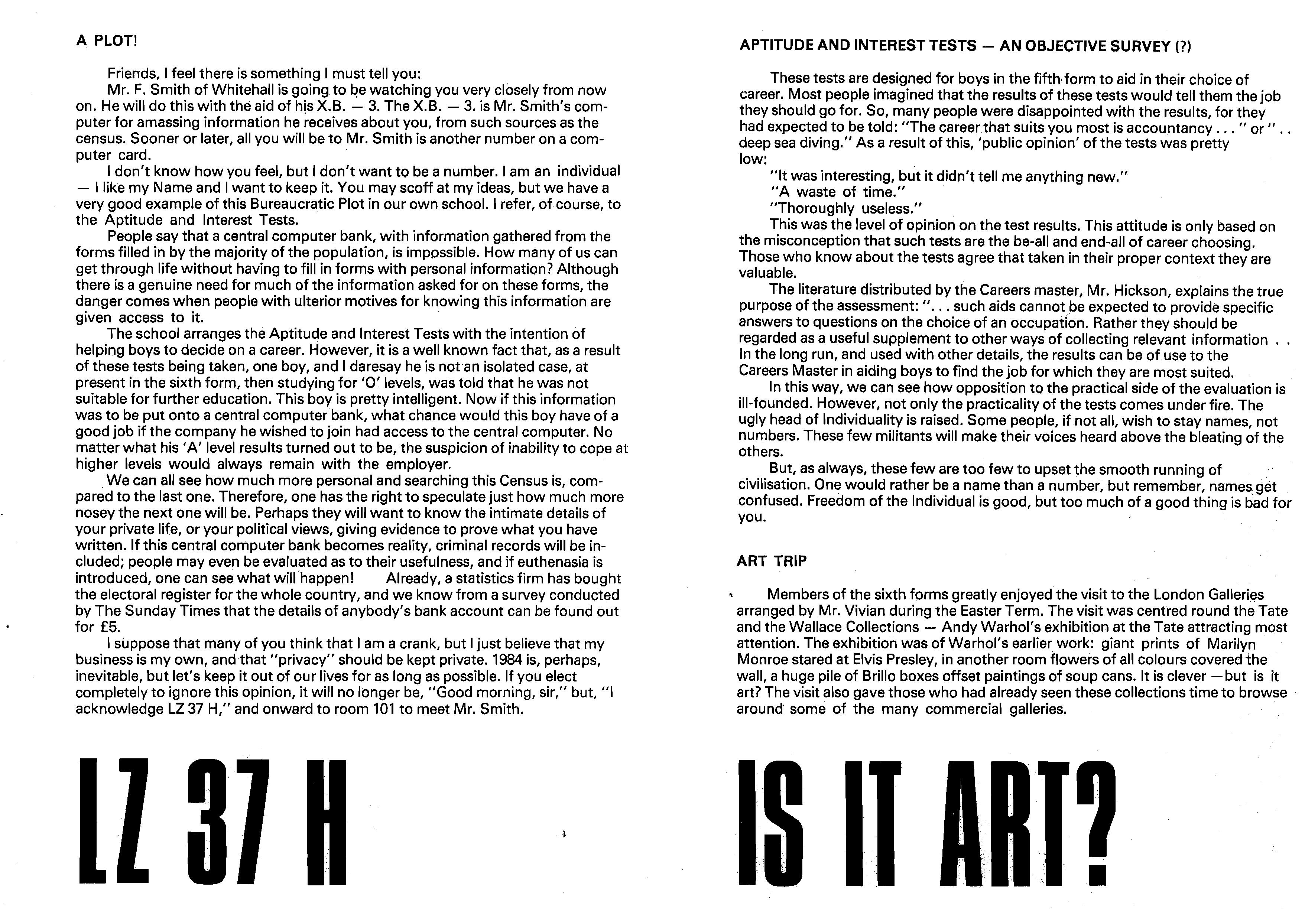
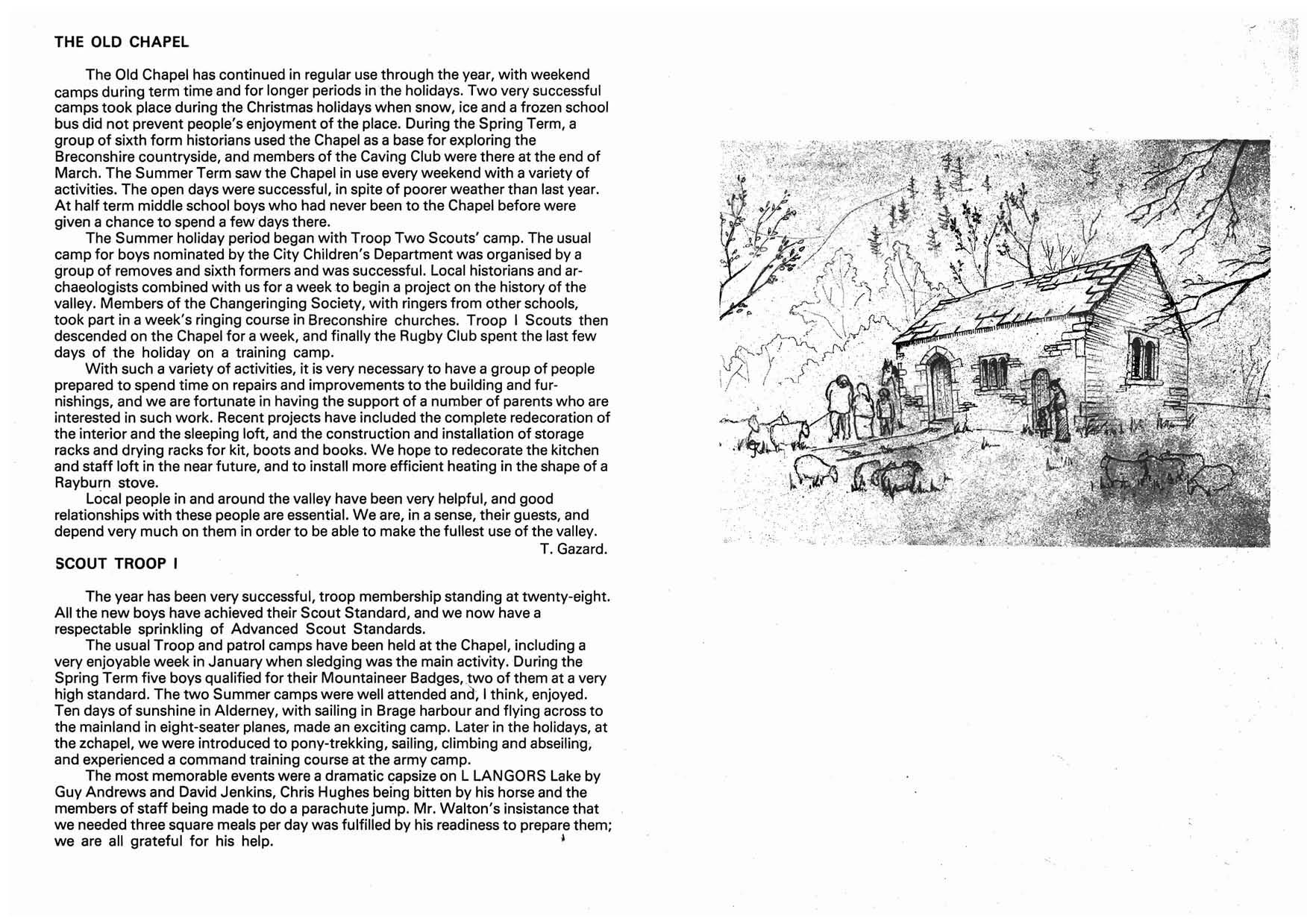
The Old Chapel has continued in regular use through the year, with weekend camps during term time and for longer periods in the holidays. Two very successful camps took place during the Christmas holidays when snow, ice and a frozen school bus did not prevent people's enjoyment of the place. During the Spring Term, a group of sixth form historians used the Chapel as a base for exploring the Breconshire countryside, and members of the Caving Club were there at the end of March. The Summer Term saw the Chapel in use every weekend with a variety of activities. The open days were successful, in spite of poorer weather than last year. At half term middle school boys who had never been to the Chapel before were given a chance to spend a few days there.
The Summer holiday period began with Troop Two Scouts' camp. The usual camp for boys nominated by the City Children's Department was organised by a group of removes and sixth formers and was successful. Local historians and archaeologists combined with us for a week to begin a project on the history of the valley. Members of the Changeringing Society, with ringers from other schools, took part in a week's ringing course in Breconshire churches. Troop I Scouts then descended on the Chapel for a week, and finally the Rugby Club spent the last few days of the holiday on a training camp.
With such a variety of activities, it is very necessary to have a group of people prepared to spend time on repairs and improvements to the building and furnishings, and we are fortunate in having the support of a number of parents who are interested in such work. Recent projects have included the complete redecoration of the interior and the sleeping loft, and the construction and installation of storage racks and drying racks for kit, boots and books. We hope to redecorate the kitchen and staff loft in the near future, and to install more efficient heating in the shape of a Rayburn stove.
Local people in and around the valley have been very helpful, and good relationships with these people are essential. We are, in a sense, their guests, and depend very much on them in order to be able to make the fullest use of the valley.
T. Gazard.
The year has been very successful, troop membership standing at twenty-eight. All the new boys have achieved their Scout Standard, and we now have a respectable sprinkling of Advanced Scout Standards.
The usual Troop and patrol camps have been held at the Chapel, including a very enjoyable week in January when sledging was the main activity. During the Spring Term five boys qualified for their Mountaineer Badges,Jwo of them at a very high standard. The two Summer camps were well attended and; I think, enjoyed. Ten days of sunshine in Alderney, with sailing in Brage harbour and flying across to the mainland in eight-seater planes, made an exciting camp. Later in the holidays, at the zchapel, we were introduced to pony-trekking, sailing, climbing and abseiling, and experienced a command training course at the army camp.
The most memorable events were a dramatic capsize on L LANGORS Lake by Guy Andrews and David Jenkins, Chris Hughes being bitten by his horse and the members of staff being made to do a parachute jump. Mr. Walton's insistance that we needed three square meals per day was fulfilled by his readiness to prepare them; we are all grateful for his help.
Bridge was not a Friday afternoon activity last year, but we were able to meet in lunch breaks and after school. Five school matches were played in the Autumn Term. After beating W.R.G.S. 109-35, we lost to Bishop Vesey's 58-60 as a result of some unfortunate errors. After this, we played W.R.G.S. again, winning 90-33, and then went on to beat Malvern College 113-21, and Chosen Hill, Gloucester 119-48. These matches, however, were really to give practice to the team, for the first event of the Spring Term was the Francis Strong Cup for West Midland schools. Our team consisted of M. P. G. Statham, R. J. Granville, T. A. R. Jagger and N. K. Wolfendale. As three of these were in the team the year before, we had hopes of doing well, and, in fact, halfway through, we were leading with a hundred per cent score. Although we lost the'tpatch with Bishop Vesey's, we won the event with a score of seventy-nine per cent, sell ahead of the next school. .
The entry for The Daily Mail Schools' Cup was so large this year that there had to be two rounds before the final. In the first round we scored seventy-six per cent, but eventually finished second to Cheltenham College. Because of the postal strike the total entry was not known, and it was over four weeks before we knew that we had qualified for the next round - rather luckily, because Bishop Vesey's had come second in their heat with seventy per cent and not qualified.
In the meantime we had played three more school matches, beating Malvern College 71-13, Bishop Vesey's 64-42 and W.R.G.S. 78-64. C. Ross played very competently as reserve in all three games. Then came the semi-final of the Daily Mail Cup. We only managed to score fifty seven per cent, but this was second out of six teams and was enough to quality us for the final.
There were ten teams in the final, held this year at the National Liberal Club. We started poorly, scoring only.forty-seven per cent in the first session, but in the second session we had moved into third place. After the third and final session we were second with a score of sixty-eight per cent, but were well behind the winners, Brighton, Hove and Sussex G.S., who scored eighty-one per cent. However, second out oftwo hundred and twenty-four teams was a satisfying result.
Next year we will have a completely new team, but there are several young players under coaching who could for a strong team next year and the year after.
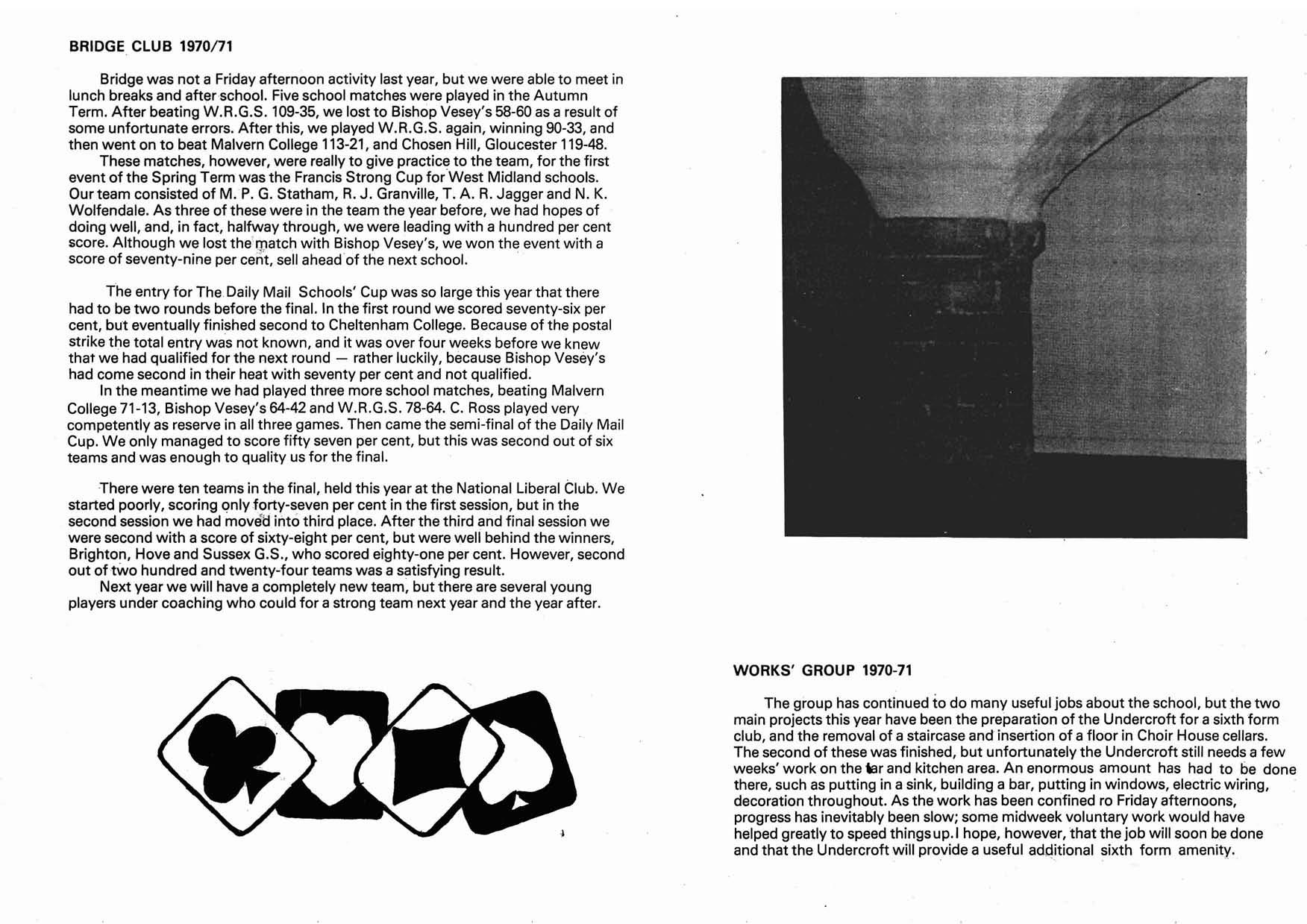
The group has continued to do many useful jobs about the school, but the two main projects this year have been the preparation of the Undercroft for a sixth form club, and the removal of a staircase and insertion of a floor in Choir House cellars. The second of these was finished, but unfortunately the Undercroft still needs a few weeks' work on the and kitchen area. An enormous amount has had to be done there, such as putting in a sink, building a bar, putting in windows, electric wiring, decoration throughout. As the work has been confined ro Friday afternoons, progress has inevitably been slow; some midweek voluntary work would have helped greatly to speed things up. I hope, however, that the job will soon be done and that the Undercroft will provide a useful ad,qitional sixth form amenity.

We print the following extracts from Richard Hebden's letter to the Headmaster because we think it will not only interest many readers, but also be of some use to them . (He goes to Canada after leaving school and, before going up to university, gets a job in a warehouse in Toronto. He has already earnt a fair amount of money when strike action is contemplated by his workmates). Anyway, I decided it a waste of time making my fortune in Canada when summer was coming, so I left Toronto as soon as the strike started, around mid May, and hitched across Canada out West. This is the chief occupation of thousands of students and young folk who either don't want to, or can't find work in the summer - hitching or motorcycling as far away from their home town as they can go: all the people from eastern Canada go West, and those from British Columbia and Alberta come East, and, I' should mention, those from the States come North! I suppose the reason is that North Americans in general always seem to like to move around, and that the sheer size of the continent invites them to move around. The Canadian government this year was rather alarmed at the expected migration this summer, especially as it tends to be concentrated on the Trans-Canada Highway, and therefore, in the middle of summer, townsli,ke Vancouver, Banff, Montreal and Toronto have a massive influx of "transients" as the government call these people. Many are broke or need food or shelter, and some city authorities tend to get somewhat hysterical at the "hippy" invasion. The mayor of Vancouver is a great enemy'of transients, for example, and not perhaps entirely without reason, though his issue of three foot riot sticks to Vancouver police seems a trifle unnecessary. However, the government does provide a good deal of food and shelter for transients in these cities; I don't really see why it should, after all in the majority of cases it is your lookout if you can't feed yourself. On the other hand, if this didn't happen, a lot of people would probably take to shop-lifting or begging, so the government prefers to keep them quiet. I suppose that it is lucky for the transient community that,this is done, otherwise there might be considerable hostile reaction to all this travelling on the cheap. Even so, it seems a large number of older people are very hostile to it already; I suppose that is because they made their way with no help from anyone, so why should young people today bum around, living off the' government etc.'""etc Who can argue, though? I used to read all sorts of hysterical letters in the papers by apoplectic old gentlemen who lumped everybody with hair touching their collar together as "hippies", and therefore either dirty, drunk or drug-ridden or all three together! But I suppose that is true in any country.
I've talked about this travelling thing at some length because it is a very big thing in Canada. A lot of people will work for six months in the winter and travel around in the summer. Some will probably never settle down; some have been "on the road" for years and years; some, in fact quite a lot, are university drop-outS. In Canada and, I ,think also, in the States, it is very easy to get into a university, provided you have passed out of grade school with good marks, which a lot of people do, and you can provide the money. I-n Canada, neither is difficult to obtain.
The places are there anyway, but the trouble is a lot of p'eople come out of grade' school, get their place at university and take an arts course such as philosophy or English or sociology or something like that. Half way through they find that (a) the course is no use to them, (b) if they finish, they will probably end up digging holes in the road or driving taxis along with a whole bunch of unemployed philosophers and economists. Or, if they don't drop out all together, they do, say, two years of their " course, go away and work for a year, in Alaska for example, somewhere in the states(the other ones!), and then come back and finish the course. Then they go away, work some more, then take anothe'r course which will qualify them for a job. So you have a case here where the educational system is producing more graduates than _ the economy can absorb, or awhole lot of people whose q'ualifications qualify them for nothing. So, now, a number o,f people say, why bother? when they finish school, and off they go looking for something worthwhile. For transients, in general"this means working as little as possible, eating as much as you can get (since you aren't certain when you'll eat next), and enjoying your self as much as your finances will allow. Well, that's what I did for a few months, and I wish I could do it all my life!, This may sound incredibly self-indulgent, but in fact I believe I was a much happier person, and certainly much more concerned with other people during that-time than I have ever been. Perhaps this may be an excuse for a prolonged holiday, but I never regarded it as that, and neither did most of the people I met on the road. , For example, I spent a lot of time in Banff, a holiday centre in the Rockies. It is a place where transients, howeverthey are travelling, whether by thumb, freight-train, motor-bike or camper van, naturally congregate. When you ask what did we do all that time we were there, it is difficult to explain. I suppose the main thing was that we had time to give our time to each other. You know how most of the time people rarely have the time to spare for anyone else, and how in our society "independence" or "individuality" are often unsociability or sheer unfriendliness, or perhaps fear of each other? Well, that's what I think a lot of transients were trying to overcome and find an answer to. And in a wealthy materialistic society such as North America, this I am certain is vitally important. I was certainly happier then than now or before, not only because people around me were behaving naturally, but I didn't have to worry about" thin gs". Thus when I got home, I had to worry about my motorbike - in.surance and suchlike - oh, a friend has this or that LP -I really wouldJike it, I go out and get I .come home and I am not really satisfied because I want something more - the operative word being "thing". The only thing I had to bother about was food, and the satisfaction of a full stomach far out-, weighed any satisfaction I could have got from a bike or a record or even ,a musical instrument. And when you're living in beautiful surroundings and are involved only with other people, wen, I didn't want much more. I don't want to draw an idyllic _picture of life in a transient. community -I just happen to prefer it to the of' urban life. But then it seems we are stuck with that and no amount of communes in the mountains of British Columbia and Alberta are going to prevent the fact that far more people live a vastly inferior life in Vancouver and Calgary simply because the "city" and the machines of "progress" have taken over from the being", and the land could not now support the teeming ,millions which, I am sure, have been brought about by our runaway progress machine. I S,uppose you can't have your cake and eat it. "
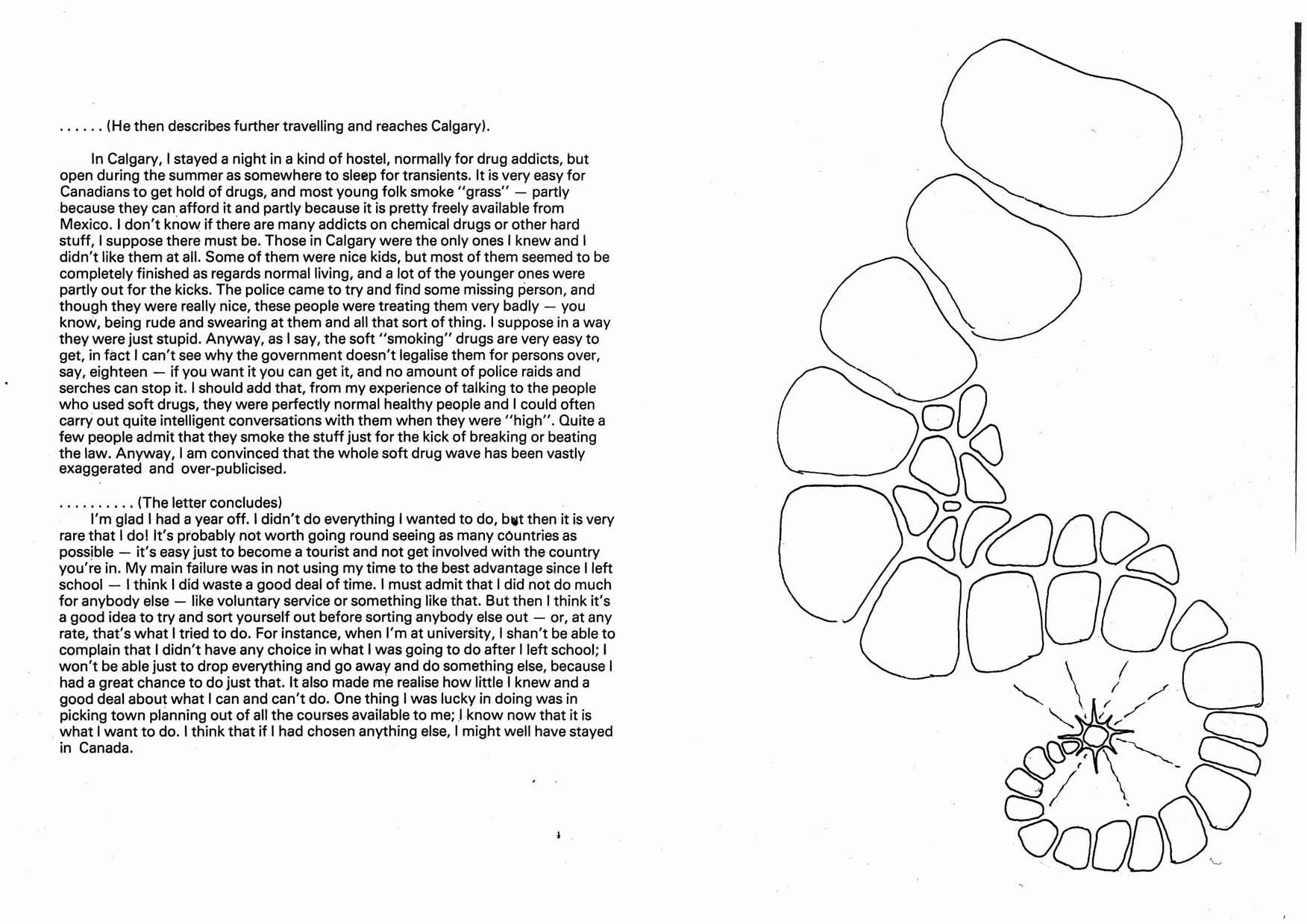
.
...... (He then describes further travelling and reaches Calgaryl.
In Calgary, I stayed a night in a kind of hostel, normally for drug addicts, but open during the summer as somewhere to sleep for transients. It is very easy for Canadians to get hold of drugs, and most young folk smoke "grass" - partly because they can afford it and partly because it is pretty freely available from Mexico. I don't know if there are many addicts on chemical drugs or other hard stuff, I suppose there must be. Those in Calgary were the only ones I knew and I didn't like them at all. Some of them were nice kids, but most of them seemed to be completely finished as regards normal living, and a lot of the younger ones were partly out for the kicks. The police came to try and find some missing person, and though they were really nice, these people were treating them very badly - you know, being rude and swearing at them and all that sort of thing. I suppose in a way they were just stupid. Anyway, as I say, the soft "smoking" drugs are very easy to get, in fact I can't see why the government doesn't legalise them for persons over, say, eighteen - if you want it you can get it, and no amount of police raids and serches can stop it. I should add that, from my experience of talking to the people who used soft drugs, they were perfectly normal healthy people and I could often carry out quite intelligent conversations with them when they were "high". Quite a few people admit that they smoke the stuff just for the kick of breaking or beating the law. Anyway, I am convinced that the whole soft drug wave has been vastly exaggerated and over-publicised
(The letter concludes)
I'm glad I had a year off. I didn't do everything I wanted to do, blllt then it is very rare that I dol It's probably not worth going round seeing as many cOuntries as possible - it's easy just to become a tourist and not get involved with the country you're in. My main failure was in not using my time to the best advantage since I left school -I think I did waste a good deal of time. I must admit that I did not do much for anybody else - like voluntary service or something like that. But then I think it's a good idea to try and sort yourself out before sorting anybody else out - or, at any rate, that's what I tried to do. For instance, when I'm at university, I shan't be able to complain that I didn't have any choice in what I was going to do after I left school; I won't be able just to drop everything and go away and do something else, because I had a great chance to do just that. It also made me realise how little I knew and a good deal about what I can and can't do. One thing I was lucky in doing was in picking town planning out of all the courses available to me; I know now that it is what I want to do. I think that if I had chosen anything else, I might well have sJayed in Canada.
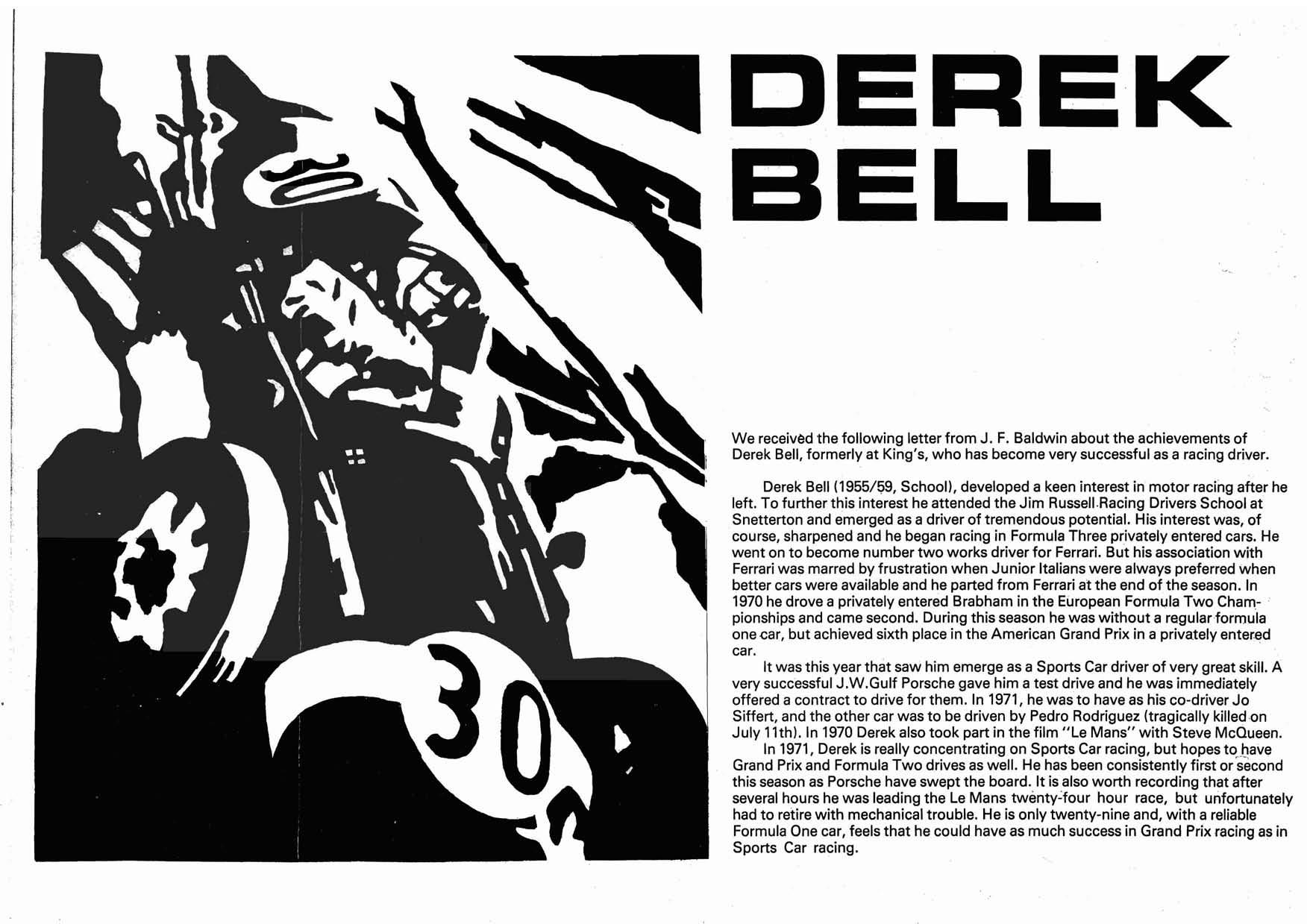
We received the following letter from J. F. Baldwin about the achievements of Derek Bell, formerly at King's, who has become very successful as a racing driver.
Derek Bell (1955/99, Schooll, developed a keen interest in motor racing after he left. To further this interest he attended the Jim Russell.Racing Drivers School at Snetterton and emerged as a driver of tremendous potential. His interest was, of course, sharpened and he began racing in Formula Three privately entered cars. He went on to become number two works driver for Ferrari. But his association with Ferrari was marred by frustration when Junior Italians were always preferred when better cars were available and he parted from Ferrari at the end of the season. In 1970 he drove a privately entered Brabham in the European Formllla Two Championships and came second. During this season he was without a regular formula one .car, but achieved sixth place in the American Grand Prix in a privately entered car.
It was this year that saw him emerge as a Sports Car driver of very great skill. A very successful J.W.Gulf Porsche gave him a test drive and he was immediately offered a contract to drive for them. In 1971, he was to have as his co-driver Jo Siffert, and the other car was to be driven by Pedro Rodriguez (tragically killed on July 11th!. In 1970 Derek also took part in the film "Le Mans" with Steve McQueen. In 1971, Derek is really concentrating on Sports Car racing, but hopes to•.Oave Grand Prix and Formula Two drives as well. He has been consistently first or second this season as Porsche have swept the board. It is also worth recording that after several hours he was leading the Le Mans hour race, but unfortunately had to retire with mechanical trouble. He is only twenty-nine and, with a reliable Formula One car, feels that he could have as much success in Grand Prix racing as in Sports Car racing.
Arua is in the far north wes1 of Uganda only ten miles from Congo and forty from the Soutr,ern-Sudan. The las(half of the journey was over rough roads' 'especially il') the West Nile'district itself. We reach,ed Arua eight hours later after a. bumpy but interesting 310 mile ride, part of it through the Murchison Falls game park with elephant and water buffalo by the sides of the road. ,
-For the first month I stayed with John Haden, my former teacher at King's School whom some of.y'ou m<!y remember. I w'as given first year students to teach but as they didn't come until February I had a month doing odd jobs and slowing down to pace of African life: DLiHng this time the military takeover took place in Uganda but being so far,frorD Kampala and Milton Obote's home district of Limgo prevented any Nile. ", '
At the end of thi,S.ITiQ'nltilrmpved into the Mission, Guest House. The school is built on two sites a mile a ,a,rniriC! as I was only teaching first years on Old Site, I needed to be nearer thao.lY.lr;J1aOen's house at New Site: Eventually all the school will be at New Site tTiodern buildings but at present there is not enough room. ' ., .'
However I 0' Iy been teaching nine days when a disturbance occurred on New Site resulting in the death of a student and the whole school was closed. The inquiries took 2 Y2- months during which I went for a short holiday in Kenya seeing the tea estate region of·-Kericho and Nairobi itself, with its beautifully planned and mode'n centre adjoining some bpd slums. '
Shortly I ,arrived back in early May the school restal1ed. The atmosphere now as I write thiS a month later is far,better tnan ever bafore'-Staff and students are co-operating to m'ake up for lost time, 'and 'there. is a much, friendlier spirit. "" , It's a little here atfirst.:£ven the first year students are up to six years older'tMn I am and my class,contains ages 'from 13'to 24! However they're all keEtn;to sQd very, .gqt into secondary school at all. , is 'mixeQ, witil·550 but not very, many girls, and is as well , 'Eiql:Jipped as m<\lny,in Ehgland, in the l?cjence laboratories. I teach Physics, Chemistry, anQ English but I take footb 911 and volleypall, bo'th of which are very pCipular. In additi,on the stude)1ts are, willing to t€l1k informally and I think much of interest has cO.!)1e out of such talks, perhgps asJndirectly valuable as my teaching I ,',,: : - ',., " , .,.:> .:' , ,. .';'."
I was the secol)d person tO,be able to teach at Mvara Senior Secondary School; Arua, as a volunteer for two terms between school and University. I was'sponsored= , by the school and the S'chools African Linking Scheme who jointly gave the money for my air fares. : , ,' '
. I arrived at Nairobi ori a hot January'Night, 8 hours from freezing Gatwick. After some trouble with Kenya immigration, I had to·fly to Eutebbe, and I stayed a·further night in Uganda's capital, Kampala, before travelling on the bus to Arua. ' , .

./
\ " !pave still got two months to teach.gere. I feel what I am doing js helping " and myself, but there may Qot be many mor.e vacancies Iikecthis. Permits for schoolleavers are more and more difficultto get as the number of qualified' ", ", 'teachers .increase so soo;,'the system may:fii:tish. Howe\l.er in tne meantime I would' ': .;. strongly urge anyone interested to take the' chance to see and help a courtry totally.'" ;. ,'" differeht from our, own, , _,::;' , Lastly I would like to thank those in-the,Scho,ols African Linking Scheme arid King's Scho,ol Worcester who,gave invaluable"advice financial help to me. , ., u:. '_ .... T. Ga/:a'rd. Mva'ra June, 1971. ' . . '. , .': ''':.
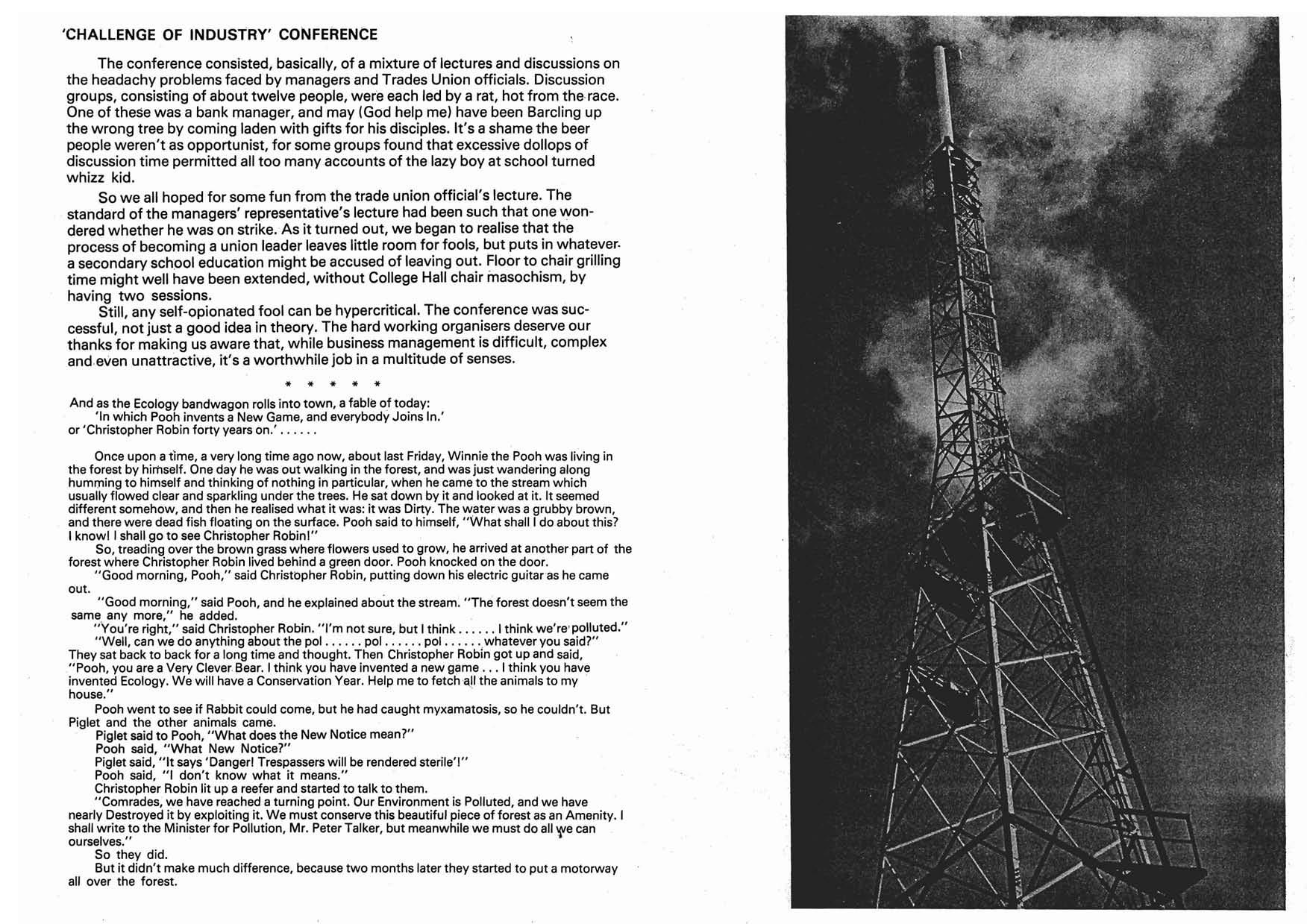
The conference consisted, basically, of a mixture of lectures and discussions on the headachy problems faced by managers and Trades Union officials. Discussion groups, consisting of about twelve people, were each led by a rat, hot from the race. One of theSe was a bank manager, and may (God help me) have been Barcling up the wrong tree by coming laden with gifts for his disciples. It's a shame the beer people weren't as opportunist, for some groups found that excessive dollops of discussion time permitted all too many accounts of the lazy boy at school turned whizz kid.
So we all hoped for some fun from the trade union official's lecture. The standard of the managers' representative's lecture had been such that one wondered whether he was on strike. As it turned out, we began to realise that the process of becoming a union leader leaves little room for fools, but puts in whatever. a secondary schpol education might be accused of leaving out. Floor to chair grilling time might well have been extended, without College Hall chair masochism, by having two sessions.
Stili, any self-opionated fool can be hypercritical. The conference was successful, not just a good idea in theory. The hard working organisers deserve our thanks for making us aware that, while business management is difficult, complex and even unattractive, it's a worthwhile job in a multitude of senses.
And as the Ecology bandwagon rolls into town, a fable of today:
'In which Pooh invents a New Game, and everybody Joins In.' or 'Christopher Robin forty years on.' .
Once upon a time, a very long time ago now, about last Friday, Winnie the Pooh was living in the forest by himself. One day he was out walking in the forest, and was just wandering along humming to himself and thinking of nothing in particular, when he came to the stream which usually flowed clear and sparkling under the trees. He sat down by it and looked at it. It seemed different somehow, and then he realised what it was: it was Dirty. The water was a grubby brown, and there were dead fish floating on the surface. Pooh said to himself, "What shall I do about this? I knowl I shall go to see Christopher Robin'"
So, treading over the brown grass where flowers used to grow, he arrived at another part of the forest where Christopher Robin lived behind a green door. Pooh knocked on the door.
"Good morning, Pooh," said Christopher Robin, putting down his electric guitar as he came out.
"Good morning," said Pooh, and he explained about the stream. "The forest doesn't seem the same any more," he added.
"You're right," said Christopher Robin. "I'm not sure, but I think I think we're'polluted."
"Well, can we do anything about the pol pol pol whatever you said?" They sat back to back for a long time and thought. Then Christopher Robin got up and said, "Pooh, you are a Very Clever Bear. I think you have invented a new game I think you have invented Ecology. We will have a Conservation Year. Help me to fetch -a.1I the animals to myhouse." .
Pooh went to see if Rabbit could come, but he had caught myxamatosis, so he couldn't. But Piglet and the other animals came.
Piglet said to Pooh, "What does the New Notice mean?"
Pooh said, "What New Notice?"
Piglet said, "It says 'Dangerl Trespassers will be rendered sterile'I"
Pooh said, "I don't know what it means."
Christopher Robin lit up a reefer and started to talk to them.
"Comrades, we have reached a turning point. Our Environment is Polluted, and we have nearly Destroyed it by exploiting it. We must conserve this beautiful piece of forest as an Amenity. I shall write to the Minister for Pollution, Mr. Peter Talker, but meanwhile we must do all 'fe can ourselves."
So they did.
But it didn't make much difference, because two months later they started to put a motorway all over the forest.
Notes by the Architect.
The building is designed to require relatively little maintenance both internally and externally, yet being so closely sited to the swimming pool, etc., it must make a positive contribution to the school environment as a building. The very large envelope structure must not become over-bearing and 'darkening' to the surroundings. This has been resolved by the use of strong horizontal lines of glazing and cladding to the balcony area.
The pool - which adds a further dimension of activity to this sports areapresented problems in forming foundations so close to its edge, especially as the poor nature of the subsoil required deep penetration for which piling was employed, connected by reinforced concrete beams upon w,hich the structural frame and walls were built.
A Sports Hall is normally called upon to house a multiplicity ofJunctionsmany of them considerable noise-generators. Here there was the further requirement of use for examinations and occasional large assemblies of people for several types of activity. A highdegreeof noise reflection - often synonymous with very durable materials - is frequently accepted reluctantly for sporting activity but is quite unacceptable for other purposes. It is only with the development of newer forms of needlefelt carpeting in very recent years that a sound-absorbent floor with good playing, wearing and maintenance characteristics has become available at reasonable cost. The floor in the Sports Hall at the King's School should considerably enhance the building's versatility. .
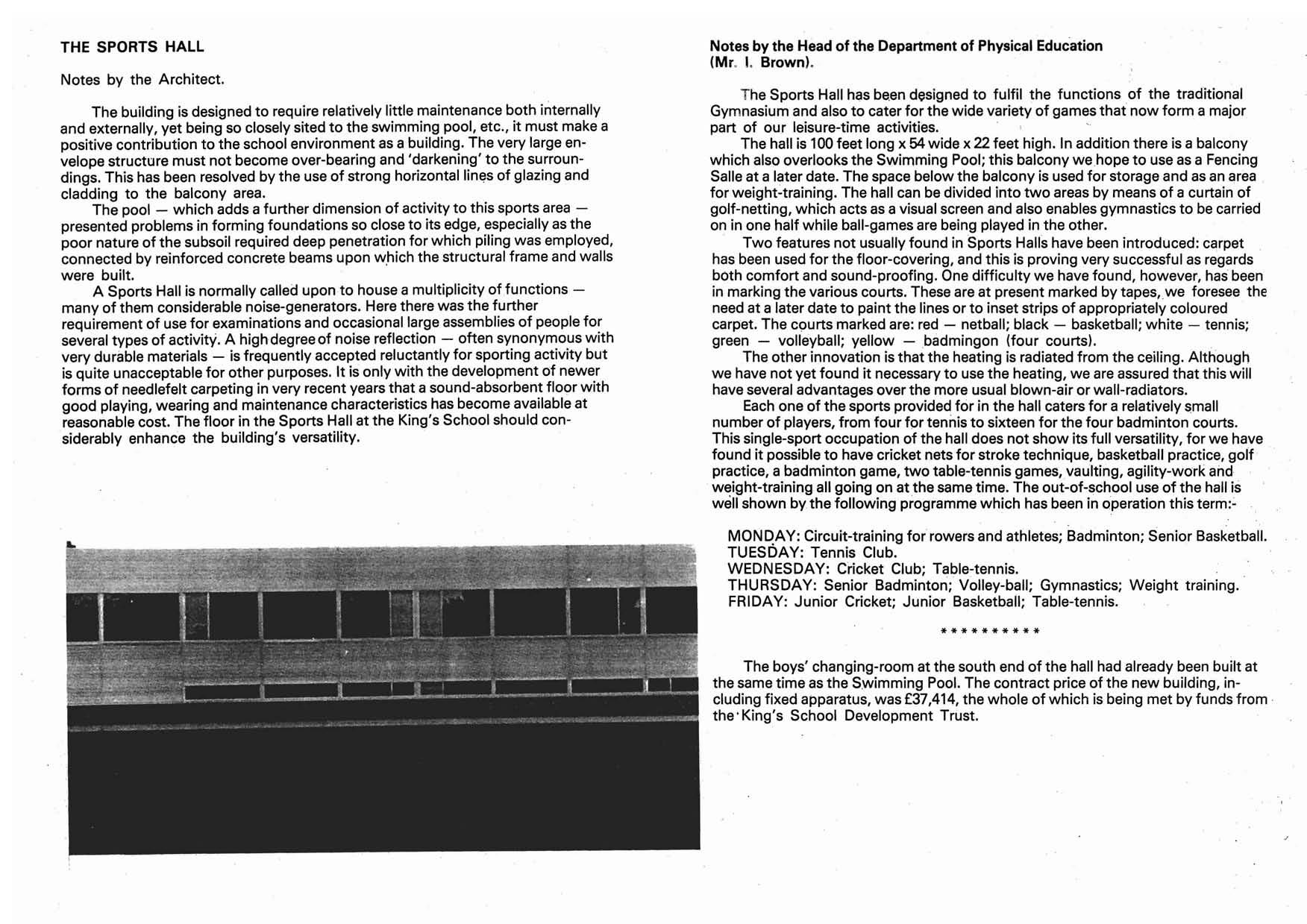
Notes by the Head of the Department of Physical Education (Mr. I. Brown).
The Sports Hall has be.en designed to fulfil the functions of the traditional Gymnasium and also to cater for the wide variety of games that now form a major part of our leisure-time activities.
The hall is 100 feet long x 54 wide x 22 feet high. In addition there is a balcony which also overlooks the Swimming Pool; this balcony we hope to use as a Fencing Sa lie at a later date. The space below the balcony is used for storage and as an area for The hall can be divided into two areas by means of a curtain of golf-netting, which acts as a visual screen and also enables gymnastics to be carried on in one half while ball-games are being played in the other.
Two features not usually found in Sports Halls have been introduced: carpet has been used for the floor-covering, and this is proving very successful as regards both comfort and sound-proofing. One difficulty we have found, however, has been in marking the various courts. These are at present marked by tapes, we foresee the need at a later date to paint the lines or to inset strips of appropriately coloured carpet. The courts marked are: red - netball; black - basketball; white - tennis; green - volleyball; yellow - badmingon (four courts).
The other innovation is that the heating is radiated from the ceiling. Although we have not yet found it necessary to use the heating, we are assured thatthis will have several advantages over the more usual blown-air or wall-radiators.
Each one of the sports provided for in the hall caters for a relatively small number of players, from four for tennis to sixteen for the four badminton courts. This single-sport occupation of the hall does not show its full versatility, for we have found it possible to have cricket nets for stroke technique, basketball practice, golf practice, a badminton game, two table-tennis games, vaulting, agility-work and weight-training all going on at the same time. The out-of-school use of the hall is well shown by the following programme which has been in operation this term:
MONDAY: Circuit-training for rowers and athletes; Badminton; Senior Basketball. TUESDAY: Tennis Club.
WEDN ESDAY: Cricket Club; Table-tennis.
THURSDAY: Senior Badminton; Volley-ball; Gymnastics; Weight training.·
FRIDAY: Junior Cricket; Junior Basketball; Table-tennis.
The boys' changing-room at the south end of the hall had already been built at the same time as the Swimming Pool. The contract price of the new building, including fixed apparatus, was £37,414, the whole of which is being met by funds from· the' King's School Development Trust.

This side never really reqlised I, hard 'to live up to last year'l?,side's reputation. With BromsgrQ\le;giving the a very ,hard st, h'e luck, but fate vyasagainst us in,so fa.ra&\X,e had to m the Brecon ",game. However,a recovery was made I?SH;'larw.v¥l'Y,Jo·
A pattern had been set and It WpS the eXP?r1en.ced,Pla;ye rs to,lift some of the new blood, but by half, the fifteen w3fe pl,aymg good rugby on,Saturdays andalmost poor r. Particularly good results were achieved.agall'u.tKE.S.,BI ghallla,npColstgn s 'School, Bristol. ,These two matches, c.omiqg neC!rthe end 0 errp,shoV\(,ed Plilrpaps how we could \'lave succeeded:giveo an, eas,ier ,start. The end of termtour tak,en tO,Southampton successful in 'two 'of ;,the ' three'games,' ,S,}i;'<,," '
With two only two fir&difieEin matches'j against Solihull finishe 'and eleven defeats. Chas Hamilton, Richard Bailey, gel' Mol' Mike Pimley and Mark Smith pia ed for the county d iog the s

This season (1971/72) is the fiftieth anniversary of the school Rugby Club. It is hoped to celebrate this occasion with a match against WOrcester R.F.C., our first fixture, and to follow it with a dinner. We would particularly like to hear from anybody who played in that first season and hope that they may be able to d the celebrations. Anyone who would like further details should write to I. Master in charge of Rugby at the King's School.

At the beginning of the season, prospects for a repeat of last year's successes seemed remote. The Club had few experienced members on whom to build a first eight, the previous year's crew having all given Lip to pursue more academic pastimes.
The trial eights were eventually finalised into first and second eights in time for the beginning of the Heads season. The Heads of Rivers at Reading, Worcester and Gloucester showed that the first eight could hold its own against most local opposition, but its real potential was not even glimpsed until Rowing Camp.
The first test of the eight's ability came at the Gloucester Regatta, where they won the Sir Thomas Rich's Cup. Both the second eight, which ro.wed in fours, and the Junior Colts gave a good account of themselves, the latter losing a grElat race in the semi-finals. This victory gave the first eight much needed confidence which was reflected in their three victories over half term at Worcester, Hereford City and Hereford Schools' regattas.
After half term, all crews got down to some really hard work in preparation for the Pangbourne National Schools' Regatta. The first eight had unanimously decided to enter the Child-Beale Cup, in spite of their extreme youth. Although conditions were far from ideal, the crew produced its best form of the season. After victories over King's Canterbury, Monckton Combe, The Leys and Winchester in the preliminary rounds, an outstanding start in the final saw King's in the lead at the half-way stage. However they faded somewhat towards the finish to come in second to St. Paul's School. The Junior Colts did well to reach the final of their event, being placed fourth in their division. An unlucky second eight - successful at Vigoe Regatta against Wycliffe College - were drawn badly for their semi-final and did not reach the final.
The following week, the first eight went to Marlow Regatta where they won Junior Eights in fine style; the second eight, meanwhile, proved their fighting spirit although narrowly losing in their final at Pangbourne and Whitchurch Regatta.
Thiswas the close of the season for all but the first eight, whO stayed on after the end of term to train for the National Youth Championships, where they crowned a fine season by bringing home the Silver Harp Trophy for colts eights, beating Eton by one and a quarter lengths in the final. "
The success of the Club this year was largely due to the tremendous amount of time devoted by all concerned. We would like to express our immense gratitude to Mr. Gabriel and Mr. Watson who did somuch towards making the season a success. Thanks are also due to Mr. Anderton and Mr. Thompson for their reorganising of the junior section of the Boat Club at the start of the season, and their efficient running of it thereafter.
Captain: J. Britton, Secretary: M. J. Hickling.
First Eight Colours: J. Parry, D. Townsend, C. Stubbington, L. Bonner, D. J. Britton, A. Anslow, N. Grainge.
First Eight Coxing Colours: P. Freeman.
This side was a real mixture: only one member of last'year's side remained (Pimley, the captain); then there were four members of last year's second eleven, two or three formers, and one and sometimes two upper removes. With this lack of experience, we were relieved to have the services of three players from Sebright, one of whom, Curtis, together with the much improved Trape, carried the bowling. Price and Jones, the other two from Sebright, though not achieving much in terms of figures, brought a lot to the side in terms of attitude in the field.
Pimley did well to captain this odd collection of people and can take credit for the fact that, while his team never exactly made the game look easy, or, indeed, sometimes, fun, they made the game equally difficult for the opposition, and achieved a better record by the end of term than many sides with much more ability.
The lack of ability and technique showed itself most of all in the batting, where a score of 130 seemed to bethe maximum possible in a half day game, even on easy wickets. Only twice in the season did our batsmen dominate - in the first match, against Hereford Cathedral School; when Pimleyand Curtiswent well, and in the last match, when Pimley and Hawkley produced easily the best batting of the season against K.E.S., Birmingham. Curtis lackedtha concentration and technique to make the most of his natural ability, Pimley did not have the best of luck, and Hawkley, as they Sl;ly, was always giving the bowler a chance. This left Bailey to carry the batting day in; day out, which he did very soundly. With more confidence and shots, I hope that thirties and forties will become sixties and seventies next year. Unfortunately, the rest·of the batsmen saw themselves as sheet-anchors as well, so we didn't pack the crowds in or pick up many bonus points.
Nextseasbn will be another one of transition with a very young side. Mahony, we hope,willgl;lin more controlwith his off spin, and Tolley will improve his wicketkeeping, particularly to the spinners - he has certainly shown some improvement this yel;lr though very young to beinthe 1st XI. Darlington has showed promise with the bat, and Judd and Byard are in the process of learning batting technique. If the players work hard, the school could do well in the next two years.
This side will probably produce more members of future first elevens than most under fffteen sides. They proved during the season to have thetalent andtemperament to play really good cricket in two years time. Many of the side have had experience in second eleven cricket, and two boys played for the first eleven - one permanently, the other occasionally. Individuals are hard to pick out, but few schools can have had such ci hostile opening attack as Da9g and Edwards, or batsmen of the calibre of Darlington, Marks and Fildes, who made sure tha1)the bowlers had a reasonable target to bowl at. All the players were well led by Foley who was a very sound captain of the team.
Unfortunately and unfairly, owing to a lack of staff· regularly available; the second eleven were sadly neglected this summer. It is therefore a great creditto Thackeray, the captain, and' Jenkins,the secretary of cricket, that they managed, often completely on their own, to organise this team.
The team was not a successful one, but managed to improve its performance over the term and some players certainly contributed a. great deal. Wright wasa regular wicket taker (he took seven wickets and six wickets in separate innings), Lodge always bowled steadily and McNab generated some pace and fire. Wood, considering his total inexperience, did a commendable job behind the wicket and batted'solidlyon occasions. It was, however, the batting that was the obvious weakness - G. Waiters, Byard and others made occasional runs, but there was never any solidity and nearly always a crisis.
As there seemed to be good attitude in the side, it is likely that they would have faired rather better if they had had a member of staff to look after them regularly. I hope this problem can be solved next year.

The under fourteens had victories over Hereford, Solihull and Bromsgrove, and lost to Warsick and K.E.S., Birmingham. K. Francis captained an enthusiastic side, and was the outstanding batsman, scoring two fifties in five innings. W. D. Norton was a consistent opening batsman, and C. P. Dinnen, S. N. Holder and T. G. C. James, all played some useful innings. S. J. Tunkin and Francis were a hostile pair of opening 'bowlers, Tunkin taking seventeen wickets. G. Sheppard and G. E. Layton were promising spinners, with A. P. Bcixter lending support when needed. The wicket-keeping of S. R. Moseley improved dUr!ng the season, and he took some good catches.

The Climbing Club has had a comparatively active year, with a total of twelve expeditions, which usually involved the same group of people - call them climbers, fanatics or eccentrics, opinion varies. Climbing, to a non-participant must be o.ne of the most incomprehensible of activities, those involved apparently exposing themselves to considerablephysicar discomfort for the doubtful pleasure of ascending a rock face, the top of which could be reached by conventional means without difficulty. Those members of the Club on the trip to Stanage must have had their doubts too, as they got wetter and wetter, ifthat is possible when one is already soaked .... However, to set against such experiences as this are the undoubted pleasures of climbing in fine weather, or on firm rock, or in beautiful surroundings, which make the game worthwhile.
During the year the Club made five visits to the Avon Gorge, one each to Froggatt and Stanage, gritstone edges in Derbyshire, four to various cliffs in the Wye Valley, and one trip to Malvern to hear Chris Bonnington's excellent lecture on the ascent of the south face of Annapurna. In addition to this, members of the Club had the privilege of meeting Sir Jack Longland, one of the "grand old men" of climbing, when he came to open the new Sports' Hall during the summer.
/ The Club's hardest climbing has been done by Robert Ward and Stephen Turner, with Patrick Statham and Stephen Deeming also climbing at a consistently high standard. Various other people put in fairly regular appearances as their committments would allow. Mr. Hockey, as always, gave expert and valuable guidance, remaining calm and unflappable in times of crisis; our thanks must go to him for this and the long distances he has driven taking the Club to and from the climbing grounds.
In a season with few schools' leagues operating, few junior fixtures could be played. However, when we took over the Sports' Hall, several senior games were arranged against Worcester league sides. We were successful in all these games, with notable victories over Worcester Hornets, one of the leading sides in the second division, and two victories against a Worcester select side - Saracens, who are playing in the first division of the West Midlands League. Because of this success, the school squad have been allowed to join the first division of the Worcester League, which should give seniors ample games this coming season.
Junior matches are still hard to get, but it is only if these teams can play competitive basketball that we can maintain a senior squad in the Worcester League.
Captain 1970/71: K. R. Elmer.

This year has been a year of construction and learning for both the dub in general and individuals in particular. We have now managed to erect a wide base of junior personnel upon which a high pinnacle can, ultimately, be safely built. However, the whole structure is threatened by the ogre of facilities. We are deeply indebted to the Worcester College for the Blind for the use of their pool. Our own pool remained more useful for survival training than swimming, for all but perhaps six weeks of the year. There is nothing more certain to inhibit the learning of swimming or to dampen the enthusiasm of more capable boys than a polar pool. This theory was admirably illustrated on the occasion of the School Swimming Sports. It is to the credit of the school team that they were prepared to sacrifice a considerable amount of time in the twice weekly trek to a more conducive environment and even to brave the elements of King's Day to swim a demonstration match in arctic conditions.
Despite the obvious draw backs we are more fortunate than many and a most enjoyable and successful season was enjoyed at all levels. Forty-five awards were attained for proficiency, competitive and survival swimming in the junior age ranges. Nine senior matches, eight intermediate and four junior matches were undertaken with five, six and four victories respectively. The enthusiasm and evident abilities of the juniors augured well for the future although the depth of talent at other levels was precariously thin. However, the quality of the swimming improved throughout the year at all levels, culminating in the all level victory over King Henry VIII School, Coventry. Individuals are always difficult to single out without the implied mediocrity of the remainder, but John Baird deserves mention for his outstanding contribution to the club. Several team victories were attributable to his individual versatility, and expertise has latterly been rewarded by the award of a Coca Cola training award for promising young Midland swimmers.
The City Championships indicated a pleasing quality throughout the club. In the fourteen events, the school attained eight firsts (John Baird (2); Martyn Robinson (2); Matthew Hickling; Nigel Burrows; Roger Gregory; the Under 15 and under 17 Relay Squads) and in addition also gained three seconds and three thirds. Three new records were also captured en route to this commendable performance.
Finally I must thank and congratulate 'Boz' Hawes and lan Katte for their enthusiasm and aid in their capacities as captain and secretary, John Baird and Martyn Robinson on their selection for an elite Worcester Schools team, P.S.K. Hawes, I. Katte, B.G.P. Wood and J. Baird on the award offull colours, R. Gregory on the award of half colours and Choir House on their annihilation of all comers in the swimming sports.
CAPTAIN: K. R. ELMER
SECRETARY: A. J. RODEN
Arrangements for the Tennis Club, which had some forty-eight members, followed the same pattern as last year and, thanks to the hard courts, we had a full term's play, scarcely affected by the weather. An additional asset this year has been the Sports' Hall. It is not quite long enough for full games, but, with its fast and true surface, it is superb for coaching and is going to be invaluable to me in the future.
Matches followed a rather odd pattern this season, as 'A' level and other commitments tended to keep some of the older players from being available regularly.
Unfortunately, one of our best matches, against Solihull School, had to be cancelled as their courts were unfit. The match against Christ's College, Brecon, was won 8 Y;z- Y;z. An 'A' VI beat King's School, Gloucester, 7-2, and an under-15 VI beat K.E.S., Birmingham, 6 Y;z-2 Y;z. I am glad to say that we were able to have a match against the O.Vs this year, though only two of them volunteered to turn up. This match was played on the basis of two singles and one double, and we lost 1-2 after an enjoyable afternoon's tennis. Let us hope this will encourage a few more O.Vs to turn up next year. The last match against K.E.S., Birmingham, came in the middle of and both sides were depleted. It was played on a two pair basis and, after some considerable struggles, we managed a 4-0 win.
In the last week of the Summer Term, we entered four boys for the Scott Cup, a schools' event that forms part of the annual Malvern Tournament. Though three of our entrapts disappeared early, P. Johnson fought his way through to win -a very creditable performance.
The House competition will be played in the Autumn Term as it was last year when it was won by Creighton House.
The following played in the first team: K. R. Elmer, P. Johnson, A. J. Roden, N. Koehli, P. Hamlett, B. Letham, and T. Siaw.
Four of these are still very young so prospects for the future are good.
All round, it was a fairly disappointing season, with one bright spot at the end. Due largely to insufficient training by all athletes, the school fared rf;lther badly in inter-school matches, though a few naturals consistently managed to acquire respectable positions in field events and shorter track events.
For the first time, SPORS' day was held on one afternoon, and though the general standard was nC?t particularly high, the prganisation was goo.d and the'afternoon a success. Thanks are due to Mr. Burkilr and Mr. Davies, and all other members of staff and boys who helped to make the afternoon a success.
Death comes to the statesman By the winged bullet from a .22 gun Fitted with telescopic sights, To make killing easier.
As his blood gushes out So his country revolts against him, Leaving him lying in a pink-satin car With his red blood gushing out All over his coat.
He is cremated in petrol, The metal of his car buckling in the heat Of the flames. His ashes are sticky, glued to The warped, burnt-out remains of a bullet.
I thought you'd say that, he said, What, said I I said, I thought you'd say that, he said, I didn't, said I, What, said he, Say what you said I said, I said, Come again, said he, forget I ever said it, said I, I say, said he.
ANON
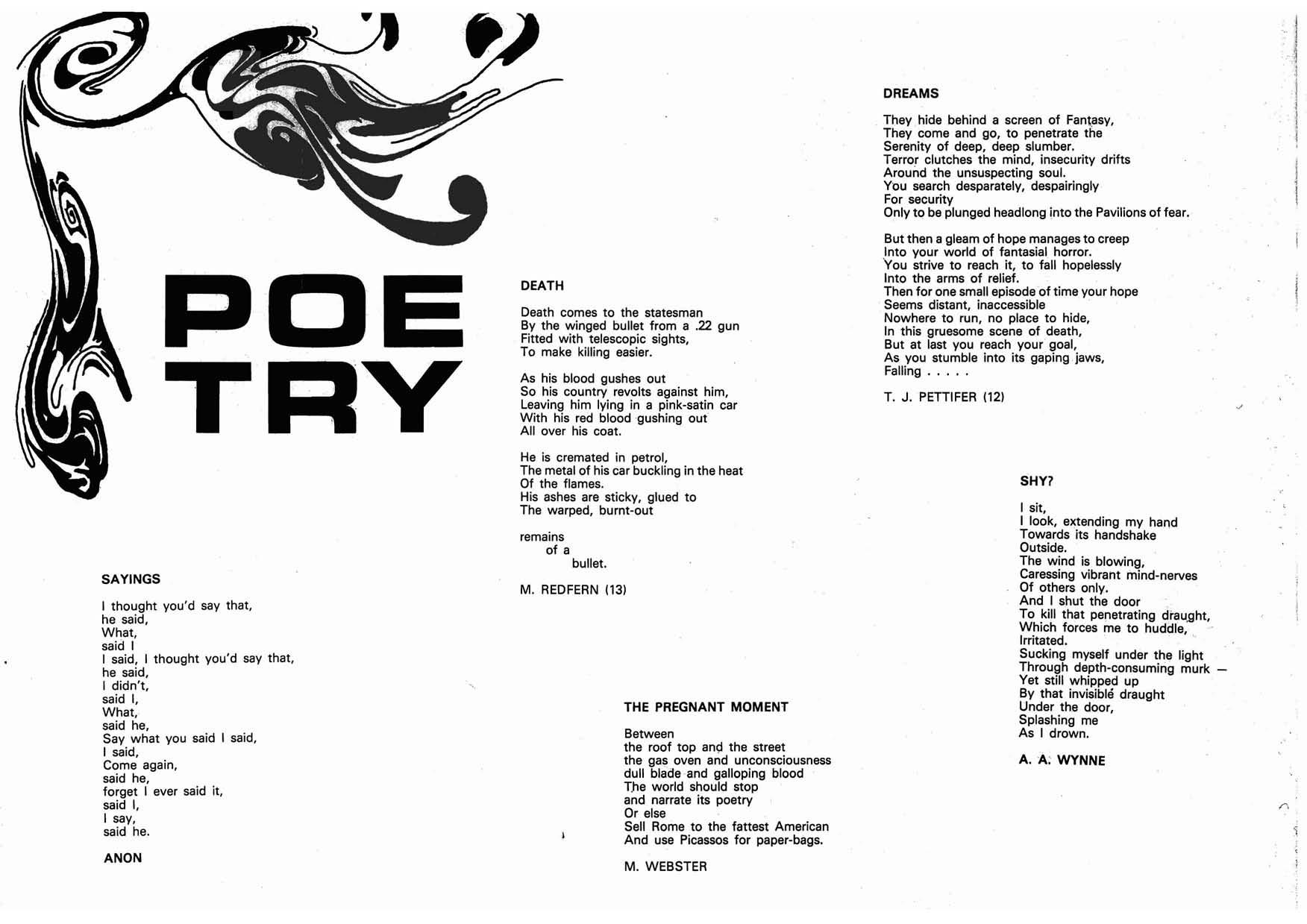
M. REDFERN (13)
Between the roof top and the street the ga:; oven and unconsciousness dull blade -and galloping blood T,he world should stop and narrate its poetry Or else Sell Rome to the fattest American And use Picassos for paper-bags.
M. WEBSTER
They hide behind a screen of
They come and go, to penetrate the
Serenity of deep, deep slumber. Terror clutches the mind, insecurity drifts Around the unsuspecting soul.
You search desparately, despairingly For security
Only to be plunged headlong into the Pavilions of fear.
But then a gleam of hope manages to creep Into your world of fantasial horror.
You strive to reach it, to fall hopelessly Into the arms of relief.
Then for one small episode of time your hope Seems distant, inaccessible Nowhere to run, no place to hide, In this gruesome scene of death, But at last you reach your goal, As you stumble into its gaping.jaws, Falling
T. J. PETTIFER (12)
I sit, I look, extending my hand Towards its handshake Outside.
The wind is blowing, Caressing vibrant mind-nerves Of others only. And I shut the door
To kill that pefletrating drau,ght, Which forces me to huddle, Irritated.· .
Sucking myself under the light Through depth-consuming murk Yet still whipped up By that invisible draught Under the door, Splashing me As I drown.
A. A: WYNNE

The mosquito, like dust in the river of air from my window,
In the stillness of glinted in the. sun.
Motion-less warmth
Lying, fragile aged creature and fluttering as eyelid. . Origins prehistoric time lost ages past
delicate as spider's web, it is,
An eye almost staring a prima ballerin·a, really; spinning in a spotlight
Watches a hand move of sun. And on a backcloth of blue. Gone
Just like that
wings arced in the air
The body moved and was hid a markova; lay on the ground, body pushed forward,
Almost as a whip's recoil. curving the air, wings oval, and articulate as veined
.A body small, light, strong leaf,
A skin of scales she was.
rough j)S spilt sand beautiful - and dead,
Yet smooth -she was
Somehow a wonder in itself.
The cold now here
No more to be seen
A creature l' A remains
A remiriderof an age now past
The reptiles
Rule of the great lizards
Now just this
A reminder.
M. G. L1SSIMORE (14)
Curtain.
Claps.
C. HALL-PATCH. (13)
Cool cat, Cool cat
Where have you been
'i've ·been uP to London man to like, dig the scene,
I've tripped with the bummers,
I've sped with the same,
Bryziciz was a Martian cat who travelled in a saucer, but hey man just listen He miawed in foreign accents, and his tones grew low and hoarser. I've come baclt-again.
You can keep all your acid, your
Three eyes were slightly missing, he's only got four left, grass and cocaine
I once was a junkie but· nElVer again.
For he's tried to stop a Jovian from huge galactic theft. ,.
For twenty thousand years or more, he zoomec;l around in space, I've pushed and I've peddled
While crew computed data re: earth and the human race. but never again, .,
The drug scene's a bad one
Bryziciz had a small glass dome affixed onto his head, It'll drive you insane.
And through this apparatus he breathed and also fed.
ANON R.-J. SMITH (12)
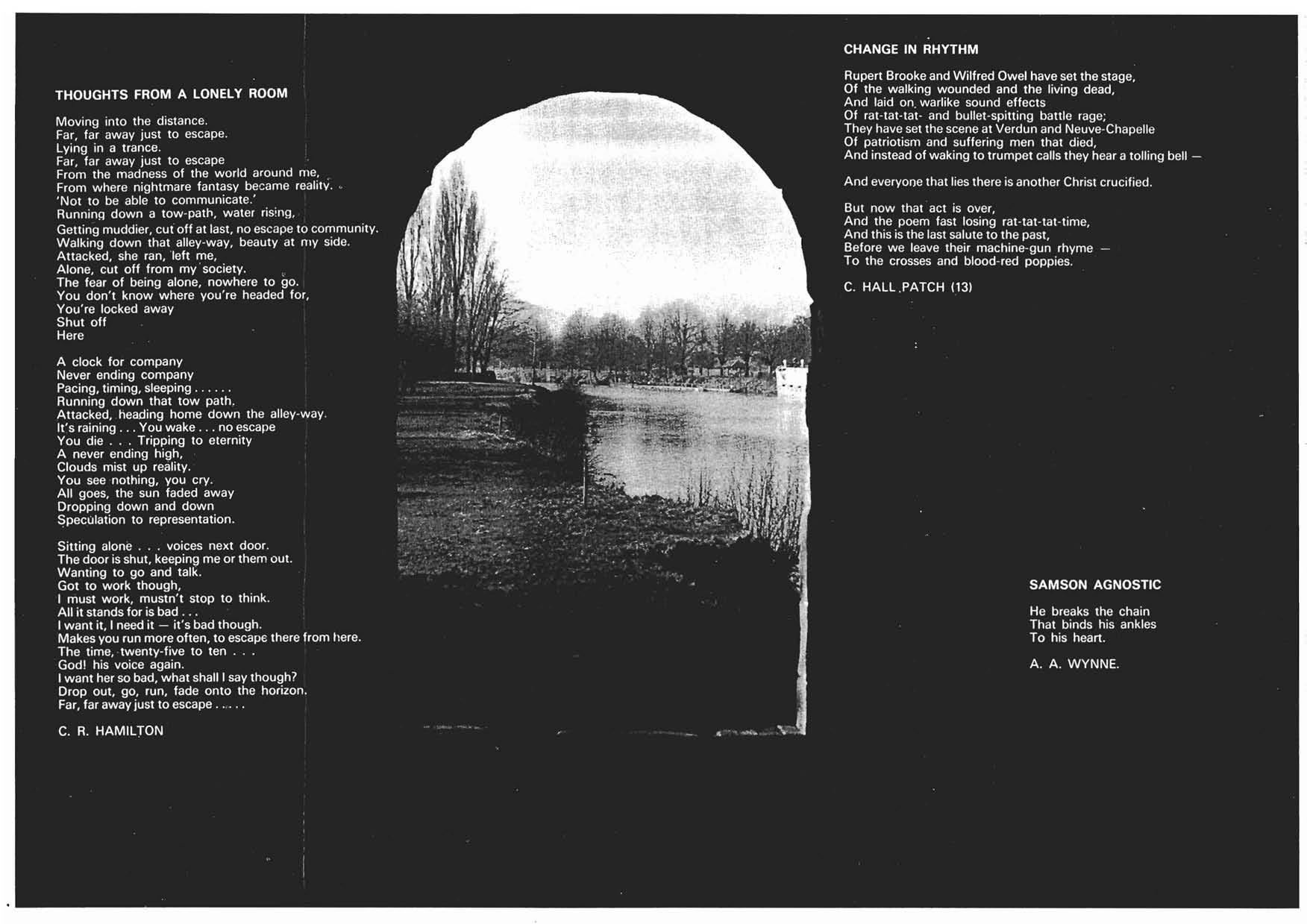

'Es always a sittin' on them steps an' chewin' on a stalk of grass, An' 'baccy.
An' 'is chin-stubble, dewed, like grass, in lazy sweat, Glint at the whip of the sun. His felt hat sitting gen'ly on the back of his headHim doin' nothin' while I'm a feeding the hens, Clucking an' a-chatt'rin' 'round me.
'E don't never seem te git no older, 'Ejus' sits there chewin' all the time, like a cow champin', Ain't never no older, While I'm agin' and workin' Wish I could work at chewin' straws an' baccy.
C. HALL PATCH (13)
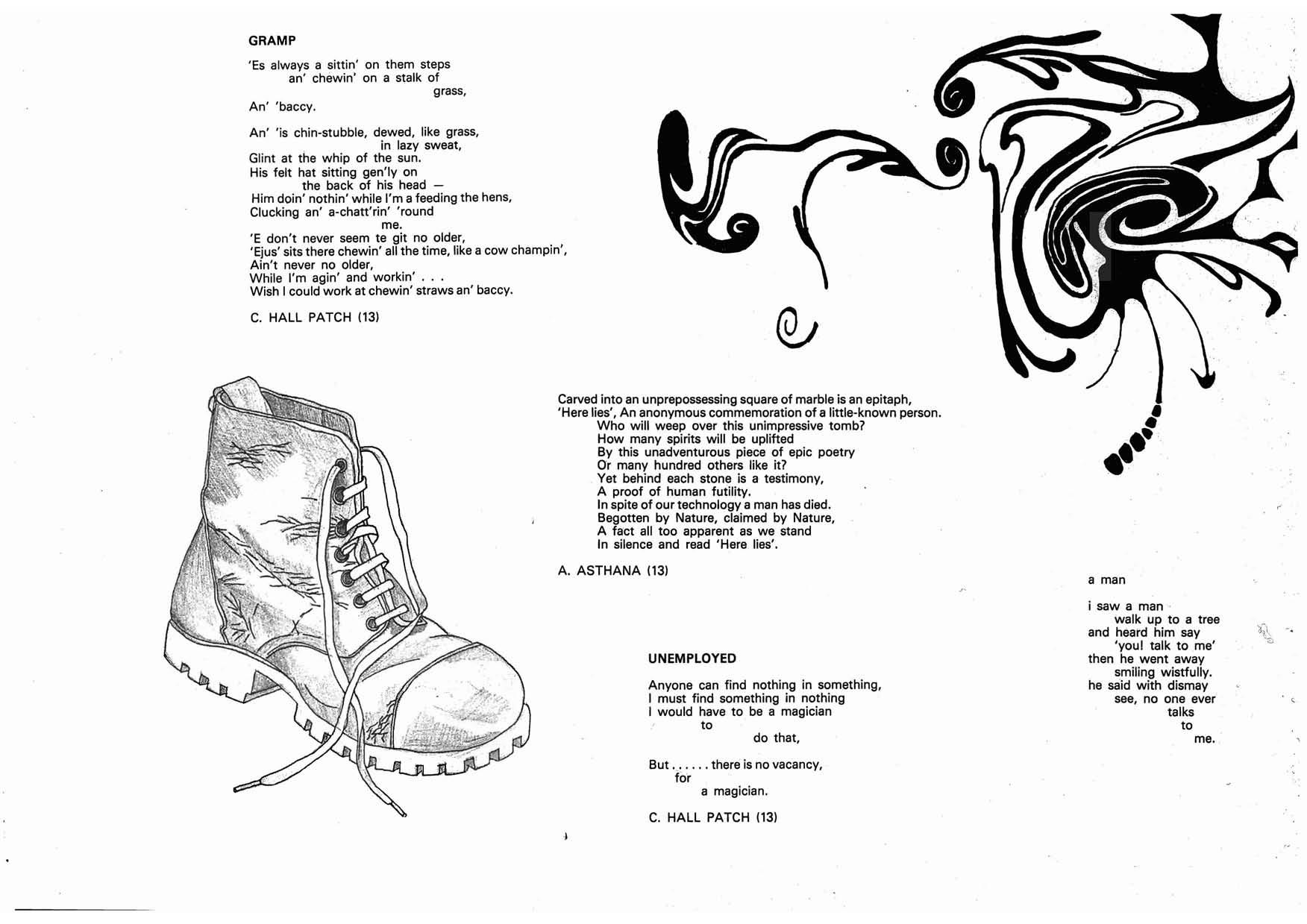
Carved into an unprepossessing square of marble is an epitaph,
'Here lies', An anonymous commemoration of a little-known person. Who will weep over this unimpressive tomb? How many spirits will be uplifted By this unadventurous piece of epic poetry Or many hundred others like it? Yet behind each stone is a testimony, A proof of human futility. In spite of our technology a man has died. Begotten by Nature, claimed by Nature, A fact all too apparent as we stand In silence and read 'Here lies'.
A. ASTHANA (13)
Anyone can find nothing in something, I must find something in nothing I would have to be a magician to do that, But there is no vacancy, for a magician.
C. HALL PATCH (13)
.t.I
a man
i saw a maniNalk up to a tree and heard him say 'youl talk to me' then he went away smiling wistfully. he said with dismay see, no one ever talks to me.

heightened heiroglyphics hurtle headlong from out of the ether wind with ever-burning sulphur yet unconsumed exploding into sintered rainbow orbs melting into viscous vapour sweet yet to jam the corridors of power through which the endless stream of conscious ambiguosity flows to end in regimented disharmony metallic monks in plastic habits trudge for ever over gored remains ever seeking to assuage their
lust for dreary vengeance the blood runs white frozen yet flowing from the caverns of ice within the sepulchre housing the deaf dumb paralysed cadaverous relic which swells and heaps into a pile and all the spirit flows out as a volcano flowing across the plain to infinity sweepint all before in one great wave of tumult and destruction scouring deep upon the peace of that great place while the sun high up above swells to an ellipse then parts to join and meet the horizon while the moon rolls round the compass of the psyche gyrating wildly metamorphosed to a cuboid cube which drops apart and vanishes to a point thixotropic under the cosmic power that melts the scyphus of death so the bloody wine surges forth pulsating aegir-like
washing over the pre-stressed ferro-concrete plastic floor to dissolVe all the petroglyphs to witches oils . that boil fume smoke vapourise and sublimate amid the havoc wroguht by this uncontrollable power this devastating energy this force that now ebbs away across the rubble strewn floor
to reveal the cause the creator of. this effect
P. R. J. HARDYMAN
I lay in the sky, glory all around me, Who am I?
Raspberry jam with strawberry trees, Pity walked by, "You will die, you will diel" "Die?" said I, "Why?"
No answer, so I swam for my life in the monstery waters of Hell. Sun I
The sun shone and I froze, So cold was 1 that the sweat, Like water bubbiing out of springs, flew from me. I dived down to the tips of Mt Everest, So low was I, High up in the sky, "Who am I?"
Sorrow walked by, "I mourn for thee, fly in the sea," I fell
They closed in on me c- Help!. Help!. HELP!. "Play little children," said a voice, "play in the fields." I played in the beautiJul red grass; "Red?" said I, "Why?" "Playl"
A baby cried,
So I ran so fast that I flew; flew? Flew by, did I, "Who am I?" Madness walked by, "Your mind will diel" Mind? Die? Why? I fought my mind, I fought it helplessly, Like a baby I fought in vain. But what just rode by, a plane? in vain, Crashl
My mind crashed down to Heaven without me, No mind had I, why? "Speak, boyl" said Heaven. "Speak?" said I, "I have no mind." "Stupid boy! Don't cry." Who am I? Who am I? Who am I? Anger walked by, "Your love for us will die," My love for them? Die? why? I hated myself,
Hate! Hatel HATE! flew by, Please, who am I?
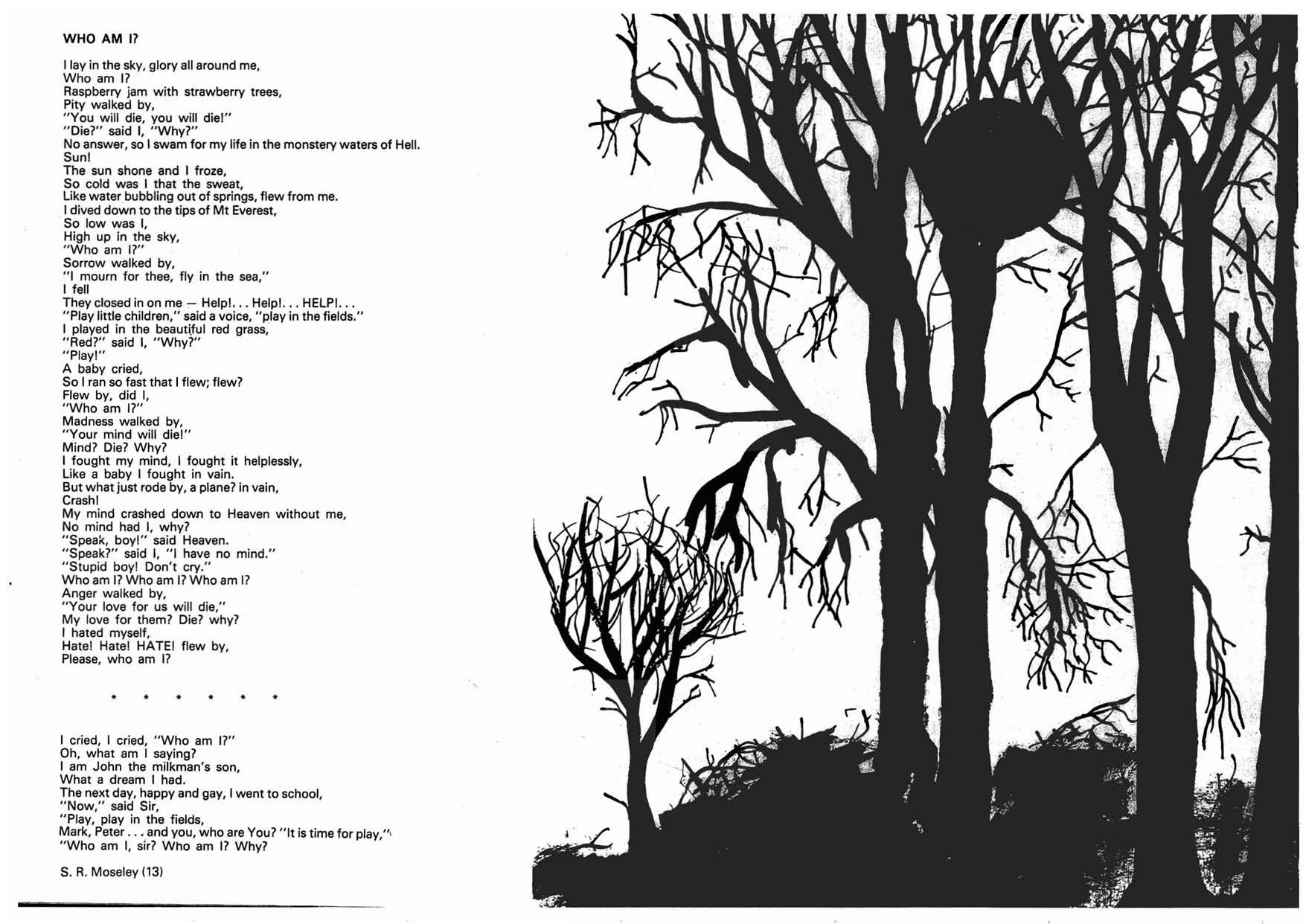
I cried, I cried, "Who am I?" Oh, what am I saying? I am John the milkman's son, What a dream I had.
The next day, happy and gay, I went to school, "Now," said Sir, "Play, play in the fields, Mark, Peter .. ,.and you, who are You? "It is time for play,'" "Who am I, sir? Who am I? Why?
S.
R. Moseley (13)
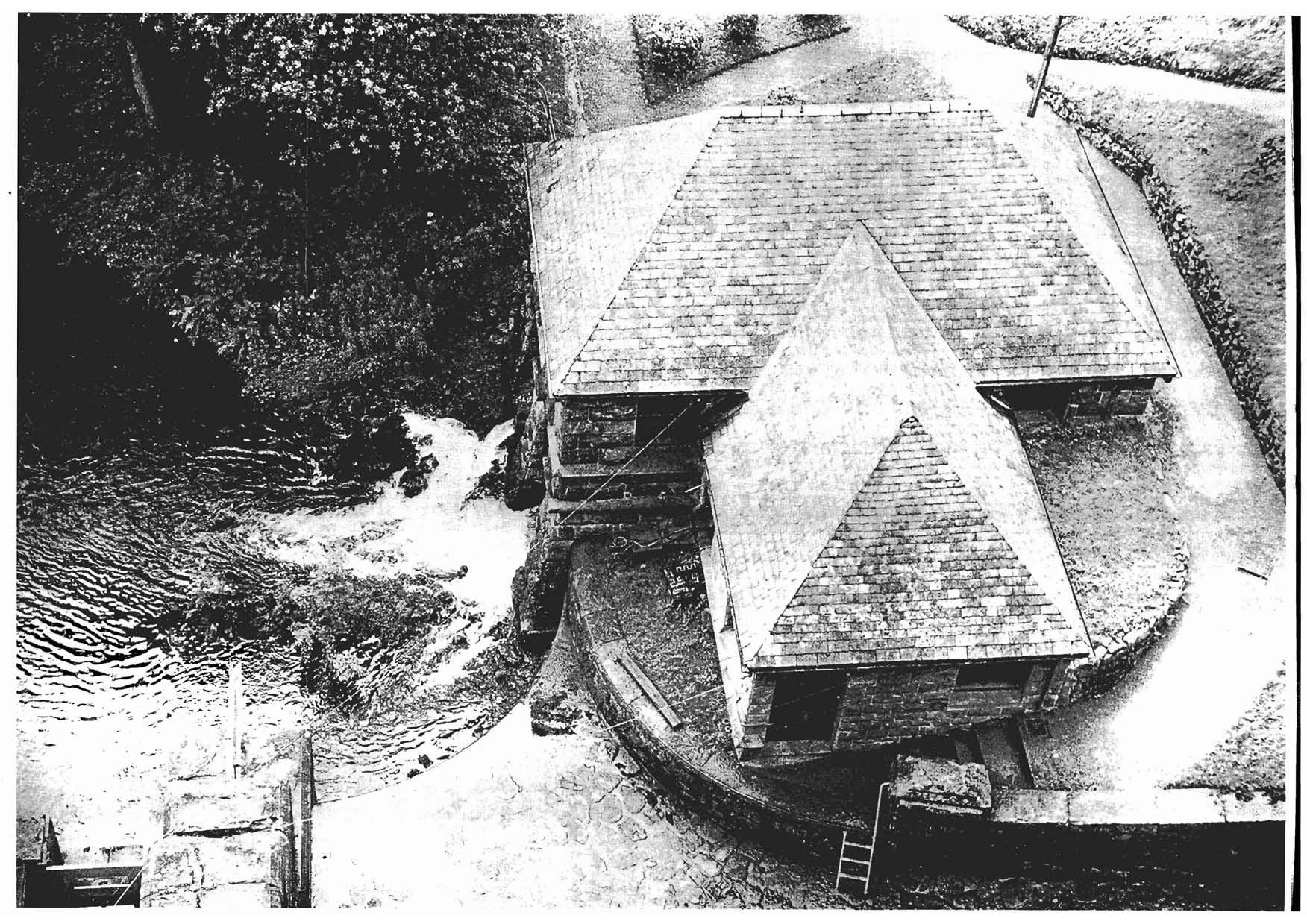
Friday JUNE 16th 1972 - ANNUAL BALL in College Hall.
SATURDAY JUNE 17th 1972
O.V. Cricket Match v. The School Tennis and Swimming ANNUAL GENERAL MEETING ANNUAL DINNER in College Hall.
SUNDAY JUNE 18th 1972
MATTINS at 10.30 a.m. in The Cathedral Noon - Mrs. Annett - At Home at 14 College Green.
O.V's are once again asked to make a note of these dates and to make early application when they receive the Spring Circular.
The arrangements for the 1971 weekend were apparently appreciated by all O.V's who returned to Worcester, and it was gratifying that there was an increase in numbers at both the Dinner and the A.G.M., which, although a comparatively short meeting always helps to keep members in touch with the Association.
The fact that we were able to hand over £40 for the Organ Fund as a result of the Raffle at the Ball, once again proves the success of this event.
At the A.G.M. we welcomed John Folley (1933/1939) as our new President. After thanking the Club for his election he spoke of the great amount of work his predecessor, Canon Craze had done during his three years in Office, not only as President of the O.V. Club, but also as Chairman of the School Development Campaign. The members wished to provide a memorial to the late J. B. Cavenagh, and it is hoped to obtain seats for the Pavilion. Michael Knapp Fisher informed the meeting that the London Section intended running another Dinner in April 1972 and suggested that members be asked to bring their wives and friends. This will be a new venture and it met with the approval of all present.
At the Annual Dinner we were delighted that the Bishop of Worcester, the Rev. Robin Woods, was able to be with us as 'our Chief Guest. In-a very interesting reply on behalf of the Guests he made it quite clear that the School and the O.V. Club had found a new and sincere friend.
After Mattins, at which the sermon was preached by Preb. W. R. Ghignell . (1923125) we again enjoyed the hospitality of the Headmaster and Mrs. Annett. It is with regret that we learn that the Bursar, Group Capt. T. A. F. Elsdon is leaving the School in December. He has always given such great help to the O.V. Club and we shall always appreciate the untiring efforts he has put in to ensure the smooth and efficient running of our events within the School.
Once again we offer our congratulations to the school on its high academk results, and send our good wishes to all O.V's who are about to embark on a course of higher education.
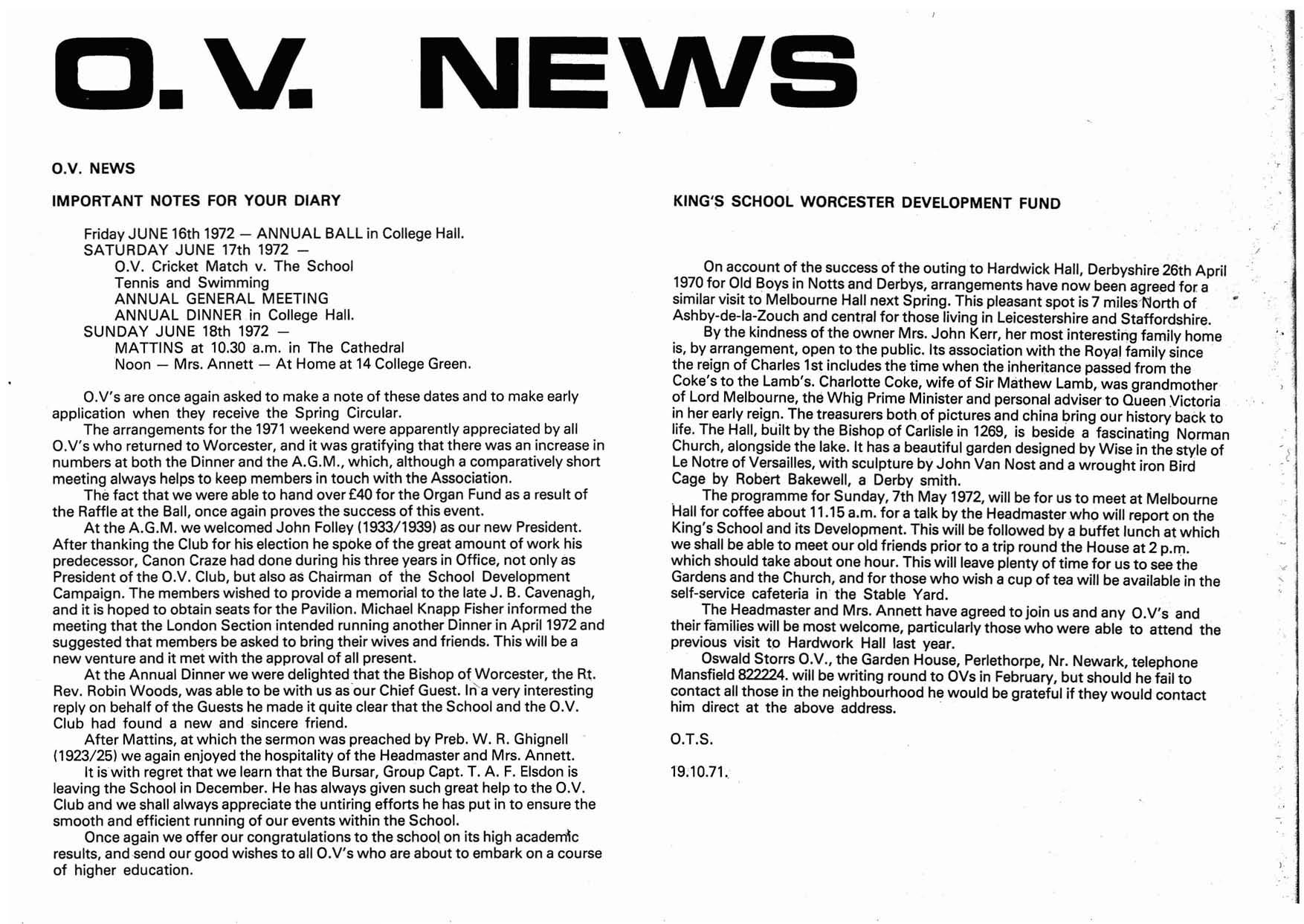
On account of the success of the outing to Hardwick Hall, Derbyshire 26th April 1970 for Old Boys in Notts and Derbys, arrangements have now been agreed for a . similar visit to Melbourne Hall next Spring. This pleasant spot is 7 miles'North of Ashby-de-Ia-Zouch and central for those living in Leicestershire and Staffordshire. By the kindness of the owner Mrs. John Kerr, her most interesting family home is, by arrangement, open tothe public. Its association with the Royal family since ' the reign of Charles 1st includes the time when the inheritance passed from the Coke's to the Lamb's. Charlotte Coke, wife of Sir Mathew Lamb, was grandmother of Lord Melbourne, the Whig Prime Minister and personal adviser to Queen Victoria in her early reign. The treasurers both of pictures and china bring our history back to life. The Hall, built by the Bishop of Carlisle in 1269, is beside a fascinating Norman Church, alongside the lake. It has a beautiful garden designed by Wise in the style of Le Notre of Versailles, with sculpture by John Van Nost and a wrought iron Bird Cage by Robert Bakewell, a Derby smith.
The programme for Sunday, 7th May 1972, will be for us to meet at Melbourne Hall for coffee about 11.15 a.m. for a talk by the Headmaster who will report on the King's School and its Development. This will be followed by a buffet lunch at which we shall be able to meet our old friends prior to a trip round the House at 2 p.m. which should take about one hour. This will leave plenty of time for us to see the Gardens and the Church, and for those who wish a cup of tea will be available in the self-service cafeteria in the Stable Yard.
The Headmaster and Mrs. Annett have agreed to join us and any O. V's and their families will be most welcome, particularly those who were able to attend the previous visit tp Hardwork Hall last year.
Oswald Storrs O.V., the Garden House, Perlethorpe, Nr. Newark, telephone Mansfield 822224. will be writing round to OVs in February, but should he fail to contact all those in the neighbourhood he would be grateful if they would contact him direct at the above address. '
O.T.S. 1'9;10.71.
WHITE A.G. (C.52/60) and Elaine, a daughter, Kathryn, on October 3rd 1970 at Rochester Maternity Unit, Victoria, Australia.
ENGAGEMENTS
DAVIES N. W. (Sc.59/63) to Miss aadrienne Hartington of Hale, Cheshire, in 1970 - to be married in September, 1971.
MARRIAGES
WRIGHT A. J. (Cr.57/65) to Miss Elizabeth J. Wright of Wychbold, Droitwich. SMITH N. S. (W.56/66) at Martley, to Miss Susan Mary Bufton, in December 1970.
VINCENT R. A. (Cr.52/62) on 12th June 1971 to Miss Hazel Ruth Perkins of Wor cester.
BYRNE C. J. (56/66) to Miss Judith Frances Whyte M.A., of Glasgow.
FERRA,R M. (Crown.53/63) in Geneva on May 19th to Ursula Rochat.
HARPER M. W. (C.53/64) on April 13th 1971 at Claines Church, to Miss Carol Thorne of ledbury.
DEATHS
COlES J.C.'B. (50/55) died February 26th 1971.
NATAN Heinz Alex (Master 44/67) January 14th 1971.
GRAVES MORRIS H.W. (1890/94) 1970 two days after his 94th birthday. He was the oldest Vigornian and had the interest of the School greatly to heart, and up to a few years ago regularly attended all O.V. Functions.
lORENZ F.M.l.{S 43/47)died 'April2nd 1971, at the age of 41. Appointed Acting Headmaster of Gordano School, Portishead in 1964 on the death of the Headmaster, he was appointed Headmaster in 1965 when.the school became comprehensive. He leaves a widow and- four children aged from nine to three.
ANGWIN Col. J.P.B., M.B.E., (15/18) died in Cornwall in 1970. RAMMEll Miss, K.M. died 4th June 1971 at the age of 94.
ANDERTON Chris (Cr.58/64) Since getting married in 1970 at Shenstone, Nr. Lichfield,' he has been working for the Imperial life of Canada as Life Assurance Underw'riter. Chess has slipped from a career to a hobby. However, he writes a weekly chess column in the Lichfield Mercury and is secretary of the reformed Lichfield Chess Club.
ATKINS R. (C.57/67). The I.C.I Mechanical Engineering Vacation Scholarship which he won after his first year at Durham University kept him busy during the summers of 1969 (at Billingham) and 1970 (in Germany). His chief extra-curricular interest has been the Durham Union Society, of which he was elected President for his final term. After taking his finals he worked on a project entitled In vestigation of the Encoding Techniques for Stereo Transmission". ,Of other O.V's in Durham, Bob Sinclair was Rugger President this year, Barni Holbeche spends most of his time on the fiver, Gordon teaches in a local school (Musi:c) and Peter Hewitt is now also reading Music here.

BUSHBY D.R.P. (C.45/52).After spending five years in the R.A.M.C. he retired with the rank of Major in 1969. He then sp'ent-five months renovating an old cottage on the Isle of Mull, which is to be a haven of rest in the years to come! From Mull he to Perth f,or a year and has entered partnership in the Perthshire village of Comrie. He has a family of two boys arid one girl.
BYRNE C.J. (Cr.56/66). Graduated Oxford University in 1970 with First Class Honours in Chemistry. Staying there to do a D. Phil.
BYRNE R.J. (Cr.59/69)' After a five months trek travelling through Scandinavia, Germany, Austria, Yugoslavia, Greece, Cyprus and Israel, is taking a Teacher Training Course at Nottingham College of Education ..
BROOKS P.C. (CI.54/61). Qualified as a Chartered Accountant in 1968 and is now employed as Management Accountant with Morganite Crucible Ltd. at Norton after two years with Cooper Bros. in Birmingham. Married with one daughter, but still finding time for Cross Country running despite these handicaps!
BAilEY G.D. Maj. (CI.43/54). Is now commanding a Field Squadron Royal E,ngineers as part of Strategic Reserve. The Unit returned from Anguilla in March 1970, spent four months emergency tour in N.lreland ·from Aug/Dec., 1970 and they expect to be there for another/four months this summer. He was married in 1966 met his wife in Malaya and they now' d.aughters.
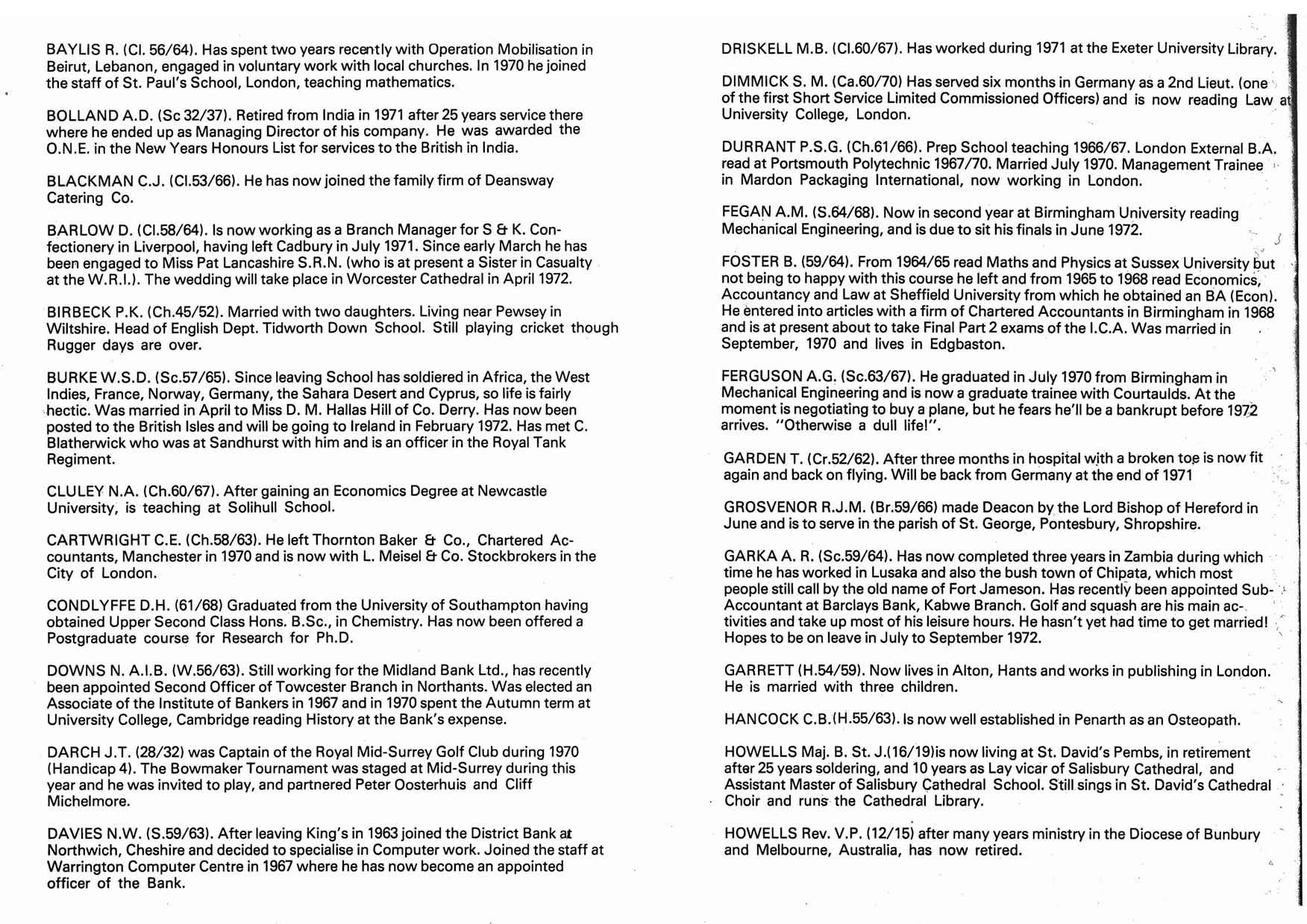
BAYLlS R. (Cl. 56/641. Has spent two years recently with Operation Mobilisation in Beirut, Lebanon, engaged in voluntary work with local churches. In 1970 he joined the staff of St. Paul's School, London, teaching mathematics.
BOLLAND A.D. (Sc 32/371. Retired from India in 1971 after 25 years service there where he ended up as Managing Director of his company. He was awarded the O.N.E. in the New Years Honours List for services to the British in India.
BLACKMAN C.J. (CI.53/66). He has now joined the family firm of Deansway Catering Co.
BAR LOW D. (CI.58/64l. Is now working as a Branch Manager for S & K. Confectionery in Liverpool, having left Cadbury in July 1971. Since early March he has beel"1 engaged to Miss Pat Lancashire S.R.N. (who is at present a Sister in Casualty at the W.R.I.). The wedding will take place in Worcester Cathedral in April 1972.
BIRBECK P.K. (Ch.45/521. Married with two daughters. Living near Pewsey in Wiltshire. Head of English Dept. Tidworth Down School. Still playing cricket though Rugger days are over.
BURKE W.S.D. (Sc.57/65). Since leaving School has soldiered in Africa, the West Indies, France, Norway, Germany, the Sahara Desert and Cyprus, so life is fairly hectic. Was married in April to Miss D. M. Hallas Hill of Co. Derry. Has now been posted to the British Isles and will be going to Ireland in February 1972. Has met C. Blatherwick who was at Sandhurst with him and is an officer in the Royal Tank Regiment.
CLULEY N.A. (Ch.60/671. After gaining an Economics Degree at Newcastle University, is teaching at Solihull School.
CARTWRIGHT C.E. (Ch.58/63). He left Thornton Baker & Co., Chartered Accountants, Manchester in 1970 and is now with L. Meisel & Co. Stockbrokers in the City of London.
CONDLYFFE D.H. (61/68) Graduated from the University of Southampton having obtained Upper Second Class Hons. B.Sc., in Chemistry. Has now been offered a Postgraduate course for Research for Ph.D.
DOWNS N. A.I.B. (W.56/63). Still working for the Midland Bank Ltd., has recently been appointed Second Officer of Towcester Branch in Northants. Was elected an Associate of the Institute of Bankers in 1967 and in 1970 spent the Autumn term at University College, Cambridge reading History at the Bank's expense.
DARCH J.T. (28/32) was Captain of the Royal Mid-Surrey Golf Club during 1970 (Handicap 4). The Bowmaker Tournament was staged at Mid-Surrey during this year and he was invited to play, and partnered Peter Oosterhuis and Cliff Michelmore.
DAVIES N.W. (S.59/63). After leaving King's in 1963 joined the District Bank at Northwich, Cheshire and decided to specialise in Computer work. Joined the staff at Warrington Computer Centre in 1967 where he has now become an appointed officer of the Bank.
DRISKELL M.B. (CI.60/67), Has worked during 1971 at the Exeter University Library.
DIMMICK S. M. (Ca.60nO) Has served six months in Germany as a 2nd Lieut. (one ') of the first Short Service Limited Commissioned Officers) and is now reading Law a University College, London. .
DURRANT P.S.G. (Ch.61/66). Prep School teaching 1966/67. London External B.A. read at Portsmouth Polytechnic 1967/70. Married July 1970. Management Trainee " in Mardon Packaging International, now working in London. '
FEGAN A.M. (S.64/68). Now in second year at Birmingham University reading Mechanical Engineering, and is due to sit his finals in June 1972. J
FOSTER B. (59/64). From 1964/65 read Maths and Physics at Sussex University not being to happy with this course he left and from 1965 to 1968 read Economics, , Accountancy and Law at Sheffield University from which he obtained an BA (Econ). He entered into articles with a firm of Chartered Accountants in Birmingham in 1968 and is at present about to take Final Part 2 exams of the I.C.A. Was married in September, 1970 and lives in Edgbaston.
FERGUSON (Sc.63/671. He graduated in July 1970 from Birmingham in Mechanical Engineering and is now a graduate trainee with Courtaulds. At the moment is negotiating to buy a plane, but he fears he'll be a bankrupt before 197..2 arrives. "Otherwise a dull Iifel".
GARDEN T. (Cr.52/62). After three months in hospital w.ith a broken tol" is nowfit again and back on flying. Will be back from Germany at the end of 1971
GROSVENOR R.J.M. (Br.59/66) made Deacon by, the Lord Bishop of Hereford in June and is to serve in the parish of St. George, Pontesbury, Shropshire.
GARKA A. R. (Sc.59/64). Has now completed three years in Zambia during which " time he has worked in Lusaka and also the bush town of Chipata, which most people still call by the old name of Fort Jameson. Has recently been appointed Sub-,t Accountant at Barclays Bank, Kabwe Branch. Golf and squash are his main activities and take up most of his leisure hours. He hasn't yet had time to get married! '," Hopes to be on leave in July to September 1972. '
GARRETT (H.54/591. Now lives in Alton, Hants and works in publishing in London. He is married with three children.
HANCOCK C.B.(H.55/63).ls now well established in Penarth as an Osteopath.
HOWELLS Maj. B. St. J.(16/19lis now living at St. David's Pembs, in retirement after 25 years soldering, and 10 years as Lay vicar of Salisbury Cathedral, and Assistant Master of Salisbury Cathedral School. Still sings in St. David's Cathedral Choir and runs the Cathedral Library.
HOWELLS Rev. V.P. (12/15) after many years ministry in the Diocese of Bunbury and Melbourne, Australia, has now retired.
HARTLY M.W. (48/54). Still enjoying employment with the Metal Box Co., Ltd., in London and has now completed 10 years with them. Has been married for seven years and has a son aged 4 and a daughter 2.
HARKER R.J. (W.65/681. Two years still to go on the Applied Biology course at Salford University. Married Alison Baker (an old Alice Ottleian) in July 1971 and will always welcome any contact from other O.V's which can be made via the University Biology Dept.
HARPER M.W.(C053/64). Still working for Lloyds Bank and is at present in the Securities and Overseas Dept. of Stafford Branch.
HARIS K.T. (48/53) has been appointed Plant Sales Manager with Metal Castings Doehler Ltd., Worcester.
HAMAND M. (H.51/59). Squeezing a living as photograph/artist and living in . Pimlico. Subsidises existence as night telephone operator overseas Section with the G.P.O.
HOLDEN N.H. (S.50/58) writes from New Zealand, where he is working for Chemical Service Laboratories of Johnsonville, Wellington. His tours have covered the whole of North and South Islands; he recently met Basil Parsons (Ca.51-55) who is working for the Shell Oil Co. in Auckland.
JONES L.D. (CI.48/531. Now Manager of Barclays Bank, Newcastle under Lyme. Married with two daughters 4 Y2 and 3 years.
JONES M. M. (48/51) Elected a F.R.I.B.A. in 1970 and now a senior partner in the .firm of Rowe, Elliott and Partners. Has served on the cpmmittee of the Worcester Civic Society for several years and is Treasurer of the Worcs. Society of Architects. Married Miss Ann Kayof Lythm St. Annes in 1962 and has three sons.
JERRAM A.L.O. (Cr.50/55) Still in the Army. Now serving on the staff at H.Q. British Army of the Rhine in Germany. "Has met Terry Cosgrove.
JERRAM J.J. (CI.50/58). Was transferred to Portugal in 1969. Is still in Accountancy. Now has three daughters.
JERRAM T.C; (Cr.52/61). Is Registrar of a Dublin Hospital and a Clinical Tutor at Trinity College, Dublin. Family - subject to amendment at any minute - is a son.
KITCHING C.D. (S.64/691. Has now left University and is at present programming computers in London.
KIRK M.J. (Ca.58/631. At present working in Sweden for the Marconi Co. Ltd. engaged in the installation of the Swedish T.V.2 (V.H.F.) network. Has been there since Jan. 1969 and is hoping to return to England sometime in 1971.
KING A.A. (Cr.56/65) Graduated from Royal Military College of Science Shrivenham with a Pass degree in Electrical Engineering.
KEENE J.M. (Br.60nO). Is now working for Barclays Bank and will shortly be moving to Warwickshire. Is married with a 6 month old daughter.
LUMSDAINE A.M. (1910/12). He is Regimental historian for the Royal Monmouthshire (Militia) which he finds very fascinating.
MOORE S.M. (38/42). Very involved in local Government in the North Cotswolds. Serves on the Board of Governors of Chipping Campden Comprehensive School and the Management Board of other Schools.
PREECE DR. P.B. (Se 57/63) has now returned to England from Australia on completion of Ph.D. course at· National University, Canberra.
PREECE Dr. Paul E. (Sc.52/59) is now a Registrar at St. Woollos Hospital, Newport,
PARSONS B.R. (Ca.51/55) is now living in··New Zealand just outside "
PHILlPS G.L. (Cr.61-65) Qualified 1970 Royal Institute of Chartered Surveyors. Now employed with Worcs. County Council Land and Valuation Dept. (having served articles with Messrs. Doorbar, Mapp Chartered Surveyors).
POTTON C.S. (H.51/59) Recently returned after two-year post P.h.D. lecturing and in U:.S.A. Now living in Manchester and married with two children.,
RICHARDS M. (Br.53/61), On leaving School he joined the Police in Rhodesia. He was runner-up in the B.S.A. Police Middleweight Championship in 1965, became middleweight Champion in 1966 and 1967 and heavyweight Champion for the next
!, two years. On returning to England he was commissioned in the RAF Regiment in ·1970, and has won the R.A.F. Middleweight Boxing Championship.
ROBINSON K. (Sc.62/68) was invited to attend a reception by the Lord Mayor of Birmingham in connection with his gaining the Duke of Edinburgh Gold award. He was also invited to Buckingham Palace on December 16nO when he received the award from Prince Philip.
ROWLlNG M.S. (H.52/58). Has now gone into partnership with two others and shares the running of Culworth Engineering. Besides agricultural repair work they
have been doing work for Post Office Engineering Dept. and the Potato Marketing Board.
RYDER C.J. (Cr.58/68). completed a course at Worcester College of Education is teaching at Atherstone High School in Warwickshire.
SKELLERN C.J. (Br.61/68). Has been selected as Captain of the British down-river" racing team in the wild canoe Championships at Merano, Northern Italy. He will also be leading his team, later this year, at Muota, Austria, Bayerwald and Bavaria.
STORY P.J. (S.59/671. Suffering from Final year exams at Warwick University. Hoping to work for Phillips in Holand after Oct. 1971.
SAUNDERS R.S. (Cr. & W. 54/62). After five years is still working for Massey Ferguson in Coventry, making tractors, and attempting to alleviate the world's food problem - and his ownl Is now the proud father of Jwo boys and is living in Leamington Spa.

STEPHEN J.H. (CI.60/67). After obtaining a 2nd in Estate Management at Reading, now doing research in comparative new-town planning at Connecticut University.
SMITH D.K. (B.58/67). Graduated July 1971 from Cambridge Will be at University of Lancaster reading for an M.A. in Operational Research until Sept. 1972. Would be glad to hear from anyone involved in, or interested in this field.
STRONG, Archbishop P.N.W. On June 30th 1970 Philip Strong retired from the offices of Archbishop of Brisbane and Primate of Australia. He is now living at 11 Cathedral Close, Wangaratta, Victoria, Australia. He writes "The Close is a lovely and peaceful spot; Wangaratta is, I think, the only Cathedral in Australia that has a close on the English pattern." Although in retirement, he is much in demand for preaching, confirmations, etc.
THOMAS D.G.Eo (Ca.61/66). In 1970 was awarded his Associateship of the Royal Institute of Chartered Sutveyors.
THOMAS C.S. (Ca.63/68). In second year studying Law at the University of Kent, having returned from a period spent sheep farm,ng in New Zealand.
THOMAS R.E. (23126). Has just retired as second partner in a firm of Johannesqurg Stockbrokers and is now in England trying to decide where to settle down finally.
VINCENT R.A.(Cr.521621. Has now left the Worcs. Quarter Sessions Office and has taken up a post as Deputy to the Clerk to the Justices for the Worcester County Petty Sessional Division with special responsibility for the newly inaugurated Motorway Court sitting at Droitwich. fanatically keen on soccer and a member ofthe successful Worcester 1st Div. Cfub County Sports F.C.
WALKER M.G. (Ca61/65) Spentthree years at Worcester College of Education and qualified as a teacher in 1969. Had an abortive job in Libya at the time of the Revolution there in September 1969. Is now teaching in Cambridgeshire near Ely. Hopes to join the Army Education Corps.
WHITAKER A. (071/3). Since retiring from normal business and having studied medicine, has now for some years been in practice as a Homoeopath and Dietician, specialising in the treatment of rheumatism and kindred complaints, chest and skin disorders - treating in the main, patients who have been pronounced incurable, with, fortunately, a high degree of successl
WOLF-PHILLlPS L. (Cr.40/46). Has now been teaching at the L.S.E. for just over 10 years as Lecturer in Political Science. Secondary interest is in Law and has been recently awarded a London degree of LL.M., also reading for Bar at Lincoln's Inn. He kept in touch with Mr. Natan and last saw him on Christmas Day 1970 a few days before his death. He will always be pleased to see old O.V. friends or anyone coming to the L.S.E.
WRIGHT J. (Sc64/68). Is in his second year of Town and Country Planning at Newcastle University.
WILLlAMS B.J. (Cr.47/55) Cr.47/55) Continued an active interest in all sports especially Athletics. Ran in the R.A.F. Championships against most of the big name's ofthe day during National Service. Became'Worcs. Sprint Champion in 1959 and< was Berks. Sprint Champion for 5 years after moving to Windsor. Now married with two children. Recently appointed Headmaster of Windsor Primary School.
WHITE A.P. (CI58/65) Aftergraduating in Mathematics from the Lanchester Polytechnic, Coventry, is now a Systems Engineer with Int. Computers Ltd.
WADLEY L.G. (Cr.53/61). After working for the District Bank for 6 years during, which time he played rugger for Worcester, Worcs., Herefords, and the N. Midlands, and Cricket for the O.V's, he joined Barclays Bank, D.C.O. in 1967 and. went to work in Zambia where he spent 2 years. Worked in Lusaka (in same office as T. Senter and A. Garka) and Chililarnombire (a town near the Congo border) also . visited Rhodesia, S. Africa, Mozambique, Congo and Swaziland. Joined Inspection. Dept. of D.C.O. in Nov. 1969, and has since worked in the Sudan, Malta and at .' present (June 71) is in Ghana and should soon be moving to Nigeria. Was married to Miss Victoria Didcono of Sliema, Malta, in Jan. 1971 at the Church of the Sacred Heart and St. Catherine, Droitwich.
WILLlAMS K.S. Dr. (54/59) is Associate Professor of Mathematics at Carleton University, Ottowa. From July 1st 1971 he will be associate Chairman of the Department responsible for undergraduate studies. He and his wife Ca role have three children, two daughters and a son.
WADSWORTH T.M. (S.56/61). Graduated in Chemistry at Edinburgh University i(l 1964. Took up Medicine at Birmingham University and has just finished a House job there. Now holds a 5 year short service commission in the Royal Navy.
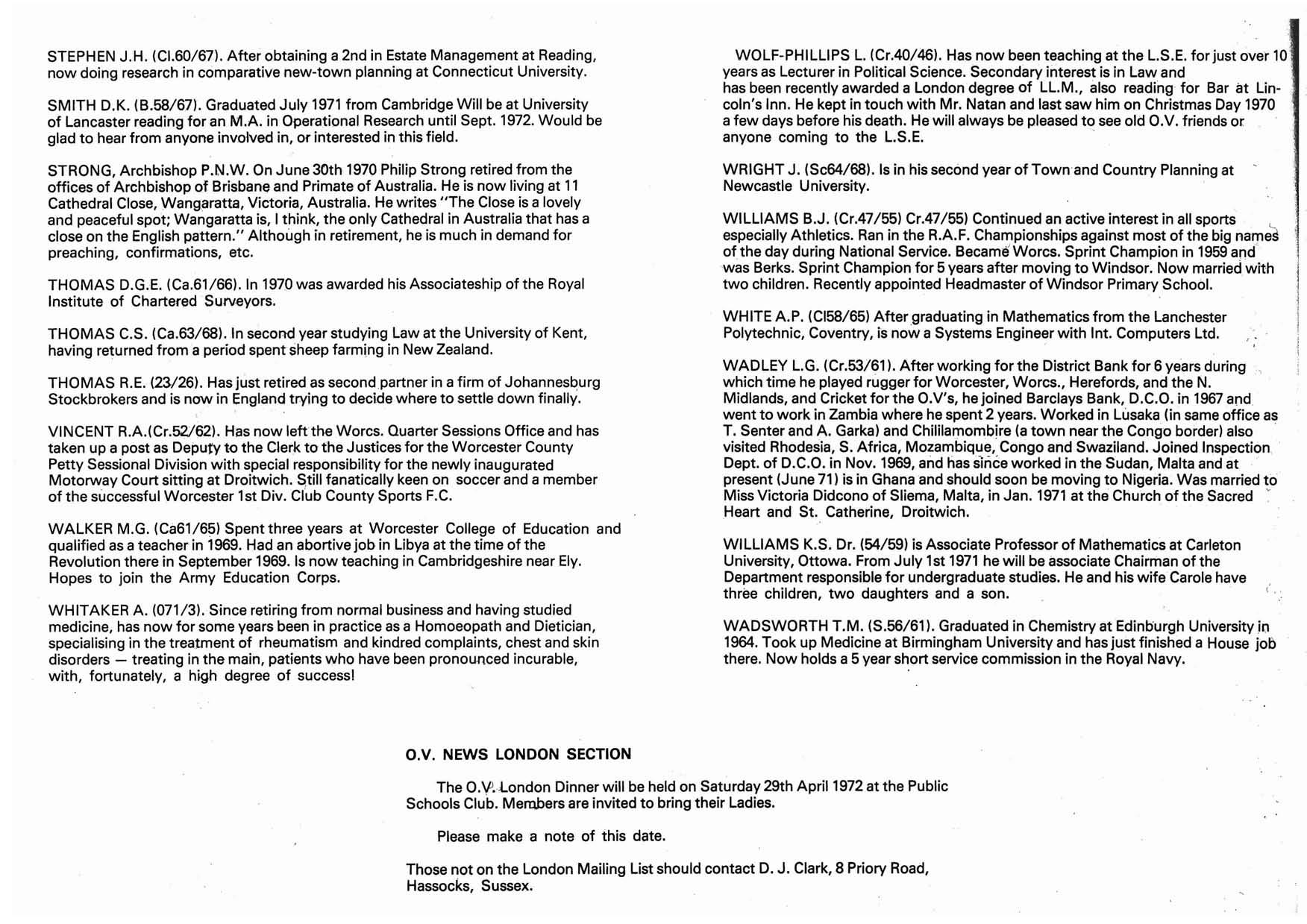
The O.'J!.-london Dinner will be held on Saturday 29th April 1972 at the Public Schools Club. Melt\bers are invited to bring their Ladies.
Please make a note of this date.
Those not on the London Mailing List should contact D. J. Clark, 8 Priory Road, Hassocks, Sussex.
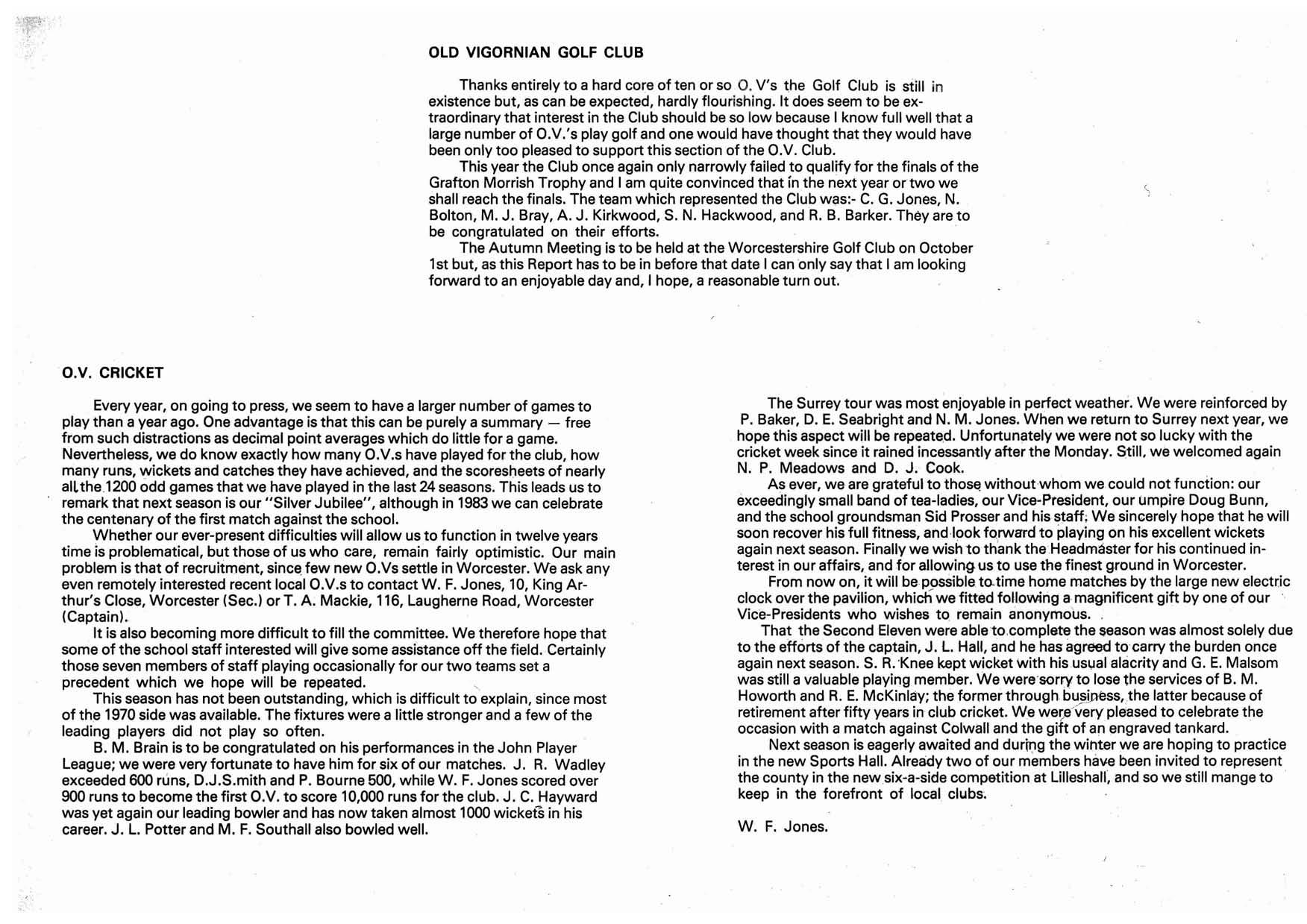
Thanks entirely to a hard core of ten or so O. V's the Golf Club is sfill in existence but, as can be expected, hardly flourishing. It does seem to be extraordinary that interest in the Club should be so low because I know full well that a large number of O.V.'s play golf and one would have thought that they would have been only too pleased to support this section of the O.V. Club.
This year the Club once again only narrowly failed to qualify for the finals of the Grafton Morrish Trophy and I am quite convinced that inthe next year or two we shall reach the finals. The team which represented the Club was:- C. G. Jones, N. Bolton, M. J. Bray, A. J. Kirkwood, S. N. Hackwood, andR. B. Barker. They are to be congratulated on their efforts.
The Autumn Meeting is to be held at the Worcestershire Golf Club on October 1st but, as this Report has to be in before that date I can only say that I am looking forward to an enjoyable day and, I hope, a reasonable turn out.
Every year, on going to press, we seem to have a larger number of games to
The Surrey tour was most enjoyable in perfect weather. We were reinforced by play than a year ago. One advantage is that this can be purely a summary - free P. Baker, D. E. Sea bright and N. M. Jones. When we return to Surrey next year, we from such distractions as decimal point averages which do little for a game. hope this aspect will be repeated. we were not so lucky with the Nevertheless, we do know exactly how many O.V.s have played for the club, how cricket week since it rained incessantly after the Monday. Still, we welcomed again many runs, wickets and catches they have achieved, and the scoresheets of nearly N. P. Meadows and D. J. Cook. allthe.1200 odd games that we have played in the last 24 seasons. This leads us to
As ever, we are grateful to those without whom we could not function: our remark that next season is our "Silver Jubilee", although in 1983 we can celebrate exceedingly small band of tea-ladies, our Vice-President, our umpire Doug Bunn, the centenary of the first match against the school. and the school groundsman Sid Prosser and his staff; We sincerely hope that he will
Whether our ever-present difficulties will allow us to function in twelve years soon recover his full fitness, and·look forward to playing on his excellent wickets time is problematical, but those of us who care, remain fairly optimistic. Our main again next season. Finally we wish to thank the Headmaster for his continued inproblem is that of recruitment, few new O.Vs settle in Worcester. We ask any terest in our affairs, and for aHowing us to use the finest ground in Worcester. even remotely interested recent local O.V.s to contact W. F. Jones, 10, King Ar
From now on, it will beP9ssible to.time home matches by the large new electr.ic thur's Close, Worcester (Sec.) or T. A. Mackie, 116, Laugherne Road, Worcester clock over the pavilion, which we fitted following a magnificent gift by one of our (Captain). Vice-Presidents who wishes to remain anonymous. . .
It is also becoming more difficult to fill the committee. We therefore hope that
That the Second Eleven were ableto.complete the season was almost solely due some of the school staff interested will give some assistance off the field.· Certainly to the efforts of the captain, J. L. Hall, and he has agreed to carry the burden once those seven members of staff playing occasionally for our two teams set a again next season. S. R. 'Knee kept wicket with hisusl,Jal alacrity and G. E. Malsom precedent which we hope will be repeated. was still a valuable playing member. We were'sorry to lose the services of B. M.
This season has not been outstanding, which is difficult toexplain, since most Howorth and R. E. McKinlay; the former through busjpess,the latter because of of the 1970 side was available. The fixtures were a little stronger and a few of the retirement after fifty years in club cricket. We to celebrate the leading players did not play so often. occasion with a match against Colwall and the gift of an engraved tankard.
B. M. Brain is to be congratulated on his performances in the John Player
Next season is eagerly awaited and duri':lg the winter we are hoping to practice League; we were very fortunate to have him for six of our matches. J. R. Wadley in the new Sports Hall. Already two of our members have been invited to represent exceeded 600 runs, D.J.S.mith and P. Bourne 500, while W. F. Jones scored over the county in the newsix-a-side competition at Lilleshall, and so we still mange to 900 runs to become the first O.V. to score 10,000 runs for the club. J. C. Hayward keep in the forefront of local clubs. was yet again our leading bowler and has now taken almost 1000 wickets in his career. J. L. Potter and M. F. Southall also bowled well.
W. F. Jones.
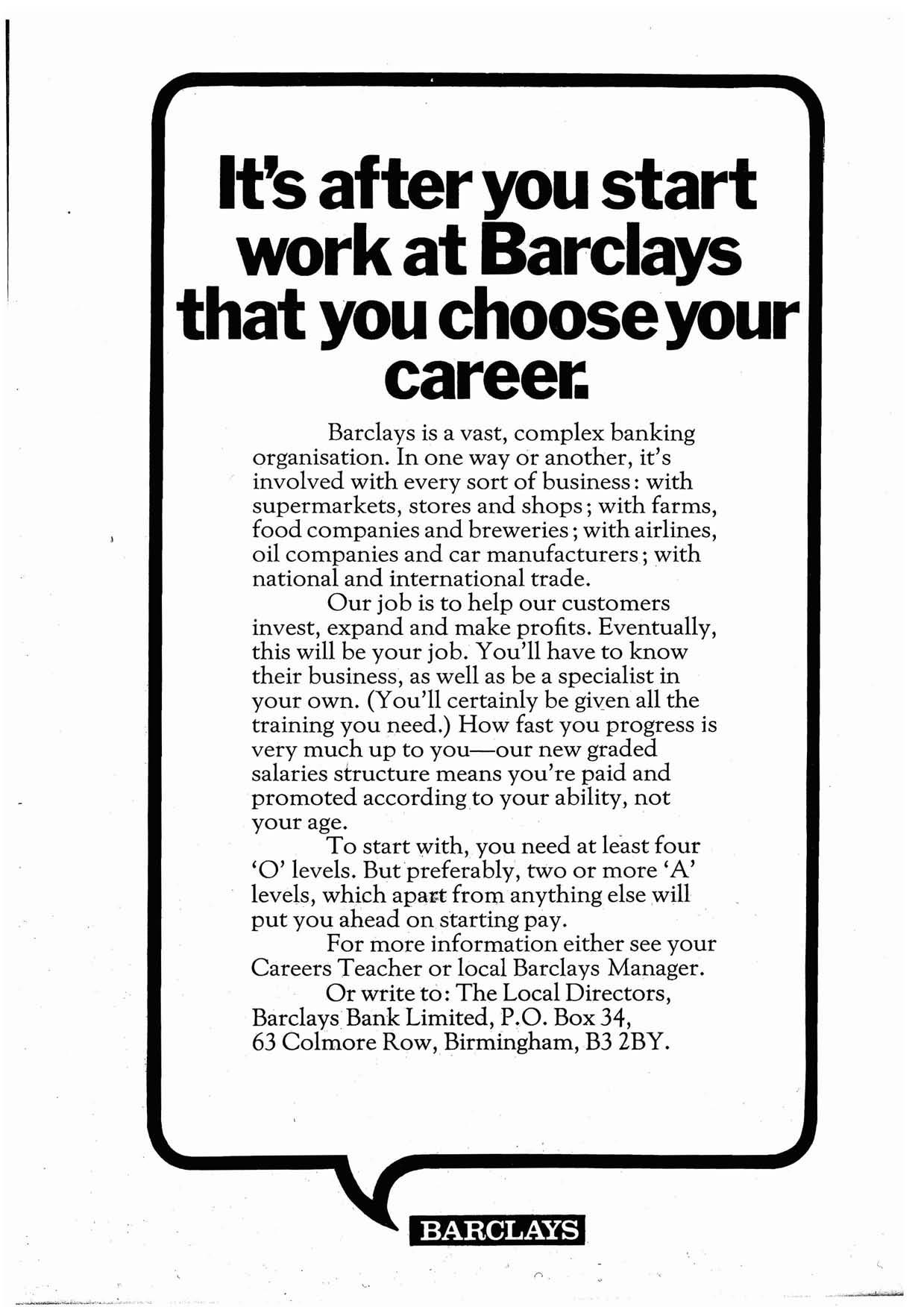
Barclays is a vast, complex banking organisation. In one way or another, it's involved with every sort of business: with supermarkets, stores and shops; with farms, food companies and breweries; with airlines, oil companies and car manufacturers; with national and international trade. Our job is to help our customers invest, expand and make profits. Eventually, this will be your job. You'll have to know their business, as well as be a specialist in your own. (You'll certainly be all the training you need.) How fast you progress is very much up to you-our new graded salaries structure means you're paid and promoted according to your ability, not your age.
To start with, you need at least four '0' levels. Butpreferably, two or more 'A' levels, which apat?t from anything else .will put you ahead on starting pay. . For more information either see your Careers Teacher or local Barclays Manager. Or write to: The Local Directors, Barclays Bank Limited, P Box 34, 63 Colmore Row,.Birmingham,B3 2BY.

acceptable subjects including English language and maths
on an RAF
Scholarship worth up to £385 a year

a valuable asset
reading for reading for a degree a degree on a County on a cadetship worth grant £1059 a year
If you are interested - in flying, engineering, logistics or administration - now is the time to do something about it. Your careers master has full information and, if you like, he can .arrange for you to meet your RAF Schools Liaison Officer; this is
quite informal, and an excellent. way to find out more about the RAF. Two more ideas: Write to Group Captain E. Batchelar, RAF, Adastral House (2SZDI), London WCIX 8RU, giving your date of birth and details of your present and expected educational qualifications; or pick up S01l).e leaflets at the nearest RAF Careers Information Officeaddress in phone book.

a iob.1 was looking for a career:
v
Mike Stephenson joined, U$ straight from school at eighteen, after A-levels;
"I wanted a job that would give me plenty of opportunity to make a career", he explains, "Banking fitted the bill, and as the Midland offered good prospects, I joined them.
"I did a spell as a junior iii'Leeds, learning the ropes of the banking business-about months.
"From there I did various jobs around the branch: standing orders clerk, securities work, that sort of thing.
"But my big chance came when I was transferred to London on Special Grade. That was in October '69, I joined Stock Exchange branch as a Loan Applications Officer.
"In February last year I was seconded to the Toronto Dominion Bank and wentto work,for them. In Toronto-that was great."
Now, at 24, Mike's back at Stock Exchange BraIich, with a difference. He's in an executive position. -,
"What do I like abQut my job? Oh, it's challenging, it's responsible, ap.d financially it's rewarding too."
Mike Stephenson has talked to you.
Why not find oUt more about us ?
Write to: The District Staff Supt., Midland Bank Ltd., 15 George Street, Oxford, OXl 2AU.

EDITORS c gray
a wynne
p mahony
DESIGN a wynne
d g la z eb roo k
sheath
A·RT WORK d glazebrook
n spence sturner
PHOTOS i parkin, BUSI NESS e burkill
p hutc hins on
m curie
